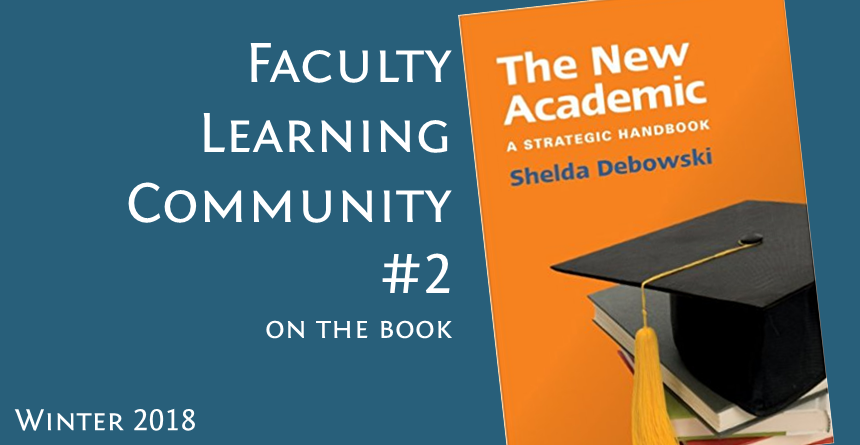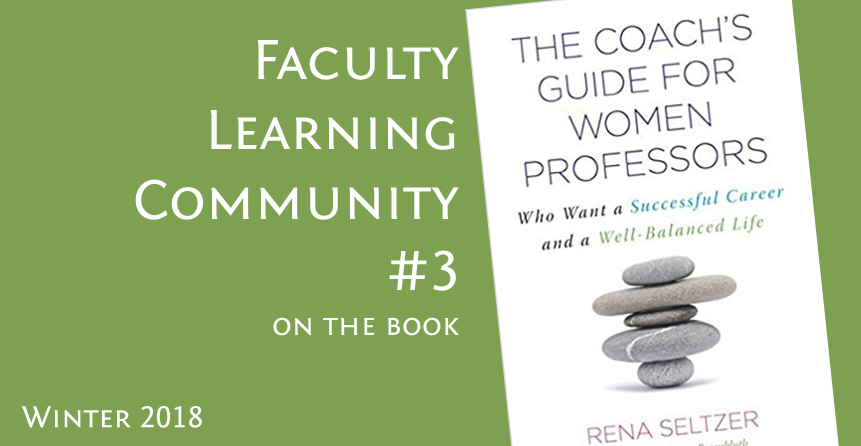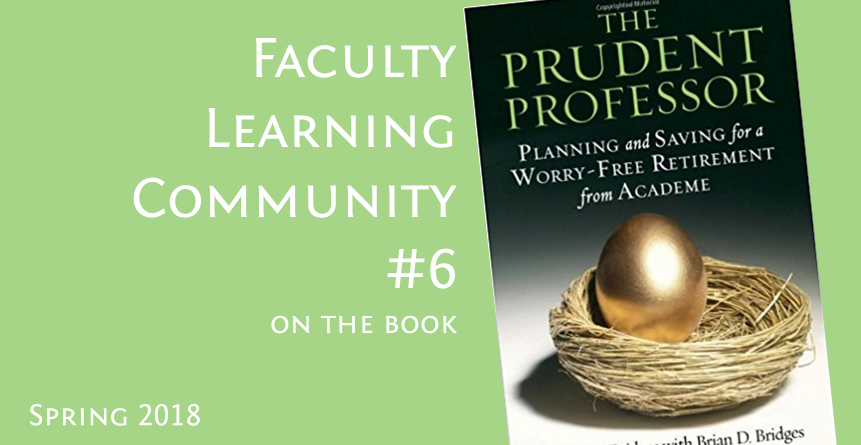
Professional development event archive
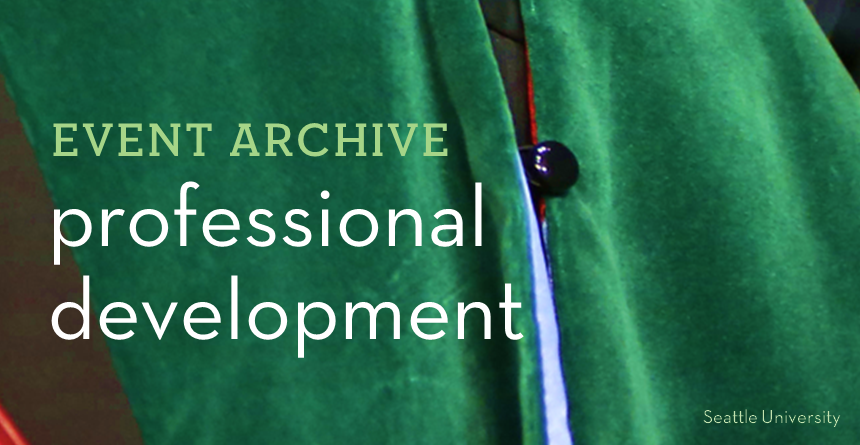
Below you will find an archive of our past events and programs on professional development topics, listed in reverse chronological order. The Center for Faculty Development staff are able to consult with Seattle University faculty on any of these topics, and many other professional development topics, as well.
Click the red plus below the year in order to view that year's list of events.
2023–24
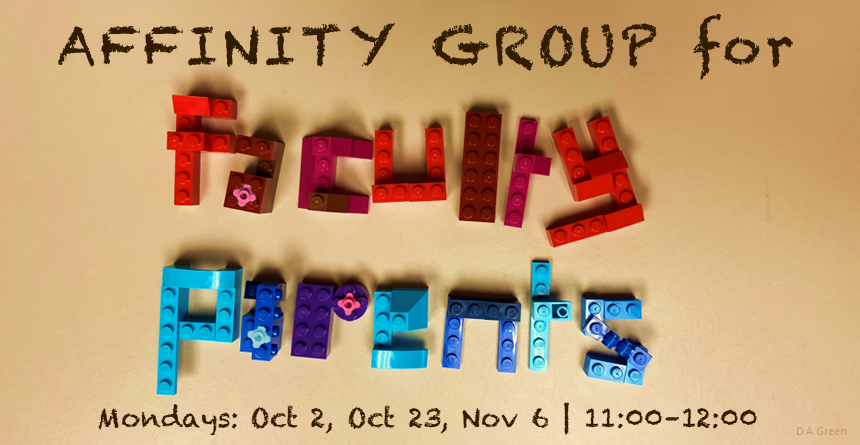
-
23FQ Affinity group for faculty parents - details
-
Affinity group
Mondays: Oct 2, Oct 23, and Nov 6 | 11:00–12:00 | Via Zoom (with the final gathering in-person) | Zoom link provided upon registration
Facilitated by Brooke Gialopsos (Criminal Justice)
The Center for Faculty Development will be offering an affinity group for faculty parents of school-age children. The purpose of this group is to provide a space to discuss and explore the unique challenges faced by faculty who have children in their care. The challenge of parenting while maintaining a rigorous schedule of teaching, research, and/or service to the university is not new. However, for many, the benefits of finding a community of support around parenting has never been more urgent. We faced unprecedented demands of caregiving and schooling while balancing the work of our academic lives during the Covid-19 pandemic. The return to in-person work for ourselves and in-person school for our children has offered sources of consolation and desolation over the past year or so. Let’s convene and share where we are during this time and find ways to support one another.
Why an affinity group?
The psychological benefits of convening groups of people around common identities and experiences are well known. Research on affinity groups, in particular, has shown that they enhance agency and optimism, while also providing access to beneficial information and support.
Aims of the group
At its most basic level, we hope that this group offers a space where you can feel less isolated in your experience. We hope to foster a community of support amongst faculty parents, where they can share experiences, offer suggestions, and explore how to navigate these extremely challenging times.
*Note: if you are interested in this group but cannot make the time scheduled, please email faculty-development@seattleu.edu and let us know. We would like to support all faculty parents during this challenging time and will work with you to find ways to offer support.
» Register
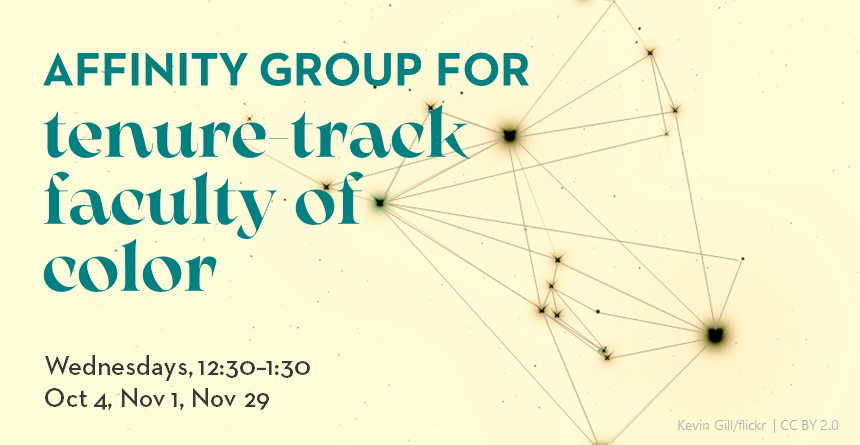
-
23FQ Affinity group for TT faculty of color - details
-
Affinity group
Wednesdays: Oct 4, Nov 1, and Nov 29 | 12:30–1:30 | In person | Loyola 501B | Tea and coffee provided; Bring your own lunch
Co-sponsored by the Office of Diversity and Inclusion
Facilitated by Colette Hoption
The Center for Faculty Development and the Office of Diversity and Inclusion are excited to announce the continuation of an affinity group for tenure-track faculty of color. The purpose of convening the group is to provide a space for the collective exploration of the impact of race, power, and privilege on the academic life of colleagues immersed in teaching, scholarship, and service at pre-tenure stages of their careers.
Why create a group for tenure-track faculty of color?
There are three primary reasons. First, the Task Force on Diversity and Inclusive Excellence report recommends boosting our capacity to retain talented minoritized faculty and facilitate professional development opportunities. Second, research on affinity groups indicates they enhance participants’ agency and optimism, while providing access to beneficial information and support. Third, from our own conversations with members of the Seattle University community, we know that faculty of color need a space where they can discuss their unique experiences in a supportive environment with peers who are similarly situated.
This professional development opportunity aims to empower tenure-track faculty of color to build community, share experiences, and pursue their academic life with more confidence and agency. We hope that this caucus process gives participants the space to determine “what solidarity could look like for...as people of color committed to the work of social, racial, and gender justice” (Kad Smith, Compass Point) at Seattle University.
» Register
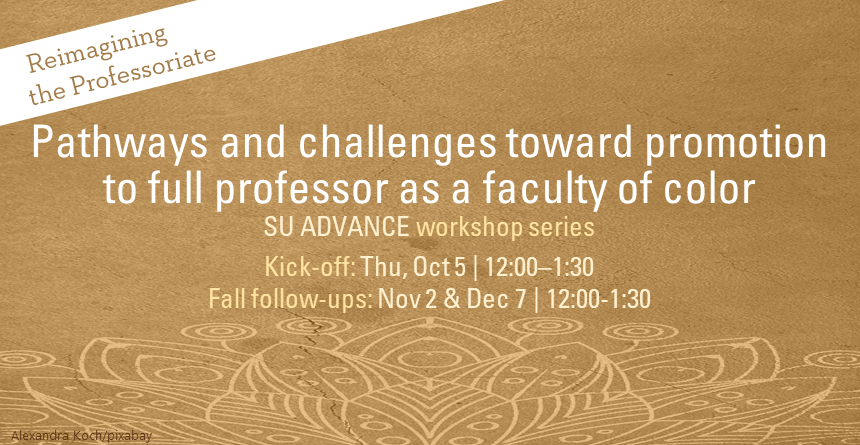
-
23FQ Pathways & challenges toward promotion as a FOC - details
-
Workshop series
Pathways and challenges toward promotion to Full Professor as a faculty of color
Fall Quarter kickoff event: Thu, Oct 5 | 12:00–1:30 | Via Zoom | Zoom link provided upon registration
Fall Quarter workshops: Thursdays, Nov 2 & Dec 7 | 12:00–1:30 | Via Zoom | Zoom link provided upon registration
Co-sponsored by the SU ADVANCE Program and the Center for Faculty Development
Facilitated by Angelique Davis, professor in the department of Political Science, an SU ADVANCE Fellow, and an NCFDD-trained Faculty Coach (National Center for Faculty Development & Diversity)
SU ADVANCE will host this 4-part workshop series in the 2023–24 academic year to discuss and provide support for the unique challenges and the opportunities experienced by faculty of color who are associate professor in rank.
This series of workshops is designed to support faculty of color seeking promotion to full professor in 2024–25.
Winter and Spring workshop dates
Winter Quarter: Thursdays, Jan 25 & Mar 7 | 12:00–1:30 | Via Zoom | Zoom link provided upon registration
Spring Quarter: Thursdays, Apr 4 & May 2 | 12:00–1:30 | Via Zoom | Zoom link provided upon registration
» Register
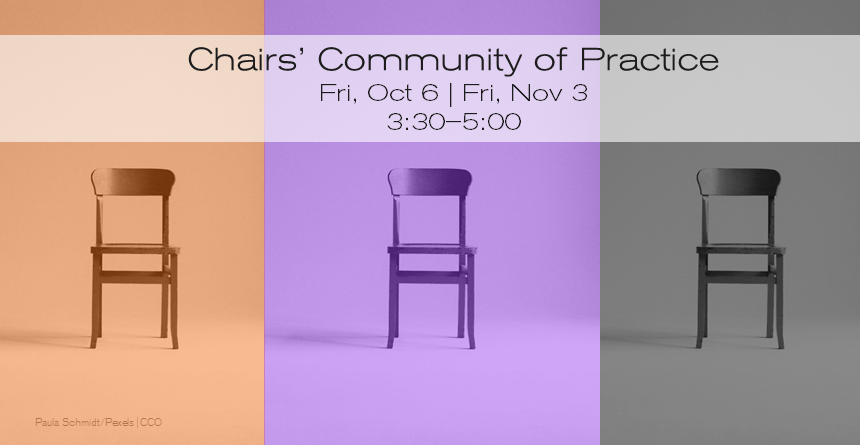
-
23FQ Chairs CoP - details
-
The Chairs' Community of Practice is open to all current department chairs and chairs-elect, plus program directors and directors-elect who have faculty reporting to them directly (for example for performance reviews).
We gather twice per quarter.
Further details and how to register are available on the Community of Practice page here.
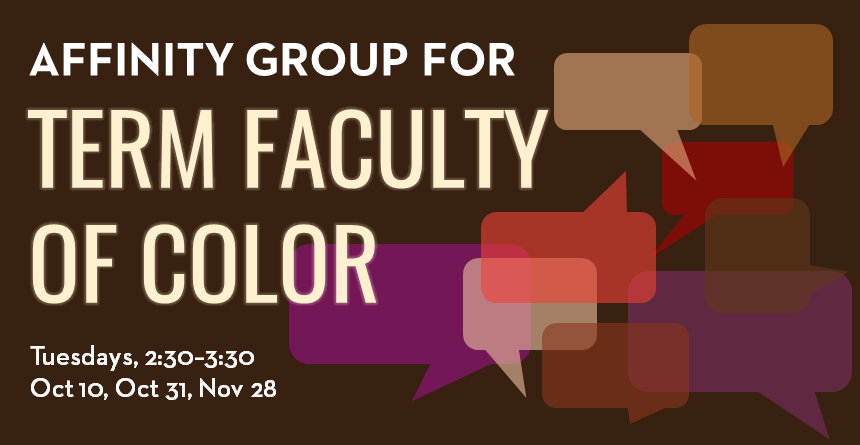
-
23FQ Affinity group for Term FOC - details
-
Affinity group
Tuesdays: Oct 10, Oct 31, and Nov 28 | 2:30–3:30 | Via Zoom | Zoom link provided upon registration
Co-sponsored by the Office of Diversity and Inclusion
Facilitated by Andrea Verdan
The Center for Faculty Development and the Office of Diversity and Inclusion are excited to announce the launch of an affinity group for term faculty of color. The group is open to both full-time and part-time term faculty of color.
Aims of the group
In this space, participants will aim to support one another in:
- sharing experiences to increase community and belonging across campus,
- exploring the impact of race, power, and privilege on our various facets of work, at all stages of our careers, and
- pursuing our work and personal lives with more balance, confidence, and agency.
Why create a group for term faculty of color?
The university’s goal to Promote Inclusive Excellence (RSD Goal 4) calls for initiatives to support diverse faculty to develop and thrive at Seattle U. Having piloted a format with tenure-track faculty, we are now ready to launch a parallel group for term faculty, whose intersecting identities are minoritized both socially (as a person of color) and professionally (as a non-tenure-track faculty member).
This affinity group aims to foster an equitable faculty culture and structure where all members of the community thrive and experience fulfilling work. Additionally, research on affinity groups shows that they enhance participants’ agency and optimism, while providing access to beneficial information and support. Finally, from our own conversations with members of the SU community, we know that term faculty with marginalized identities need a space where they can discuss their unique experiences in a supportive environment with peers who are similarly situated.
» Register
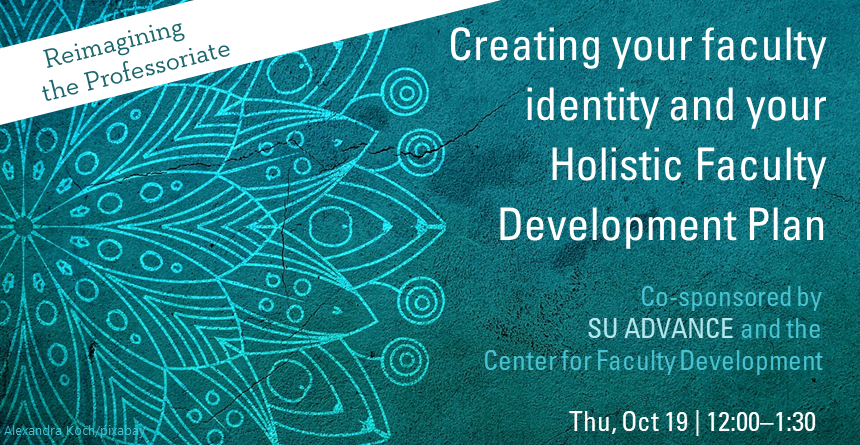
-
23FQ Faculty identity & your HFDP - details
-
SU ADVANCE Workshop
Creating your faculty identity and your Holistic Faculty Development Plan
Thu, Oct 19 | 12:00–1:30 | Via Zoom | Zoom link provided upon registration
Co-sponsored by the SU ADVANCE Program and the Center for Faculty Development
Co-facilitated by SU ADVANCE Fellows: Jodi O'Brien (Principal Investigator, ADVANCE grant; Interim Associate Provost), Colette Taylor (Special Assistant to the Provost for Strategic Directions), Eva Sedgwick (Marketing), and Jenny Loertscher (Chemistry)
Faculty members often struggle to decide on career paths, and with balancing their identities as teacher-scholars; research on identity formation has identified three significant influences: context, roles, and agency. Identity influences career decisions and, in turn, affects engagement in various activities encouraged by Seattle University.
We have designed this single-session workshop to foster teacher-scholar identity formation by using the Holistic Faculty Development Plan (HFDP). Faculty seeking promotion have to produce a multi-year HFPD as part of their evidence of a thoughtful, integrated promotion file. You may ask yourself, “What is an HFDP?” and “How should I begin writing one?”
We realize that many of you already approach your professional trajectory in an integrated manner, even if you haven’t explicitly stated it previously; now, you need to articulate this integration systematically in writing your HFDP.
This session will also help orient those faculty whose trajectory doesn’t yet feel integrated and are wondering how best to start.
» Register
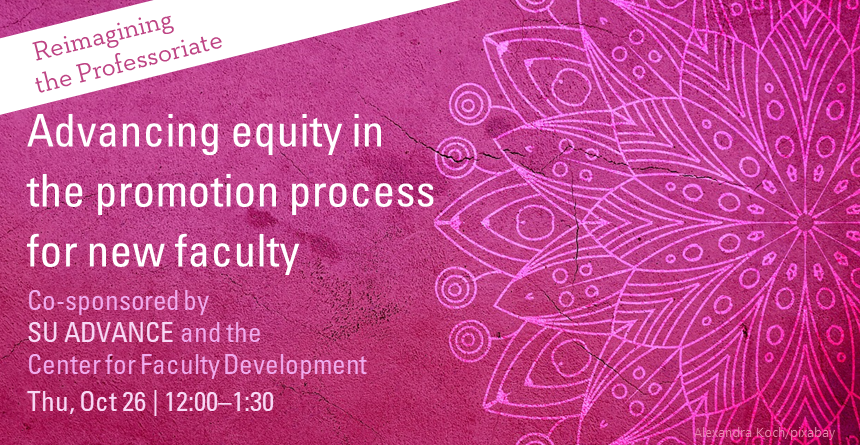
-
23FQ Equity in promotion process for new faculty - details
-
SU ADVANCE Workshop
Advancing equity in the promotion process for new faculty
Thu, Oct 26 | 12:00–1:30 | Via Zoom | Zoom link provided upon registration
Co-sponsored by the SU ADVANCE Program and the Center for Faculty Development
Co-facilitated by SU ADVANCE Fellows: Jodi O'Brien (Principal Investigator, ADVANCE grant; Interim Associate Provost), Colette Taylor (Special Assistant to the Provost for Strategic Directions), Eva Sedgwick (Marketing), and Jenny Loertscher (Chemistry)
This session presents an opportunity to hold a unique and valuable conversation on diversity, equity, inclusion, and sense of belonging; it has the potential to impact not only new faculty in the SU working environment, but also their students and colleagues. In this workshop, ADVANCE Fellows will present research on challenges related to faculty diversity and equity nationally and locally at SU; we will present data on patterns of inequity in academia and explore tools and approaches we can use at SU to improve the environment for professional success and advancement.
The workshop will include small group discussions and will focus on specific issues related to Teaching, Scholarship, and University Service and Institution Building.
» Register
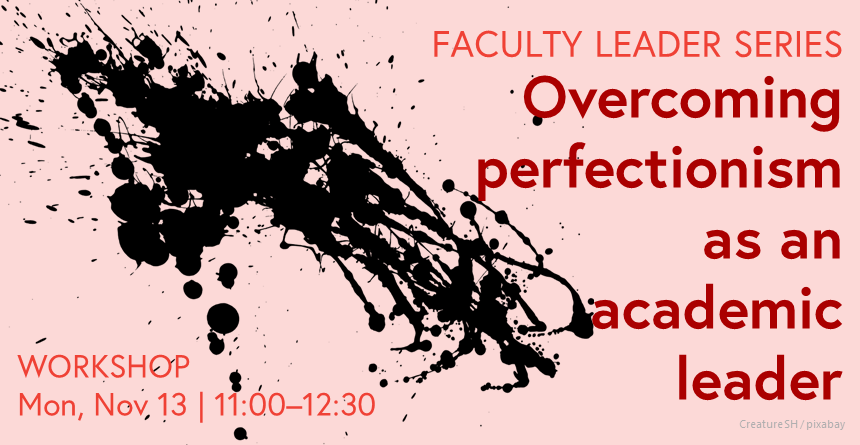
-
23FQ FLS Overcoming perfectionism as an academic leader - details
-
Faculty Leader Series Workshop
Overcoming perfectionism as an academic leader
Mon, Nov 13 | 11:00-12:30 | In person | Casey Commons (CASY 530) | Coffee, tea, and snacks provided
Facilitated by Colette Hoption
Having survived the higher education system at its most exacting level, many faculty have imbibed the idea that perfectionism is both normal and necessary. In light of this, we invite you to answer the following questions about yourself:
- Do I feel pressure to be the best in all of my duties?
- Do I find it easier to find examples of mistakes than examples of successes?
- Do I feel like criticisms about my department or college are a personal attack?
- Do I hesitate to share my departmental practices until they are a “proven success”?
- Do thoughts about work keep me up at night?
These questions poke at common indicators of perfectionism in academia. They may also be especially relevant to academic leaders whose roles have greater visibility because of their critical impact on others’ work lives, including class scheduling, service assignments, APRs, tenure and promotion recommendation letters, and hiring decisions.
While there is value in striving for excellence (e.g., getting a sense of achievement), excessive perfectionism provokes self-defeating thoughts (e.g., “I am not good enough”), establishes unrealistic goals, and stalls progress in your work, just to name a few consequences.
In this session, we’ll watch segments from an NCFDD webinar entitled, “Overcoming Academic Perfectionism,” and throughout, we will pause for questions, reflections, and exercises to situate the information for chairs and program directors. In the end, you will gain knowledge of, and practice with strategies for identifying and responding to excessive perfectionism.
» Register
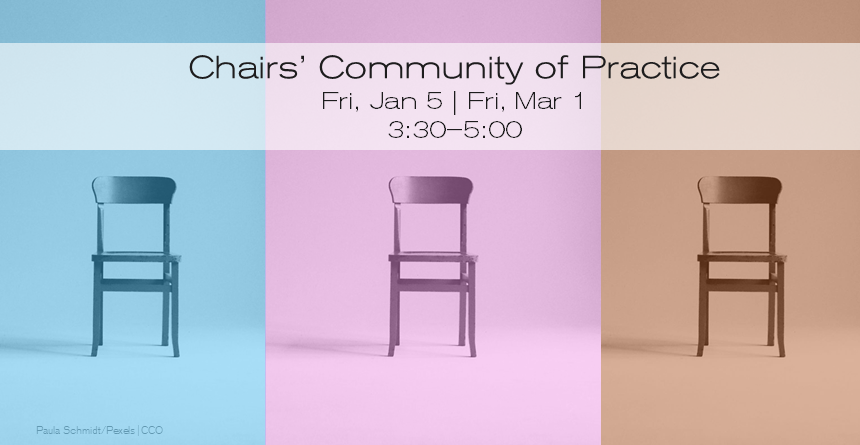
-
24WQ Chairs CoP - details
-
The Chairs' Community of Practice is open to all current department chairs and chairs-elect, plus program directors and directors-elect.
We gather twice per quarter.
Further details and how to register are available on the Community of Practice page here.
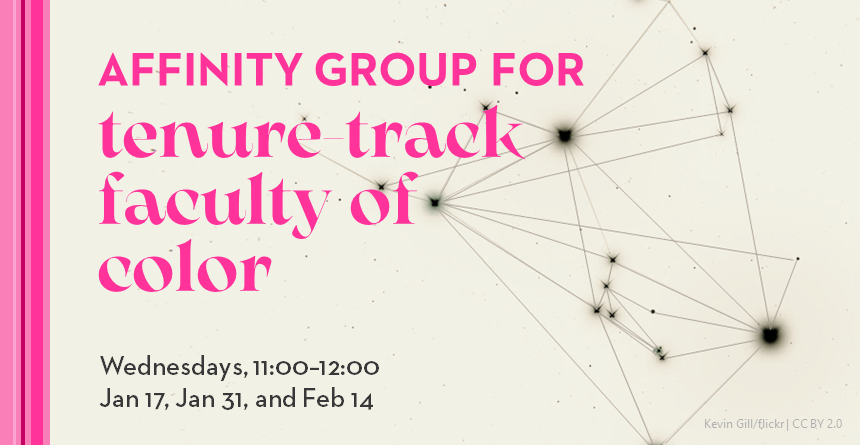
-
24WQ Affinity group for TT faculty of color - details
-
Affinity group
Wednesdays: Jan 17, Jan 31, and Feb 14 | 11:00–12:00 | In person | Wismer Center (LOYA 200) | Tea and coffee provided
Co-sponsored by the Office of Diversity and Inclusion
Facilitated by Colette Hoption
The Center for Faculty Development and the Office of Diversity and Inclusion are excited to announce the continuation of an affinity group for tenure-track faculty of color. The purpose of convening the group is to provide a space for the collective exploration of the impact of race, power, and privilege on the academic life of colleagues immersed in teaching, scholarship, and service at pre-tenure stages of their careers.
Why create a group for tenure-track faculty of color?
There are three primary reasons. First, the Task Force on Diversity and Inclusive Excellence report recommends boosting our capacity to retain talented minoritized faculty and facilitate professional development opportunities. Second, research on affinity groups indicates they enhance participants’ agency and optimism, while providing access to beneficial information and support. Third, from our own conversations with members of the Seattle University community, we know that faculty of color need a space where they can discuss their unique experiences in a supportive environment with peers who are similarly situated.
This professional development opportunity aims to empower tenure-track faculty of color to build community, share experiences, and pursue their academic life with more confidence and agency. We hope that this caucus process gives participants the space to determine “what solidarity could look like for...as people of color committed to the work of social, racial, and gender justice” (Kad Smith, Compass Point) at Seattle University.
» Register
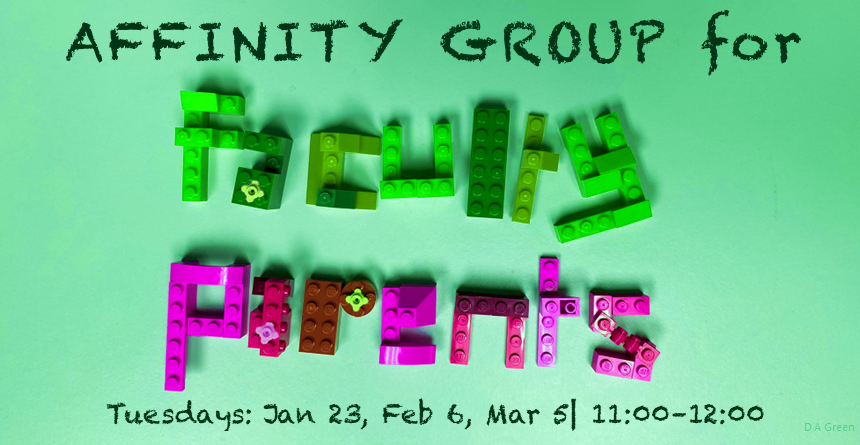
-
24WQ Affinity group for faculty parents - details
-
Affinity group
Tuesdays: Jan 23, Feb 6, and Mar 5 | 11:00–12:00 | Via Zoom (with the final gathering in-person) | Zoom link provided upon registration
Facilitated by Brooke Gialopsos (Criminal Justice)
The Center for Faculty Development will be offering an affinity group for faculty parents of school-age children. The purpose of this group is to provide a space to discuss and explore the unique challenges faced by faculty who have children in their care. The challenge of parenting while maintaining a rigorous schedule of teaching, research, and/or service to the university is not new. However, for many, the benefits of finding a community of support around parenting has never been more urgent. We faced unprecedented demands of caregiving and schooling while balancing the work of our academic lives during the Covid-19 pandemic. The return to in-person work for ourselves and in-person school for our children has offered sources of consolation and desolation over the past year or so. Let’s convene and share where we are during this time and find ways to support one another.
Why an affinity group?
The psychological benefits of convening groups of people around common identities and experiences are well known. Research on affinity groups, in particular, has shown that they enhance agency and optimism, while also providing access to beneficial information and support.
Aims of the group
At its most basic level, we hope that this group offers a space where you can feel less isolated in your experience. We hope to foster a community of support amongst faculty parents, where they can share experiences, offer suggestions, and explore how to navigate these extremely challenging times.
*Note: if you are interested in this group but cannot make the time scheduled, please email faculty-development@seattleu.edu and let us know. We would like to support all faculty parents during this challenging time and will work with you to find ways to offer support.
» Register
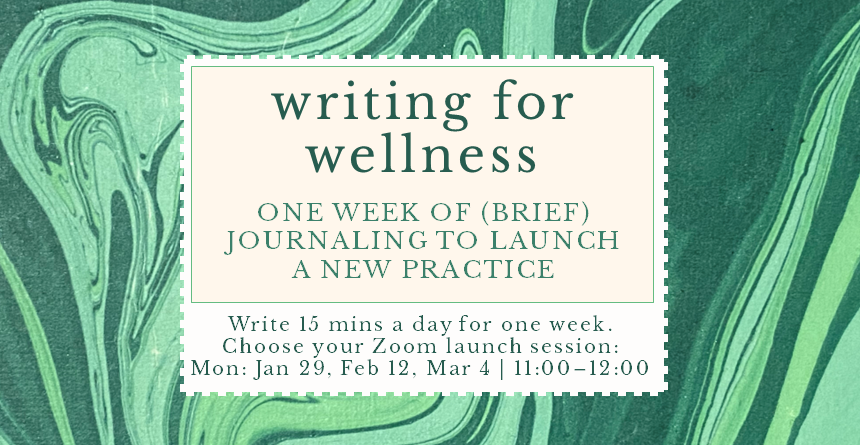
-
24WQ Writing for Wellness - details
-
Online Workshop
Writing for Wellness: One week of (brief) journaling to launch a new practice
Launch sessions on Mondays: Jan 29, Feb 12, Mar 4 | 11:00–12:00 | Via Zoom | Zoom link provided upon registration
Facilitated by Colette Hoption
The benefits of journaling have been documented in a variety of contexts including on college campuses, and in hospitals and workplaces. They include:
- decreased anxiety,
- increased awareness,
- increased self-compassion, and
- increased prosocial behavior.
Especially against the backdrop of the COVID-19 pandemic, we are reminded about the importance of accessible, convenient, and sustainable practices that promote our health and well-being.
This timely workshop – run three times over Winter Quarter – presents you with an opportunity to practice daily journaling for one work week. From this experience, you will discover whether and how an established routine for self-care during your workday can help you thrive in and outside of Seattle University.
What will we do?
We will kick off this workshop with a one-hour Zoom meeting to get to know each other; get acquainted with our Microsoft Teams community; and allot time for you to compose your first journal entry.
Thereafter, via Microsoft Teams, you will receive journal prompts for the rest of the work week, and regular communication from a peer to encourage your practice.
All journal entries are solely for your own self-reflection and viewing.
What is the (time) commitment?
The goal is to journal for at least 15 minutes a day for one work week. You can choose to keep a physical journal or an electronic one. For the duration of this workshop, you will use Microsoft Teams to view the day’s journal prompt, and check-in with a peer.
After journaling consistently for one work week, we hope you’ll be closer to maintaining a practice for daily wellness.
How many opportunities are there to try out this practice?
We will run this workshop three times in Winter Quarter 2024. Each run welcomes a new cohort of participants.
However, you can register for all three launch events, and rest assured that you will receive new journaling prompts each time because none of them will be repeated throughout the quarter.
Who is this workshop for?
This workshop is ideal for faculty who:
- Desire a gentle introduction to a wellness strategy.
- Benefit from a community to hold them accountable to their goals.
- Need dedicated time for fostering mental wellness.
» Register
Interested in learning more about journaling?
Cheng, S.-T., Tsui, P. K., & Lam, J. H. M. (2015). Improving mental health in health care practitioners: Randomized controlled trial of a gratitude intervention. Journal of Consulting and Clinical Psychology, 83, 177–186.
Hiemstra, R. (2001). Uses and benefits of journal writing. New Directions for Adult and Continuing Education, 90, 19–26.
Locklear, L. R., Taylor, S. G., & Ambrose, M. L. (2021). How a gratitude intervention influences workplace mistreatment: A multiple mediation model. Journal of Applied Psychology, 106, 1314–1331.
Taylor, S. B., Kennedy, L. A., Lee, C. E., & Waller, E. K. (2022). Common humanity in the classroom: Increasing self-compassion and coping self-efficacy through a mindfulness-based intervention. Journal of American College Health, 70, 142–149.
Ulrich, P. M. & Lutgendorf, S. K. (2002). Journaling about stressful events: Effects of cognitive processing and emotional expression. Annals of Behavioral Medicine, 24, 244–250.
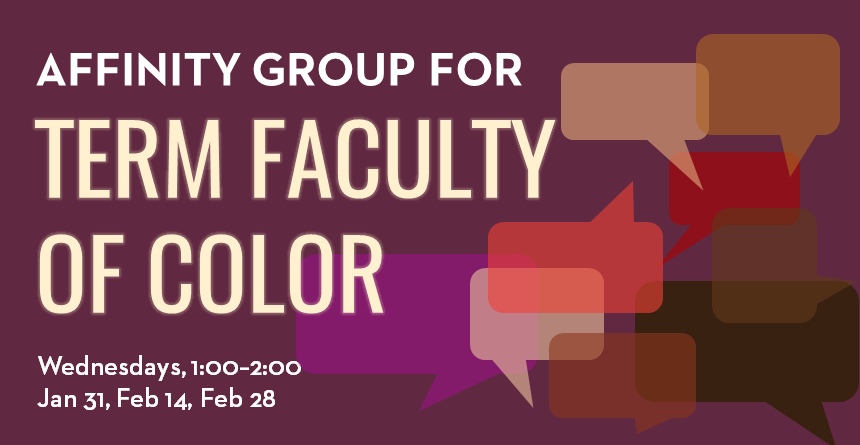
-
24WQ Affinity group for term faculty of color - details
-
Affinity group
Wednesdays: Jan 31, Feb 14, and Feb 28 | 1:00–2:00 | Via Zoom | Zoom link provided upon registration
Co-sponsored by the Office of Diversity and Inclusion
Facilitated by Andrea Verdan
The Center for Faculty Development and the Office of Diversity and Inclusion are excited to offer an affinity group for term faculty of color. The group is open to both full-time and part-time term faculty of color.
Aims of the group
In this space, participants will aim to support one another in:
- sharing experiences to increase community and belonging across campus,
- exploring the impact of race, power, and privilege on our various facets of work, at all stages of our careers, and
- pursuing our work and personal lives with more balance, confidence, and agency.
Why create a group for term faculty of color?
The university’s goal to Promote Inclusive Excellence (RSD Goals 4) calls for initiatives to support diverse faculty to develop and thrive at Seattle U. This includes term faculty of color, whose intersecting identities are minoritized both socially (as a person of color) and professionally (as a non-tenure-track faculty member).
This affinity group aims to foster an equitable faculty culture and structure where all members of the community thrive and experience fulfilling work. Additionally, research on affinity groups shows that they enhance participants’ agency and optimism, while providing access to beneficial information and support. Finally, from our own conversations with members of the SU community, we know that term faculty with marginalized identities need a space where they can discuss their unique experiences in a supportive environment with peers who are similarly situated.
» Register
SU ADVANCE Sessions:
-
24WQ Pathways & challenges toward promotion as a FOC - details
-
Workshop series
Pathways and challenges toward promotion to Full Professor as a faculty of color
Winter Quarter workshops: Wednesdays, Feb 7 & Mar 6 | 12:00–1:30 | Via Zoom | Zoom link provided upon registration
Co-sponsored by the SU ADVANCE Program and the Center for Faculty Development
Facilitated by Angelique Davis, professor in the department of Political Science, an SU ADVANCE Fellow, and an NCFDD-trained Faculty Coach (National Center for Faculty Development & Diversity)
SU ADVANCE will host this 4-part workshop series in the 2023–24 academic year to discuss and provide support for the unique challenges and the opportunities experienced by faculty of color who are associate professor in rank.
This series of workshops is designed to support faculty of color seeking promotion to full professor in 2024–25.
Spring workshop dates
Spring Quarter: Thursdays, Apr 4 & May 2 | 12:00–1:30 | Via Zoom | Zoom link provided upon registration
» Register
-
24WQ Info session for faculty applying to full professor - details
-
Q&A Session
Informational session for faculty applying for promotion to full professor in 2024–25
Thu, Jan 25 | 12:00–1:30 | Via Zoom | Zoom link provided upon registration
Co-sponsored by the SU ADVANCE Program and the Center for Faculty Development
Co-facilitated by SU ADVANCE Fellows
If you are planning to apply for promotion to Professor in 2024–25, this informational Zoom session is specifically for you!
Facilitated by members of the SU ADVANCE team, the session includes a review of the process from departmental, collegiate, and central administration perspectives; it also offers important information for preparing your promotion dossier.
A separate writing workshop will help you make progress on your dossier.
» Register
-
24WQ Community-Engaged Scholarship - details
-
SU ADVANCE Lunch and Learn
Community-Engaged Scholarship
Wed, Jan 31 | 12:00–1:30 | In person | Student Center 130 | Lunch provided
Co-sponsored by the SU ADVANCE Program and the Center for Faculty Development
Co-facilitated by Colette Taylor (Professor & Special Assistant to the Provost for Strategic Directions) and Geneva Sedgwick (Professor & SU ADVANCE Fellow)
Come and join us for our Lunch and Learn Series, where SU ADVANCE Fellows will share how they incorporate Community-Engaged Scholarship into their academic work.
In this session, you will hear from James Miles (Performing Arts) and Natalie Welch (Sports Management), who will talk about their collaboration with their community partners. In addition, we will hear from Dr. Shaun Glaze, the Chief Consulting Officer of Inclusive Data LLC, a community partner with the SU Center for Social Transformation and Leadership.
They will explore how community and academic perspectives shaped their community-engaged scholarship, how their work led to concrete outcomes and impacts, and what challenges and opportunities they encountered along the way.
This session also aims to inspire you to develop your own community-based research and engagement skills and to reflect critically on the principles and practices of community-engaged scholarship.
» Register
-
24WQ Writing workshop for faculty applying to full professor - details
-
Online Workshop
Writing workshop for faculty applying for promotion to full professor in 2024–25
Thu, Mar 7 | 12:00–1:30 | Via Zoom | Zoom link provided upon registration
Co-sponsored by the SU ADVANCE Program and the Center for Faculty Development
Co-facilitated by SU ADVANCE Fellows
For those of you planning to apply for promotion in the next year (i.e., submitting your promotion file in Fall 2024), this online workshop offers support and opportunities for writing and reflection.
Faculty seeking promotion at this time need to produce evidence of a thoughtful, integrated promotion file. Accordingly, this workshop will focus on writing a Holistic Faculty Development Statement as a core of your application.
An updated submission "requirements" guide to help faculty who are engaged in writing their tenure and promotion statements is provided in the Rank and Tenure preparation guidelines document on the Academic Affairs Policy and Procedures webpage.
This submission guide is a companion document to the university's revised promotion guidelines.
» Register
2022–23
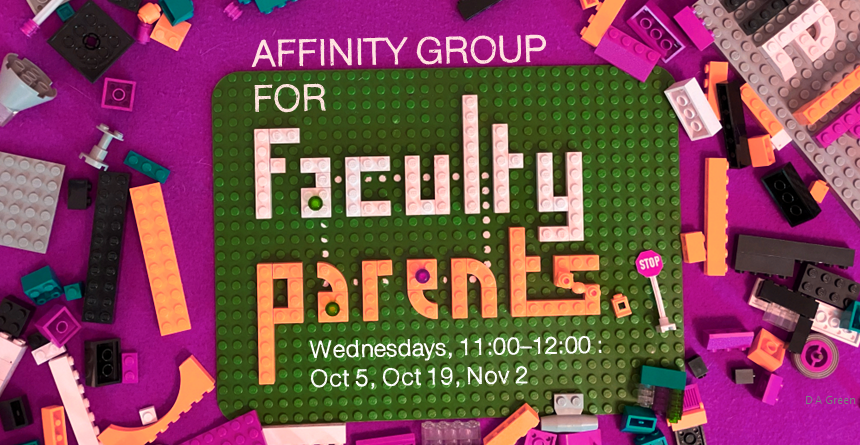
-
22FQ Affinity group for faculty parents - details
-
Affinity group
Wednesdays: Oct 5, Oct 19, and Nov 2 | 11:00–12:00 | Via Zoom | Zoom link provided upon registration
Facilitated by Katherine Raichle
The Center for Faculty Development offers an affinity group for faculty parents whose children are school-aged or younger. The purpose of this group is to provide a space to discuss and explore the unique challenges faced by faculty who have children in their care. Over the past couple years we have faced unprecedented demands and uncertainty during the COVID-19 pandemic. The return to in-person work this prior year and in-person school/pre-school/daycare for our children has surfaced sources of consolation and desolation. Let’s convene and share our experiences and how to balance the demands of parenting while maintaining our roles in the academy.
Why an affinity group?
The psychological benefits of convening groups of people around common identities and experiences are well known. Research on affinity groups has shown that they enhance agency and optimism, while also providing access to beneficial information and support.
Aims of the group
At its most basic level, we hope that this group offers a space where you can feel less isolated in your experiences. We hope to foster a community of support amongst faculty parents, where they can celebrate successes and offer suggestions about how to navigate challenges.
*Note: if you are interested in this group but cannot make the time scheduled, please email faculty-development@seattleu.edu and let us know. We would like to support all faculty parents during this challenging time and will work with you to find ways to offer support.
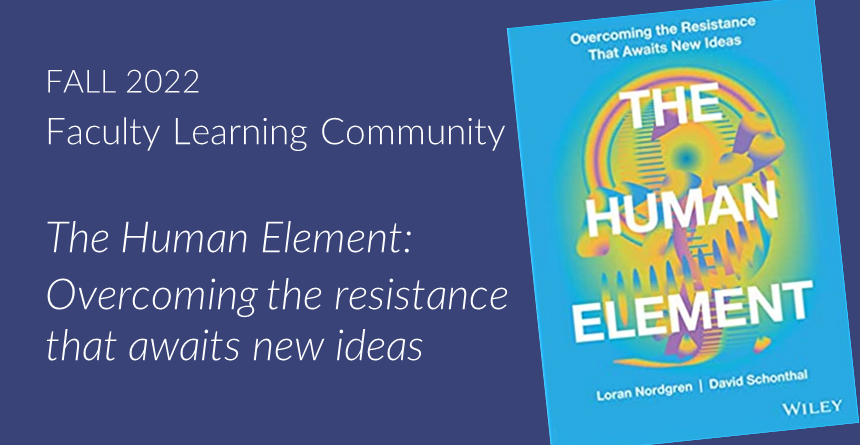
-
22FQ FLC The Human Element - details
-
Faculty Learning Community
The Human Element: Overcoming the resistance that awaits new ideas
Tuesdays: Oct 11, Oct 25, and Nov 8 | 1:30–2:45 | In person | HUNT 160 | Coffee and tea will be provided
Facilitated by David Green
Do you have a new idea or innovation you’d like to introduce at SU? Are you wondering how to bring your colleagues on board?
Common practice says that the best way to convince people to take up a new idea is to heighten the appeal of the idea itself. But what about the discomfort and hesitations that hold us back from changing?
In their book The Human Element: Overcoming the Resistance That Awaits New Ideas, authors Loren Nordgren and David Schonthal call the former approach “fuel-based” and label the latter “frictions.” They explore four important frictions (inertia, effort, emotion, and reactance) and introduce readers to corresponding strategies that will help their ideas shine.
In this three-session Learning Community, facilitated by David Green (Center for Faculty Development), we'll work our way through the chapters of the book, discussing where it resonates or aggravates, where it’s immediately applicable or requires some adjustment, and we’ll consider how it might aid our own attempts to bring colleagues on board with new ideas.
What can you expect?
Over the three sessions, you'll learn:
- Why ideas get rejected – despite their undeniable value.
- How frictions operate in a range of settings.
- How to transform those frictions into catalysts for change.
Who is it suited to?
If you’re involved in any change initiatives on campus – whether around curricular change, systemic change, or shared governance change – then the ideas in this book could help you feel more effective and enthusiastic in your work, as well as enabling your ideas to be championed more widely. This book is also well-suited to all faculty who are full of great ideas.
The Human Element is 210 pages long, and reading will be split across the three sessions to be manageable for participants.
What are the dates?
This learning community meets in Hunthausen 160 on:
- Tue, Oct 11 | 1:30–2:45
- Tue, Oct 25 | 1:30–2:45
- Tue, Nov 8 | 1:30–2:45
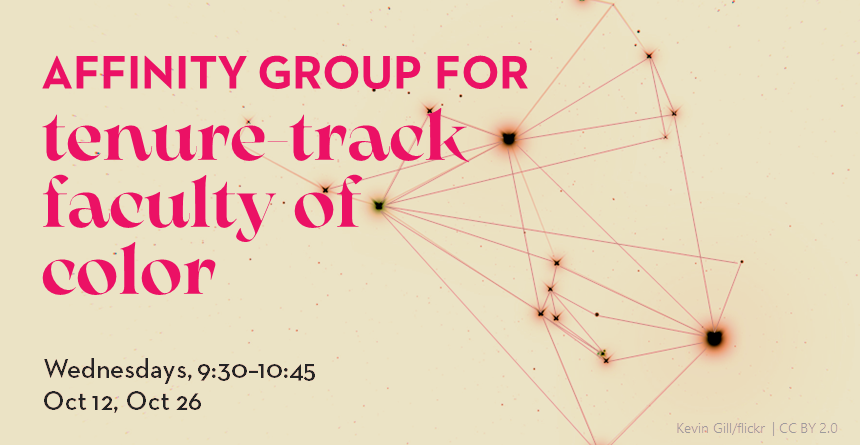
-
22FQ Affinity group for TT faculty of color - details
-
Affinity group
Wednesdays: Oct 12, Oct 26, and Nov 9 | 9:30–10:45 (Nov 9 session from 2:00–3:15) | Via Zoom | Zoom link provided upon registration
Co-sponsored by the Office of Diversity and Inclusion (ODI)
Facilitated by Colette Hoption
The Center for Faculty Development and the Office of Diversity and Inclusion are excited to announce the continuation of an affinity group for tenure-track faculty of color. The purpose of convening the group is to provide a space for the collective exploration of the impact of race, power, and privilege on the academic life of colleagues immersed in teaching, scholarship, and service at pre-tenure stages of their careers.
Why create a group for tenure-track faculty of color?
There are three primary reasons. First, the Task Force on Diversity and Inclusive Excellence report recommends boosting our capacity to retain talented minoritized faculty and facilitate professional development opportunities. Second, research on affinity groups indicates they enhance participants’ agency and optimism, while providing access to beneficial information and support. Third, from our own conversations with members of the Seattle University community, we know that faculty of color need a space where they can discuss their unique experiences in a supportive environment with peers who are similarly situated.
This professional development opportunity aims to empower tenure-track faculty of color to build community, share experiences, and pursue their academic life with more confidence and agency. We hope that this caucus process gives participants the space to determine “what solidarity could look like for...as people of color committed to the work of social, racial, and gender justice” (Kad Smith, Compass Point) at Seattle University.
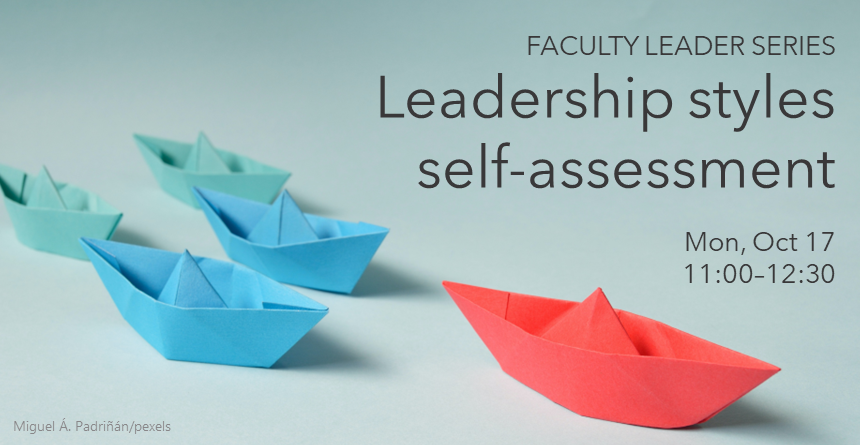
-
22FQ FLS: Leadership styles self-assessment - details
-
Faculty Leader Series Workshop
Leadership styles self-assessment
Mon, Oct 17 | 11:00–12:30 | In person | Oberto Commons (SINE 200) | Coffee, tea, and snacks will be provided
Facilitated by Colette Hoption
Leadership is a common topic for scholars to study but applying theories and frameworks to our academic context can be challenging. For example, in organizational studies, leaders are often selected based on their past work experience but in academe, department chairs may be chosen based on a rotational schedule.
As a result, techniques in one context might not be as effective in another; and even within the same context, one can find multiple ways to lead. Sifting through the literature independently can be a trying journey, and discerning what works for each of us requires dedicated time and intentional reflection. This workshop is designed to help you navigate those challenges.
In this session, key elements of leadership literature will be presented in organized chunks, with space for you to discuss the various perspectives with colleagues. You'll use some self-assessment tools to evaluate your present-day leadership style, and through hands-on activities, develop a vision for your future leadership.
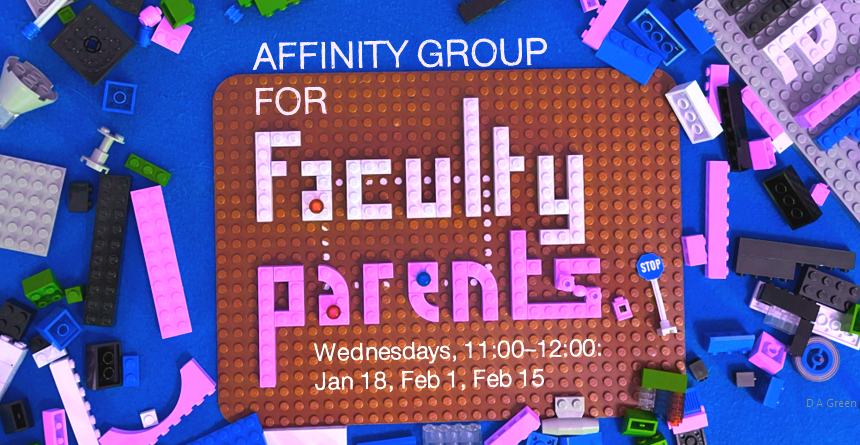
-
23WQ Affinity group for faculty parents - details
-
Affinity group
Wednesdays: Jan 18, Feb 1, and Feb 15 | 11:00–12:00 | Via Zoom (with the possibility of gathering in-person for the final session) | Zoom link provided upon registration
Facilitated by Katherine Raichle
The Center for Faculty Development will be offering an affinity group for faculty parents of school-age children. The purpose of this group is to provide a space to discuss and explore the unique challenges faced by faculty who have children in their care. The challenge of parenting while maintaining a rigorous schedule of teaching, research, and/or service to the university is not new. However, for many, the benefits of finding a community of support around parenting has never been more urgent. We faced unprecedented demands of caregiving and schooling while balancing the work of our academic lives during the Covid-19 pandemic. The return to in-person work for ourselves and in-person school for our children has offered sources of consolation and desolation over the past year or so. Let’s convene and share where we are during this time and find ways to support one another.
Why an affinity group?
The psychological benefits of convening groups of people around common identities and experiences are well known. Research on affinity groups, in particular, has shown that they enhance agency and optimism, while also providing access to beneficial information and support.
Aims of the group
At its most basic level, we hope that this group offers a space where you can feel less isolated in your experience. We hope to foster a community of support amongst faculty parents, where they can share experiences, offer suggestions, and explore how to navigate these extremely challenging times.
*Note: if you are interested in this group but cannot make the time scheduled, please email faculty-development@seattleu.edu and let us know. We would like to support all faculty parents during this challenging time and will work with you to find ways to offer support.
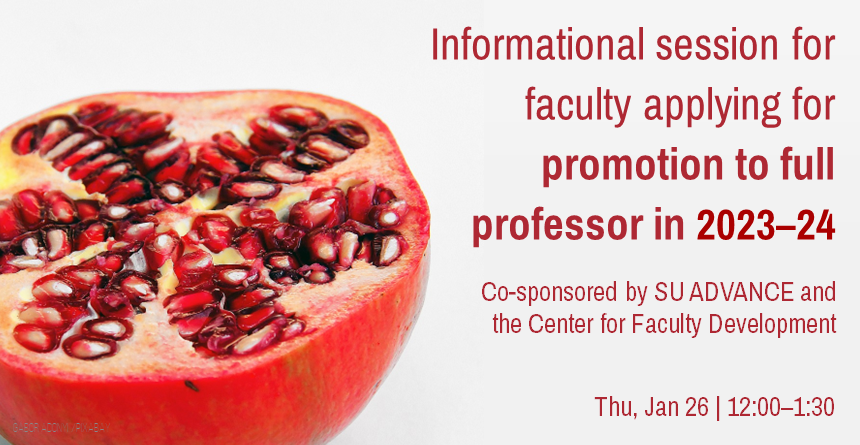
-
23WQ Info session for faculty applying to full professor - details
-
Q&A Session
Informational session for faculty applying for promotion to full professor in 2023–24
Thu, Jan 26 | 12:00–1:30 | Via Zoom | Zoom link provided upon registration
Co-sponsored by the SU ADVANCE Program and the Center for Faculty Development
Co-facilitated by Jodi O'Brien (Principal Investigator, ADVANCE grant; Interim Associate Provost) and Colette M. Taylor (Special Assistant to the Provost for Strategic Directions)
In June 2021, the SU Board of Trustees voted to formally adopt the SU ADVANCE proposed Revised Promotion Guidelines for Full Professor. SU ADVANCE and the Center for Faculty Development are hosting this workshop for Associate Professors planning to petition for Promotion to Full Professor in 2023–24. This Winter Quarter Zoom session includes a review of the process from the departmental, collegiate, and central administration perspectives and valuable information for preparing promotion dossiers. As a reminder, faculty seeking promotion in AY 2023–24 do not need to produce evidence of a multi-year Holistic Faculty Development Plan (HFDP). Faculty seeking promotion during this period do, however, need to produce evidence of a thoughtful, integrated file. A follow-up workshop on writing a HFD statement for your promotion file will be held Thursday, February 23 from 12:00–1:30 via Zoom.
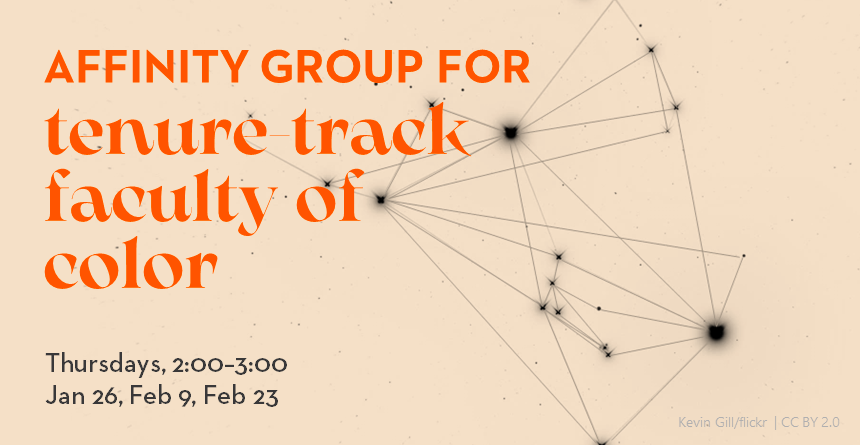
-
23WQ Affinity group for TT faculty of color - details
-
Affinity group
Thursdays: Jan 26, Feb 9, and Feb 23 | 2:00–3:00 | In person | Lemieux Library 409 (subject to change)
Co-sponsored by the Office of Diversity and Inclusion (ODI)
Facilitated by Colette Hoption
The Center for Faculty Development and the Office of Diversity and Inclusion are excited to announce the continuation of an affinity group for tenure-track faculty of color. The purpose of convening the group is to provide a space for the collective exploration of the impact of race, power, and privilege on the academic life of colleagues immersed in teaching, scholarship, and service at pre-tenure stages of their careers.
Why create a group for tenure-track faculty of color?
There are three primary reasons. First, the Task Force on Diversity and Inclusive Excellence report recommends boosting our capacity to retain talented minoritized faculty and facilitate professional development opportunities. Second, research on affinity groups indicates they enhance participants’ agency and optimism, while providing access to beneficial information and support. Third, from our own conversations with members of the Seattle University community, we know that faculty of color need a space where they can discuss their unique experiences in a supportive environment with peers who are similarly situated.
This professional development opportunity aims to empower tenure-track faculty of color to build community, share experiences, and pursue their academic life with more confidence and agency. We hope that this caucus process gives participants the space to determine “what solidarity could look like for...as people of color committed to the work of social, racial, and gender justice” (Kad Smith, Compass Point) at Seattle University.
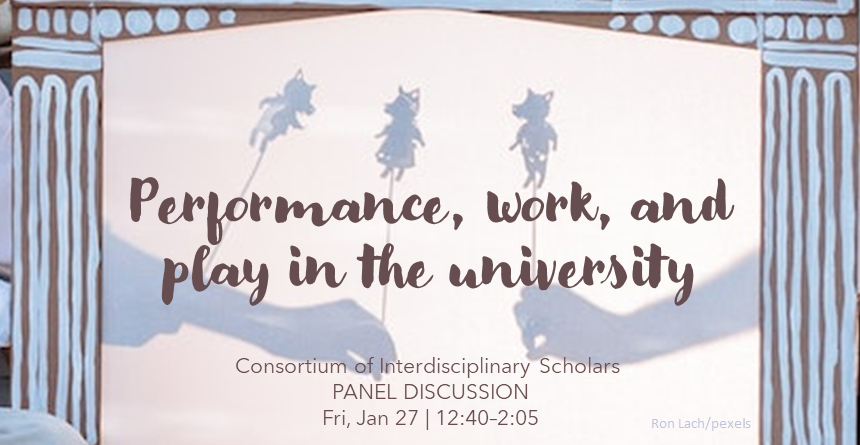
-
23WQ Performance, work, and play - details
-
Panel Discussion
Performance, work, and play in the university
Fri, Jan 27 | 12:40–2:05 | In person | Student Center 210 | Bring your own lunch; coffee and cookies provided
Co-sponsored by the Consortium of Interdisciplinary Scholars (CIS) and the Center for Faculty Development
Panel Moderator: Alic Shook (Nursing)
Panelists: Paul Holland (Law), Janet Hayatshahi (Performing Arts), and Carrie Miller (Nursing)
When we “perform” at the university are we working to conform to a role and meet others’ expectations or are we helping to foster a space for play?
Depending on our disciplinary perspectives, as well as our positions and titles, we may perform toward a specific desired outcome or impression. Or perhaps we consider performance as improvisational "happenings" where outcomes are not decided upon beforehand. Are these different orientations to performance mutually exclusive or can they support each other wherein work becomes playful and, in turn, play generates good work?
Come hear a panel of colleagues reflect on and share what performance means across disciplines, programs, pedagogical styles. We will invite conversation about how performance relates to how we view our work (our research, our encounters with students, and our collaborations with colleagues).
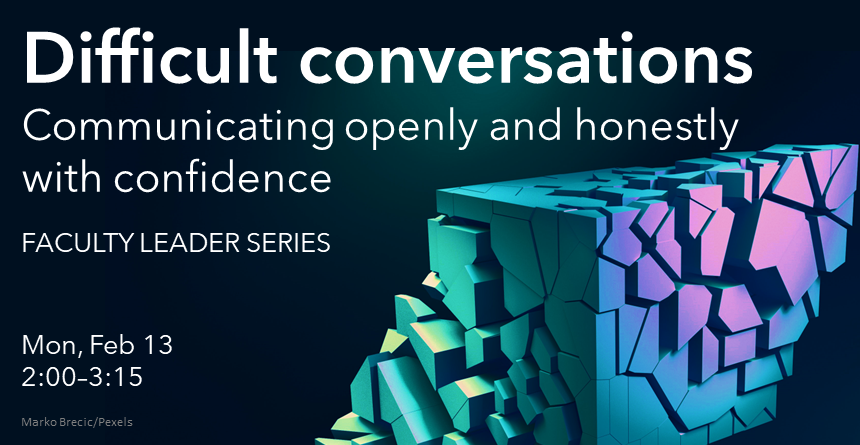
-
23WQ FLS Difficult Conversations - details
-
Faculty Leader Series Workshop
Difficult Conversations: Communicating openly and honestly with confidence
Mon, Feb 13 | 2:00–3:15 | In person | Oberto Commons (SINE 200) | Tea and coffee provided
Facilitated by Colette Hoption
Difficult conversations, like discussing an unfavorable performance review or resolving conflict with a colleague, are a natural part of organizational life. So it is unsurprising that many of us are in positions that require us to lead these conversations – with or without time or training to prepare.
Have you ever wondered what scholars have found to be the most effective or ineffective strategies? What is at stake when we manage these conversations poorly or what do we gain from managing them well? If so, this workshop is for you. You will be introduced to frameworks that inform the structure of these conversations, as well as current scholarship in this area. You will also get the opportunity to build and practice your approach to managing difficult conversations.
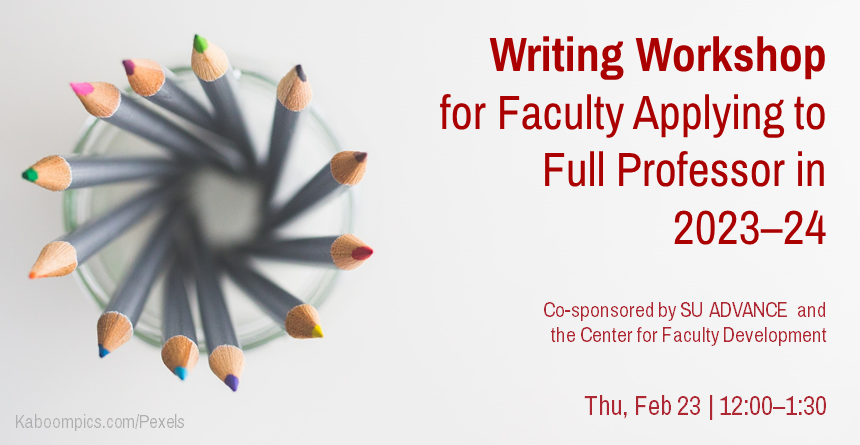
-
23WQ Writing workshop for faculty applying to full professor - details
-
Online Workshop
Writing workshop for faculty applying for promotion to full professor in 2023–24
Thu, Feb 23 | 12:00–1:30 | Via Zoom | Zoom link provided upon registration
Co-sponsored by the SU ADVANCE Program and the Center for Faculty Development
Co-facilitated by Jodi O'Brien (Principal Investigator, ADVANCE grant; Interim Associate Provost) and Colette M. Taylor (Special Assistant to the Provost for Strategic Directions)
If you are seeking promotion to full professor in the coming year, then this writing workshop is for you. This online workshop offers support and opportunities for writing and reflection for those of you planning to apply for promotion in the next year (i.e., submitting your promotion file in Fall 2023). As a reminder, faculty seeking promotion in AY 2023–2024 do not need to produce evidence of a multi-year Holistic Faculty Development Plan (HFDP). Faculty seeking promotion during this period do, however, need to produce evidence of a thoughtful, integrated file. Accordingly, this workshop will focus on writing a Holistic Faculty Development Statement as a core of your application.
An updated submission "requirements" guide to help faculty who are engaged in writing their tenure and promotion statements is available on the Academic Affairs website.
This submission guide is a companion document to the university's revised promotion guidelines.
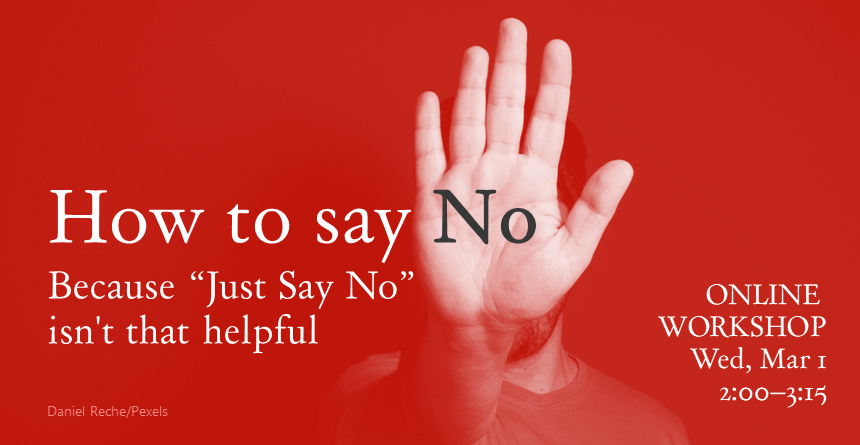
-
23WQ How to say no - details
-
Online Workshop
How to Say No: Because 'Just Say No' isn't that helpful
Wed, Mar 1 | 2:00–3:15 | Via Zoom | Zoom link provided upon registration
Facilitated by Therese Huston (SU Faculty Development Affiliate)
We’ve all received the advice, “Just say no,” and yet this is often much easier said than done. Saying no can be especially tricky for untenured faculty, women, and marginalized faculty, who are disproportionately asked to take on additional service. In this highly interactive workshop, we’ll draw upon research and lessons from the book The No Club: Putting an End to Women’s Dead-End Work, to empower you to make savvy decisions about when you say yes. Come to learn strategies for yourself or for someone you mentor.
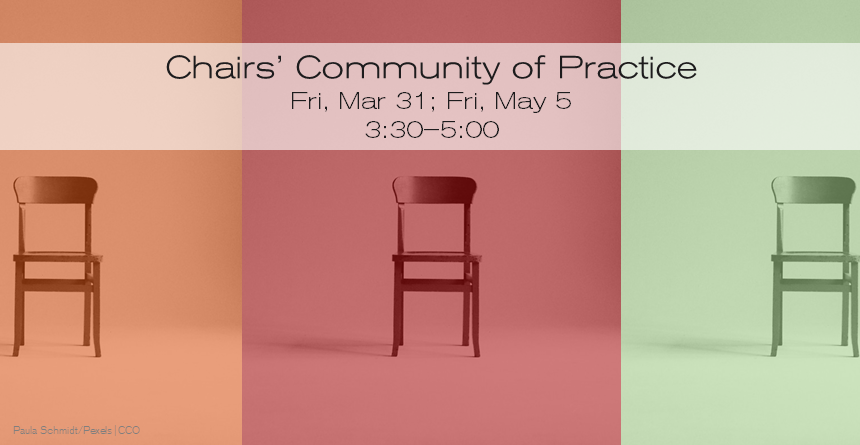
-
23SQ Chairs Community of Practice - details
-
The Chairs' Community of Practice is open to all current department chairs and chairs-elect, plus program directors and directors-elect who have faculty reporting to them directly (for example for performance reviews).
We gather twice per quarter.
Further details and how to register are available on the Community of Practice page here.
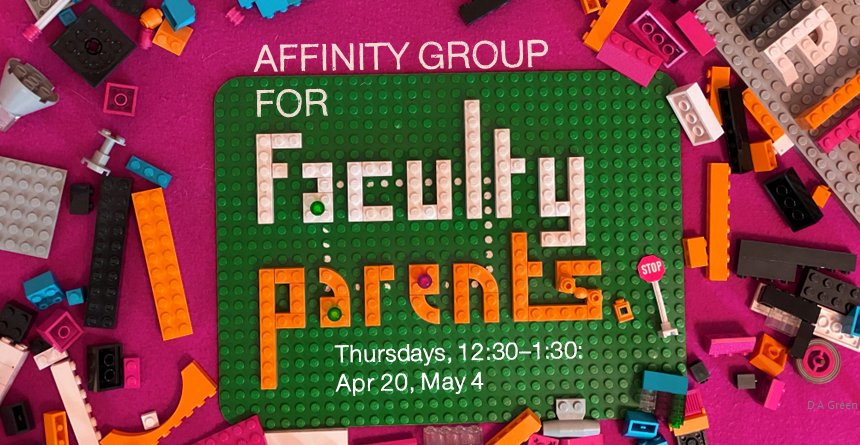
-
23SQ Affinity group for faculty parents - details
-
Affinity group
Thursdays: Apr 20 and May 4 with a third in-person date TBD by the group | 12:30–1:30 | Via Zoom (with a final in-person gathering) | Zoom link provided upon registration
Facilitated by Katherine Raichle
The Center for Faculty Development will be offering an affinity group for faculty parents of school-age children. The purpose of this group is to provide a space to discuss and explore the unique challenges faced by faculty who have children in their care. The challenge of parenting while maintaining a rigorous schedule of teaching, research, and/or service to the university is not new. However, for many, the benefits of finding a community of support around parenting has never been more urgent. We faced unprecedented demands of caregiving and schooling while balancing the work of our academic lives during the Covid-19 pandemic. The return to in-person work for ourselves and in-person school for our children has offered sources of consolation and desolation over the past year or so. Let’s convene and share where we are during this time and find ways to support one another.
Why an affinity group?
The psychological benefits of convening groups of people around common identities and experiences are well known. Research on affinity groups, in particular, has shown that they enhance agency and optimism, while also providing access to beneficial information and support.
Aims of the group
At its most basic level, we hope that this group offers a space where you can feel less isolated in your experience. We hope to foster a community of support amongst faculty parents, where they can share experiences, offer suggestions, and explore how to navigate these extremely challenging times.
*Note: if you are interested in this group but cannot make the time scheduled, please email faculty-development@seattleu.edu and let us know. We would like to support all faculty parents during this challenging time and will work with you to find ways to offer support.
» Register
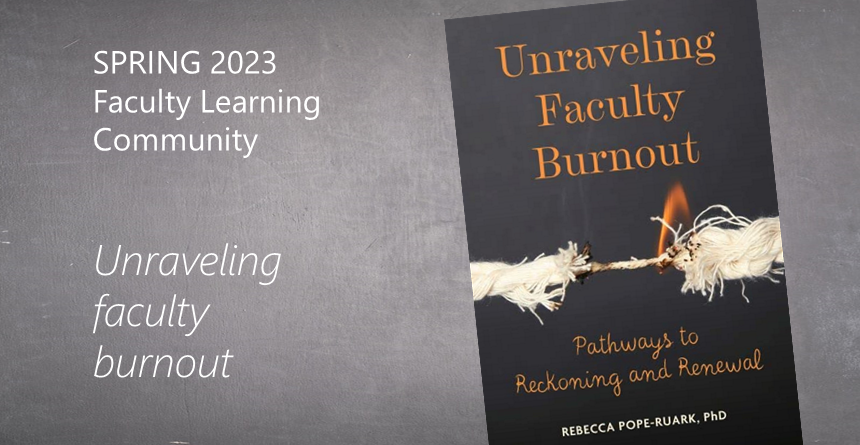
-
23SQ Unraveling faculty burnout - details
-
Faculty Learning Community
Unraveling faculty burnout: Pathways to reckoning and renewal
Mondays: Apr 24, May 8, and May 22 | 11:00–12:15 | In person | Hunthausen 110 | Tea, coffee, and snacks provided
Co-facilitated by Katherine Raichle and Andrea Verdan
In an academic culture that values productivity, competition, and external recognition, it is unsurprising when faculty—particularly women and faculty of color—find themselves stressed, overwhelmed, and weary. Left unchecked, these feelings can lead to burnout, characterized by energy depletion, work-related apathy or cynicism, and feelings of inadequacy.
In this learning community, we will read Unraveling Faculty Burnout, a book by Rebecca Pope-Ruark, who explores how we can reframe our experiences and conversations to mitigate burnout, specifically addressing the stressors unique to female and female faculty of color. From the book:
Pope-Ruark “helps faculty not only address burnout personally but also use the tools in this book to eradicate the systemic conditions that cause it in the first place. As burnout becomes more visible, we can destigmatize it by acknowledging that women are not unraveling; instead, women in higher education are reckoning with the productivity cult embedded in our institutions, recognizing how it shapes their understanding and approach to faculty work, and learning how they can remedy it for themselves, their peers, and women faculty in the future.”
In this three-session Learning Community, facilitated by Katherine Raichle (Psychology / Center for Faculty Development), and Andrea Verdan (Chemistry / Center for Faculty Development), we will discuss strategies and practices to counter burnout. In this space we invite faculty to engage in open and honest conversations about academic culture that often asks us to hide our failures, lulls, and periods of low productivity.
What can you expect?
Over the three sessions, you'll learn about the “four pillars of burnout resilience,” as discussed in the book:
- Re-discovering your purpose and sense of meaningful work
- Practicing compassion for yourself and others
- Deepening connections with peers and mentors
- Re-establishing realistic balance through self-care and setting boundaries
Who is it suited to?
While the book focuses on female faculty and female faculty of color, this learning community is open to all faculty.
Unraveling Faculty Burnout is 256 pages long, and reading will be split across the three sessions to be manageable for participants.
What are the dates?
This learning community meets in Casey 220 on:
- Mon, Apr 24 | 11:00–12:15
- Mon, May 8 | 11:00–12:15
- Mon, May 22 | 11:00–12:15
Tea, coffee, and snacks will be provided at all sessions.
» Register
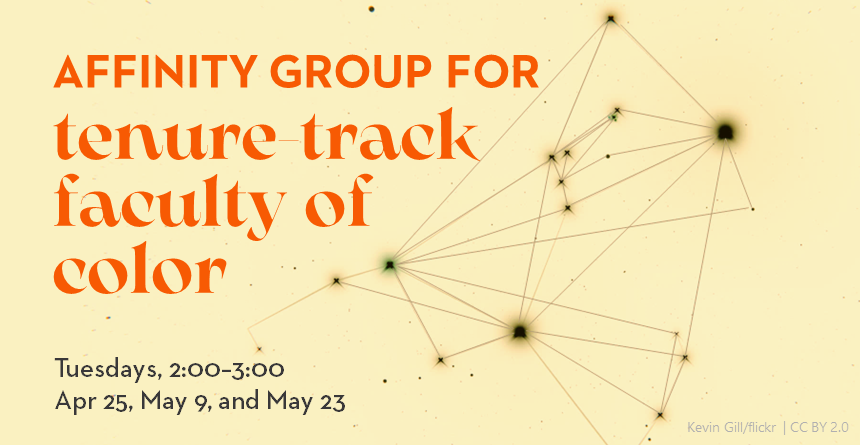
-
23SQ Affinity group for TT faculty of color - details
-
Affinity group
Tuesdays: Apr 25, May 9, and May 23 | 2:00–3:00 | In person | Lemieux Library 409 (subject to change) | Tea and coffee provided
Co-sponsored by the Office of Diversity and Inclusion
Facilitated by Gabriel Saucedo (Accounting)
The Center for Faculty Development and the Office of Diversity and Inclusion are excited to announce the continuation of an affinity group for tenure-track faculty of color. The purpose of convening the group is to provide a space for the collective exploration of the impact of race, power, and privilege on the academic life of colleagues immersed in teaching, scholarship, and service at pre-tenure stages of their careers.
Why create a group for tenure-track faculty of color?
There are three primary reasons. First, the Task Force on Diversity and Inclusive Excellence report recommends boosting our capacity to retain talented minoritized faculty and facilitate professional development opportunities. Second, research on affinity groups indicates they enhance participants’ agency and optimism, while providing access to beneficial information and support. Third, from our own conversations with members of the Seattle University community, we know that faculty of color need a space where they can discuss their unique experiences in a supportive environment with peers who are similarly situated.
This professional development opportunity aims to empower tenure-track faculty of color to build community, share experiences, and pursue their academic life with more confidence and agency. We hope that this caucus process gives participants the space to determine “what solidarity could look like for...as people of color committed to the work of social, racial, and gender justice” (Kad Smith, Compass Point) at Seattle University.
» Register
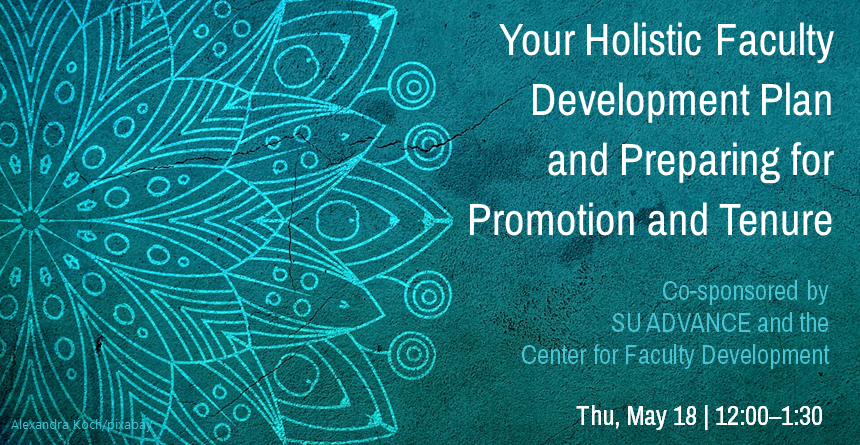
-
23SQ Your HFDP and preparing for promotion - details
-
SU ADVANCE Workshop
Your Holistic Faculty Development Plan and Preparing for Promotion and Tenure
Thu, May 18 | 12:00–1:30 | Via Zoom | Zoom link provided upon registration
Co-sponsored by the SU ADVANCE Program and the Center for Faculty Development
Co-facilitated by Jodi O’Brien (Principal Investigator, ADVANCE grant; Interim Associate Provost) and Colette M. Taylor (Special Assistant to the Provost for Strategic Directions)
This session is exclusively for associate professors who have been recently tenured and aim to apply for promotion to full professor from Fall 2024 onward under the university’s revised Promotion Guidelines for Full Professor. After AY2023–2024, faculty seeking promotion will need to produce evidence of a thoughtful, integrated promotion file, including a multi-year Holistic Faculty Development Plan (HFDP). Recently tenured faculty therefore need to begin mapping out an HFDP in order to apply for promotion in subsequent years. Therefore, this session is designed to help faculty begin to map out an HFDP which may answer the following questions:
- What is my professional impact?
- What is the relevance of my professional contributions and to whom?
- What are the unifying themes of my professional life?
- What am I passionate about professionally?
- How would I describe my specific forms of expertise?
- Who am I professionally and what support and resources do I need to live into this?
» Register
2021–22
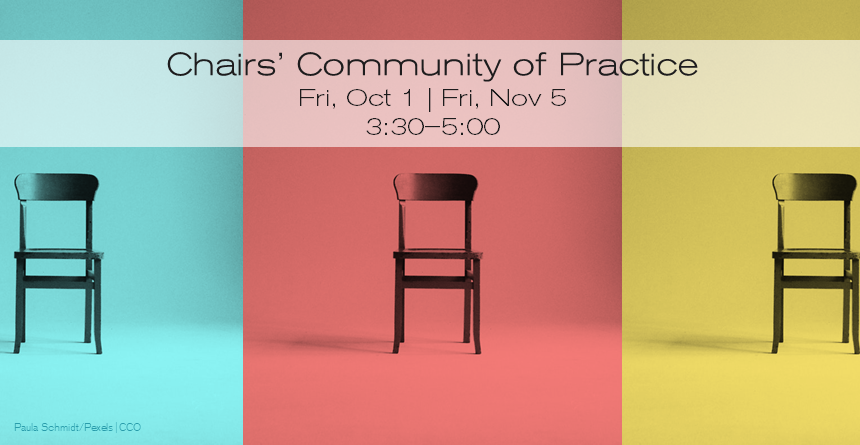
-
21FQ Chairs Community of Practice - details
-
The Chairs' Community of Practice is open to all current department chairs and chairs-elect, plus program directors and directors-elect who have faculty reporting to them directly (for example for performance reviews).
We gather twice per quarter.
Further details and how to register are available on the Community of Practice page here.
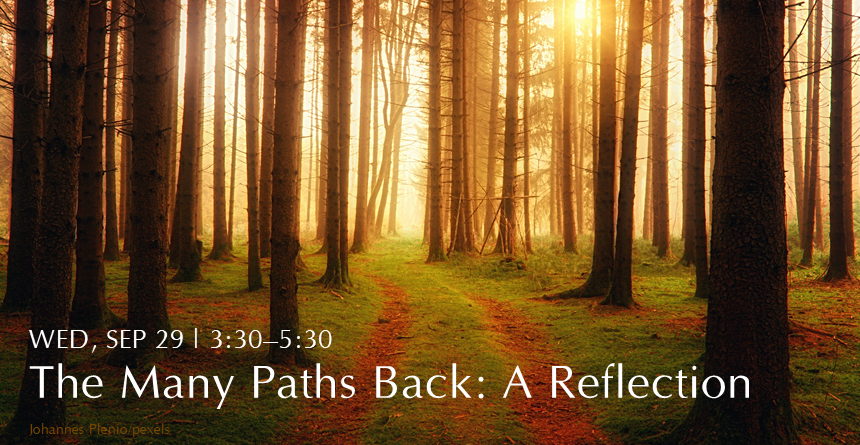
-
21FQ Many paths back - details
-
A reflection and a conversation
"The Many Paths Back": Faculty/Staff spaces for reflection and intention
Wed, Sep 29 | 3:30–5:30 | Zoom link provided upon registration
Co-sponsored by the Consortium of Interdisciplinary Scholars (CIS) and the Center for Jesuit Education (CJE)
On behalf of the Consortium of Interdisciplinary Scholars, the Center for Faculty Development, and the Center for Jesuit Education, we would like to invite you to two opportunities for reflection as we begin the quarter together, in a context that remains uncertain.
Many of us may be experiencing grief or anxiety about the lost possibility of somehow returning to the “normal” which now eludes us. Within our Ignatian tradition, this context presents an invitation to reflect on our collective and personal journeys through the past year in order to discern our path forward as we move into the fall.
This past spring, we invited all faculty and staff colleagues to post “consolations and desolations” to a virtual space for reflection called “What We Have Lost/What We Have Found.” We also hosted an informal event to hold space for conversation. At that event, a colleague invited us to consider what the “path back” will look like this fall.
As the autumn leaves now begin to change, we again invite you to post reflections, insights, poetry, or images on a collective virtual wall entitled “The Many Paths Back.” You might share what the landscapes of your summer journey looked like, and what paths you are choosing as we walk toward the horizon ahead. Please register to gain access to the "The Many Paths Back" padlet and post about your journey.
Please also join us on Zoom on Wednesday, September 29 at 3:30 pm for reflection and conversation about how we will choose our way, with whom we will walk, and how we honor the landscapes that reveal themselves this fall.
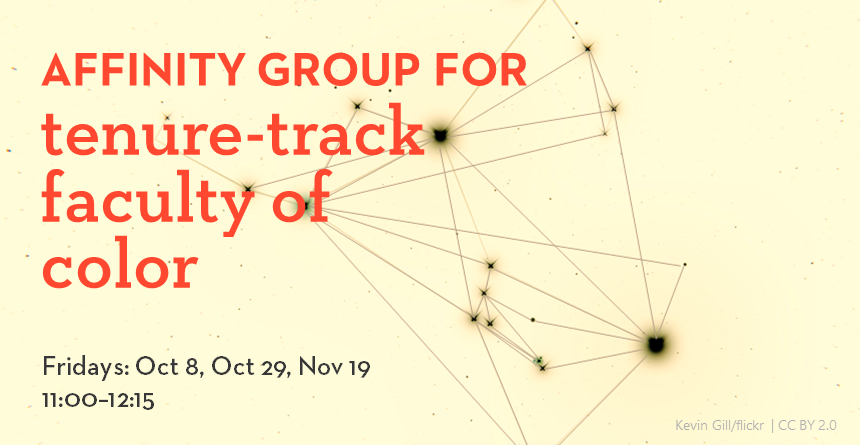
-
21FQ Affinity group for tenure-track faculty of color - details
-
Affinity group
Fridays: Oct 8, Oct 29, and Nov 19 | 11:00–12:15 | Zoom link provided upon registration
Co-sponsored by the Office of Diversity and Inclusion (ODI)
Facilitated by Holly Slay Ferraro
The Center for Faculty Development and the Office of Diversity and Inclusion are excited to announce the continuation of an affinity group for tenure-track faculty of color. The purpose of convening the group is to provide a space for the collective exploration of the impact of race, power, and privilege on the academic life of colleagues immersed in teaching, scholarship, and service at pre-tenure stages of their careers.
This fall, the group will read the book The Black Academic's Guide to Winning Tenure Without Losing Your Soul by Kerry Ann Rockquemore and Tracey Laszloffy. The Center for Faculty Development is pleased to provide books for the group this quarter.
Why create a group for tenure-track faculty of color?
There are three primary reasons. First, the Task Force on Diversity and Inclusive Excellence report recommends boosting our capacity to retain talented minoritized faculty and facilitate professional development opportunities. Second, research on affinity groups indicates they enhance participants’ agency and optimism, while providing access to beneficial information and support. Third, from our own conversations with members of the Seattle University community, we know that faculty of color need a space where they can discuss their unique experiences in a supportive environment with peers who are similarly situated.
This professional development opportunity aims to empower tenure-track faculty of color to build community, share experiences, and pursue their academic life with more confidence and agency. We hope that this caucus process gives participants the space to determine “what solidarity could look like for... people of color committed to the work of social, racial, and gender justice” (Kad Smith, Compass Point) at Seattle University.
» Register
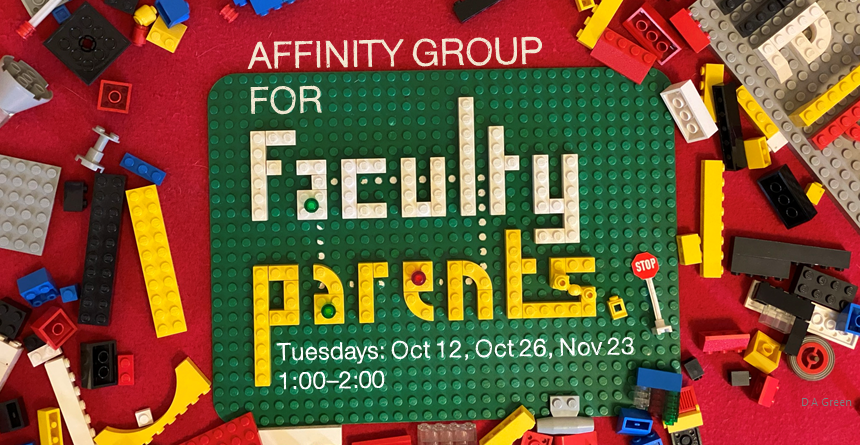
-
21FQ Affinity group for faculty parents - details
-
Affinity group
Tuesdays: Oct 12 and Oct 26 | 1:00–2:00 | Zoom link provided upon registration
Facilitated by Katherine Raichle
The Center for Faculty Development will be offering an affinity group for faculty parents of school-age children. The purpose of this group is to provide a space to discuss and explore the unique challenges faced by faculty who have children in their care. The challenge of parenting while maintaining a rigorous schedule of teaching, research, and/or service to the university is not new. However, the benefits of finding a community of support around parenting has never been more urgent. We have faced unprecedented demands of caregiving and schooling while balancing the work of our academic lives during the COVID-19 pandemic. The return to in-person work for ourselves and in-person school for our children likely offers sources of consolation and desolation. Let’s convene and share where we are during this time and find ways to support one another.
Why an affinity group?
The psychological benefits of convening groups of people around common identities and experiences are well known. Research on affinity groups, in particular, has shown that they enhance agency and optimism, while also providing access to beneficial information and support.
Aims of the group
At its most basic level, we hope that this group offers a space where you can feel less isolated in your experience. We hope to foster a community of support amongst faculty parents, where they can share experiences, offer suggestions, and explore how to navigate these extremely challenging times.
*Note: if you are interested in this group but cannot make the time scheduled, please email faculty-development@seattleu.edu and let us know. We would like to support all faculty parents during this challenging time and will work with you to find ways to offer support.
» Register
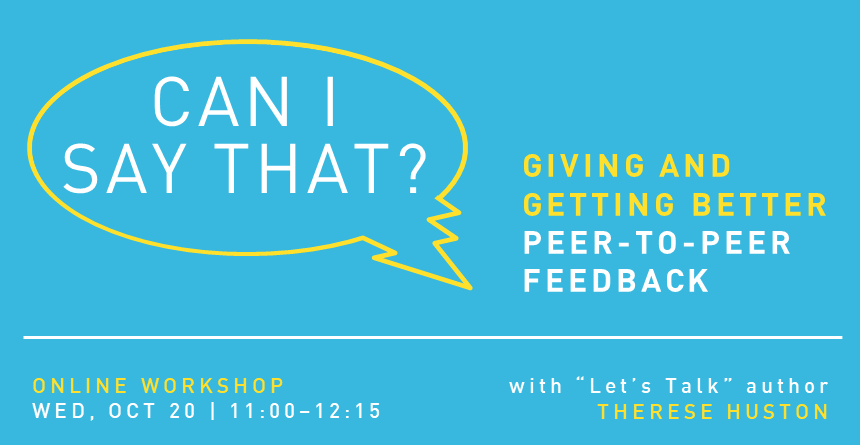
-
21FQ Can I say that? Peer feedback - details
-
Faculty Leader Series | Online workshop
Can I say that? Giving and getting better peer-to-peer feedback
Wed, Oct 20 | 11:00–12:15 | Zoom link provided upon registration
Facilitated by Therese Huston
Few of us can be successful as faculty without feedback, yet chances are you aren’t getting the feedback you need most from your colleagues. And if you’re a department chair, you’re wondering how to give feedback in a way that doesn’t crush souls or squelch motivation. In this interactive and research-backed workshop, we’ll reframe workplace feedback so that it’s more useful and less threatening. We’ll explore transformative principles such as “Side with the person, not the problem,” and “Make your motto, ‘No surprises.’” You’ll leave with five strategies you can put into action immediately: strategies for soliciting better feedback and strategies for giving the feedback someone else needs to succeed.
» Register
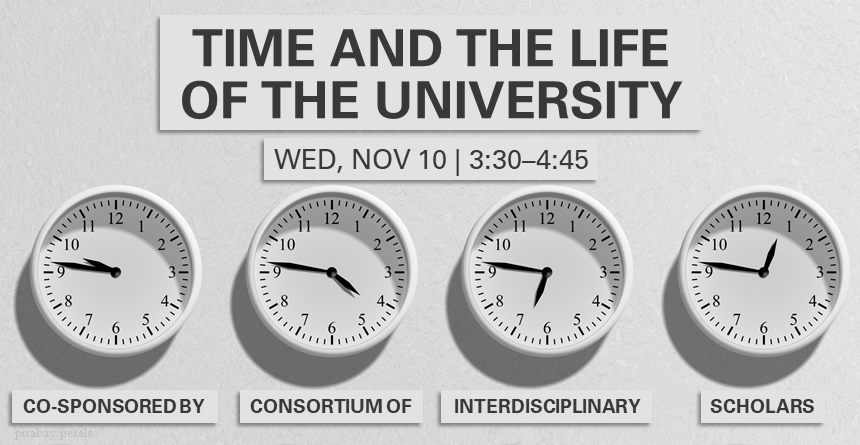
-
21FQ Time and the life of the university - details
-
Panel Discussion
Time and the life of the University
Wed, Nov 10 | 3:30–4:45 | Zoom link provided upon registration
Co-sponsored by the Consortium of Interdisciplinary Scholars
Facilitated by Ken Allan (Art History, College of Arts & Sciences)
Considering the ongoing experience of the pandemic and the public pressure to return to “normal” in the US, even as vaccinations plateau and the Delta variant surges, what has personal isolation and a deadly health crisis taught us about our relationship to time? What connections can we make between the way we think about time and temporality from within the discourse of our disciplines and the way time is structured, managed, measured, and experienced within the university and in our broader culture for students, faculty and staff? How is our relationship to time, or the ideals and realities of how we “spend our time” as members of a university community, related to our educational mission?
» Register
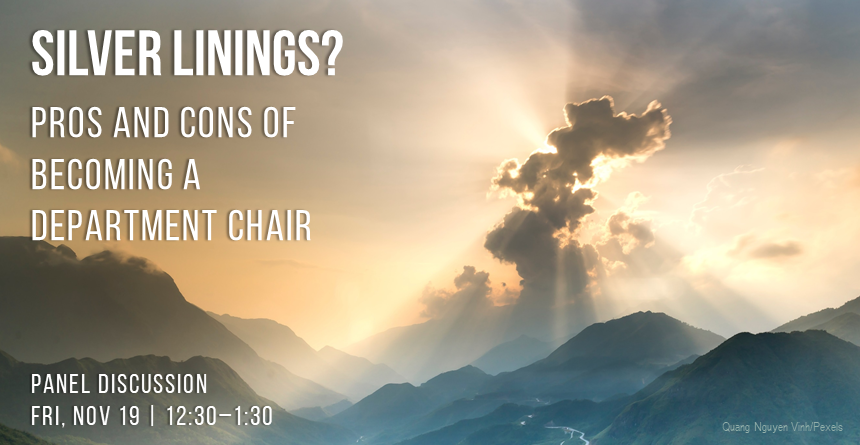
-
21FQ Silver Linings - details
-
Panel Discussion
Silver linings? Pros and cons of becoming a department chair
Fri, Nov 19 | 12:30–1:30 | Zoom link to follow upon registration
Facilitated by David Green and Holly Slay Ferraro
If your future might involve a stint as a department chair or a program director, do you face that prospect with a feeling of excitement, of dread, of curiosity, or of something else entirely? What does it mean to lead and represent a group of fellow faculty on a fixed-term basis, knowing that you’ll then return to being a peer?
In this frank Q&A discussion, you’ll meet a panel of current chairs and directors to discover what their roles entail and the extent to which they can contribute to the smooth functioning of their areas, revitalize their disciplines and programs, and take on academic leadership within the university.
Learn about some of the possible pitfalls and hidden pleasures of chairing to help you figure out whether the opportunity to chair presents you personally with a preponderance of clouds or of silver linings.
The session also includes a Q&A in a confidential environment.
» Register
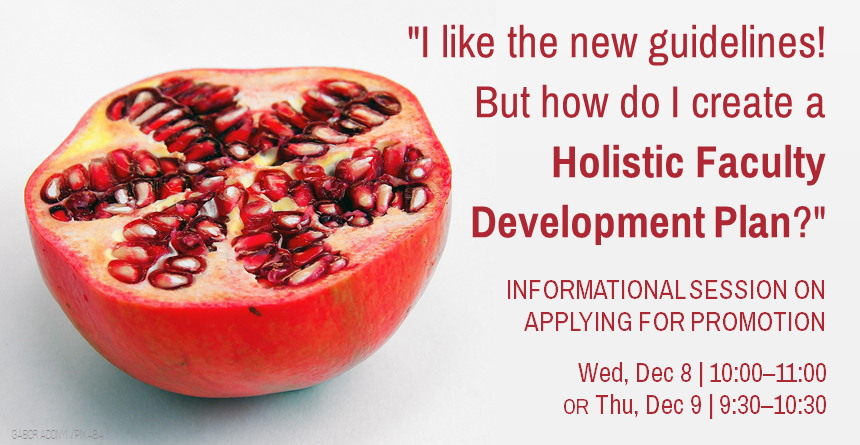
-
21FQ Holistic Faculty Development Plan - details
-
Informational Session on Applying for Promotion
I like the new guidelines! But how do I create a Holistic Faculty Development Plan?
Wed, Dec 8 | 10:00–11:00 | Zoom link provided upon registration
OR
Thu, Dec 9 | 9:30–10:30 | Zoom link provided upon registration
Co-sponsored by the SU ADVANCE Program
Co-facilitated by Jodi O'Brien (Principal Investigator, ADVANCE grant; Special Assistant to the Provost for Faculty Development) and Jean Jacoby (Co-Principal Investigator, ADVANCE grant; Associate Dean, College of Science & Engineering)
In June 2021, the SU Board of Trustees voted to formally adopt the SU ADVANCE proposed Revised Promotion Guidelines for Full Professor. The revisions go into effect immediately, although faculty seeking promotion in the 2021–2022 academic year are considered an "intermediate group" and therefore do not need to fulfill some of the new requirements, including the development of a "Holistic Faculty Development Plan" (HFDP).
Faculty seeking promotion in subsequent years will need to begin mapping out an HFDP. Ideally, this will be an opportunity to think deeply about intentional career development but we recognize that this represents a cultural and procedural shift for our faculty. Accordingly, we plan to hold an information session via Zoom to discuss the HFDP in more depth.
Due to popular demand, we are running this session twice.
- Wed, Dec 8 | 10:00–11:00
- Thu, Dec 9 | 9:30–10:30 (additional date and time)
The two sessions will cover the same material and will be facilitated by Jodi O'Brien and Jean Jacoby.
Mentoring is a key component of the HFDP. We are currently conducting training workshops for faculty in evaluative positions (e.g., College/School personnel committees), but welcome participation from all senior faculty interested in mentoring other faculty to also participate in this information session.
Faculty Handbook [PDF]
» Register
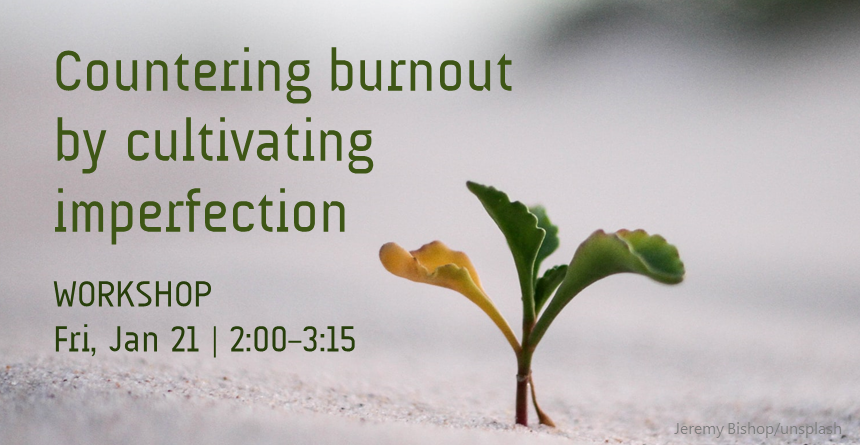
-
22WQ Countering burnout by cultivating imperfection - details
-
Workshop
Countering burnout by cultivating imperfection
Fri, Jan 21 | 2:00–3:15 | Zoom link provided upon registration
Facilitated by Naomi Hume (Art History)
Our return to campus promised relief from the isolation of working and teaching remotely for a year. But faculty report feeling burned out after the fall. What is burnout and what can we do to alleviate it, even as the pandemic and its impacts endure?
In this session, we’ll define burnout as it is discussed in the literature and address why it is particularly prevalent among women and BIPOC faculty. We will explore how perfectionist habits perpetuate burnout and learn to cultivate imperfection to interrupt that vicious cycle. Cultivating imperfection does not mean aiming to fail. Instead, it allows us to adapt our standards to discern which tasks demand close attention and which tasks just need to get done.
We’ll end the session with practical steps to interrupt perfectionism so we can devote more time and attention to what really matters.
» Registration is now closed.
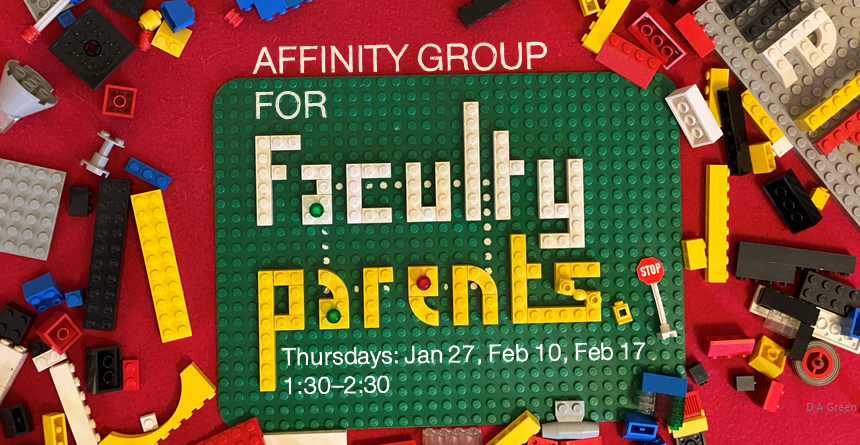
-
22WQ Affinity group for faculty parents - details
-
Affinity group
Thursdays: Jan 27, Feb 10, and Feb 17 | 1:30–2:30 | Zoom link provided upon registration
Facilitated by Katherine Raichle
The Center for Faculty Development will be offering an affinity group for faculty parents of school-age children. The purpose of this group is to provide a space to discuss and explore the unique challenges faced by faculty who have children in their care. The challenge of parenting while maintaining a rigorous schedule of teaching, research, and/or service to the university is not new. However, the benefits of finding a community of support around parenting has never been more urgent. We have faced unprecedented demands of caregiving and schooling while balancing the work of our academic lives during the COVID-19 pandemic. The return to in-person work for ourselves and in-person school for our children has offered sources of consolation and desolation. Let’s convene and share where we are during this time and find ways to support one another.
Why an affinity group?
The psychological benefits of convening groups of people around common identities and experiences are well known. Research on affinity groups, in particular, has shown that they enhance agency and optimism, while also providing access to beneficial information and support.
Aims of the group
At its most basic level, we hope that this group offers a space where you can feel less isolated in your experience. We hope to foster a community of support amongst faculty parents, where they can share experiences, offer suggestions, and explore how to navigate these extremely challenging times.
*Note: if you are interested in this group but cannot make the time scheduled, please email faculty-development@seattleu.edu and let us know. We would like to support all faculty parents during this challenging time and will work with you to find ways to offer support.
» Registration is now closed.
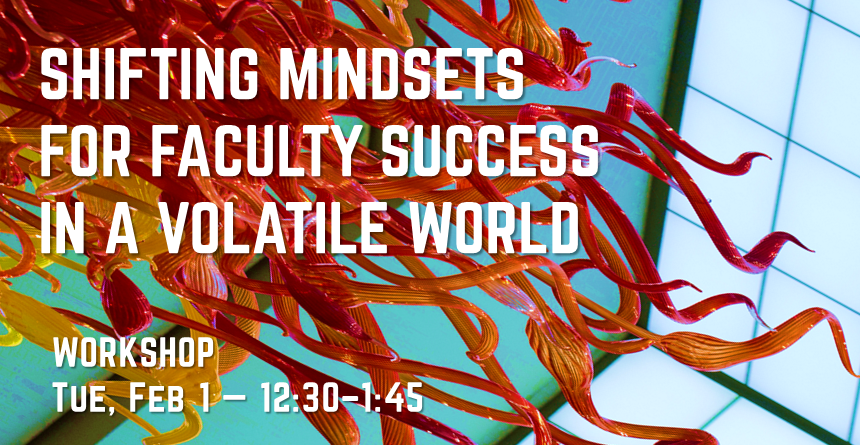
-
22WQ Shifting mindsets for faculty success - details
-
Workshop
Shifting mindsets for faculty success in a volatile world
Tue, Feb 1 | 12:30–1:45 | Zoom link provided upon registration
Facilitated by Colette Taylor (Leadership & Professional Studies)
In the wake of a pandemic and the current racial tension, faculty have been confronted with sudden and drastic changes. One possible response, “VUCA,” is the ability to reframe the mind toward actionable resolutions and high levels of engagement; it requires that faculty colleagues and leaders work to listen and learn. The acronym VUCA stands for “volatility, uncertainty, complexity, and ambiguity” – four challenges that each require different kinds of responses (e.g., Bennett & Lemoine, 2014). One challenge for many faculty is a reticence to shift mindsets. If we, as faculty members, are to make any inroads with colleagues and students, the ability to pivot from one framework of thinking to another – quickly and seamlessly – requires nimbleness and open-mindedness.
This hands-on workshop provides participants a space to examine how they can practice shifting mindsets and apply self-care while holding the role of educator. Additionally, there is a strong focus on equipping faculty at all levels with the necessary tools to guide their departments with a renewed sense of courage and character, ultimately preparing to teach and work in a VUCA world.
» Registration is now closed.
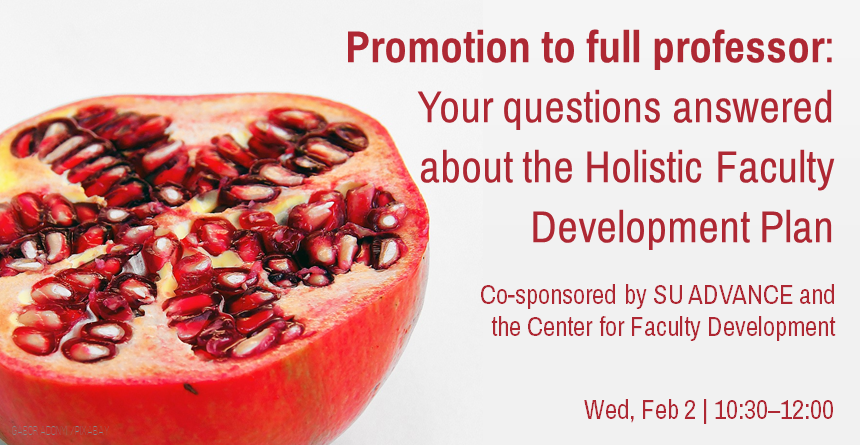
-
22WQ Promotion to Full Professor Q&A - details
-
Q&A Session
Promotion to full professor: Your questions answered about the Holistic Faculty Development Plan
Wed, Feb 2 | 10:30–12:00 | Zoom link provided upon registration
Co-sponsored by the SU ADVANCE program and the Center for Faculty Development
Co-facilitated by Jodi O'Brien (Principal Investigator, ADVANCE grant; Special Assistant to the Provost for Faculty Development) and Jean Jacoby (Co-Principal Investigator, ADVANCE grant; Associate Dean, College of Science & Engineering)
Beginning in fall 2022, all faculty applying for promotion to Full Professor are required to develop a “Holistic Faculty Development Plan” (HFDP) that articulates their own professional trajectory and interests.
Building on the informational sessions we held in December 2021 (slides available on the SU ADVANCE site here), this Winter Quarter Zoom session includes general Q&A, as well as small-group discussion. All faculty who have questions about the new guidelines, the new HFDP requirement, and/or the promotion process are welcome to attend.
Please register by January 30. You will then receive the meeting information and Zoom link.
» Registration is now closed.
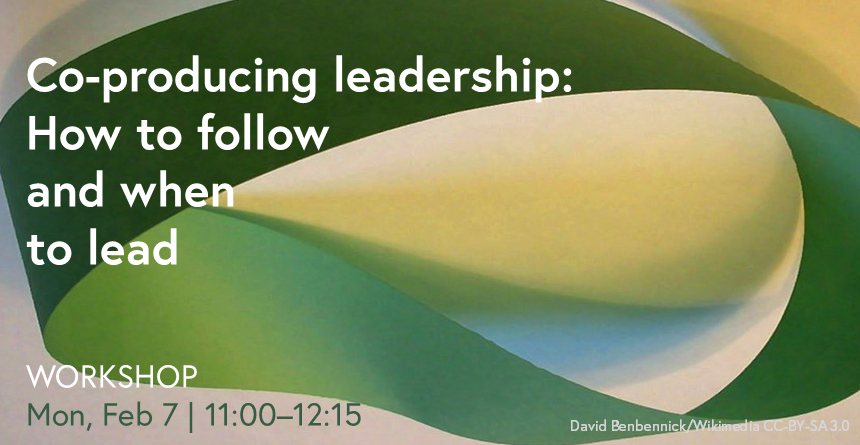
-
22WQ Co-producing leadership - details
-
Workshop
Co-producing leadership: How to follow and when to lead
Mon, Feb 7 | 11:00–12:15 | Zoom link provided upon registration
Facilitated by Colette Hoption (Management)
A browse through any bookstore (or even our University mission!) will affirm that leadership is a hot topic. Faculty are especially poised to question, “What is leadership?” for the sake of developing our students into leaders and exerting influence in our own communities.
However, just as there are different styles of leadership that sell books, there are different styles of “followership” and followers whose stories need to be told. There is a general lack of attention paid to the follower role in scholarship and in the popular press, resulting in an incomplete understanding of leadership. For example, even if we know exactly how we want to lead, how can we know that others will want to follow? This workshop redresses the leader–follower imbalance by introducing participants to five followership styles. Participants will be invited to reflect on their own followership, and the strategies they have used to enable great leaders and curb destructive ones.
What's in it for you?
By the end of this workshop, you will:
- Identify your own followership style
- Learn how to effectively partner with leaders when in a subordinate role
- Develop leader strategies for activating effective followership
Who is it suited to?
This workshop is suitable for any faculty member who is engaged in collaborative work within explicitly or implicitly hierarchical teams, and/or interested in empowering leaders (for a just and humane world).
» Registration is now closed.
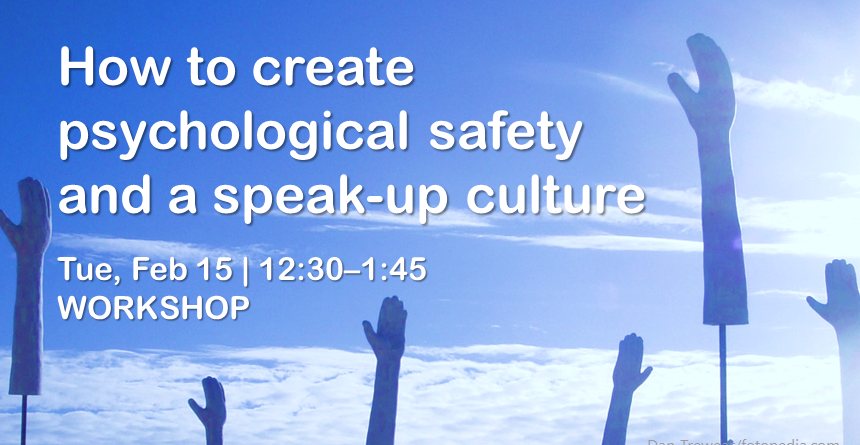
-
22WQ Psychological safety - details
-
Workshop
How to create psychological safety and a speak-up culture
Tue, Feb 15 | 12:30–1:45 | Zoom link provided upon registration
Facilitated by Therese Huston, SU Faculty Development Affiliate
Researchers find that high-performing groups at work have something common: they enjoy high psychological safety. Individuals are more willing, for example, to speak up in a meeting when psychological safety is high. But what is psychological safety, and what can you do to foster it? In this interactive workshop, we’ll look at ways to create psychological safety for yourself, for the people in your department, college, or school, and for the meetings you lead, with a special focus on creating psychological safety in virtual environments.
» Registration is now closed.
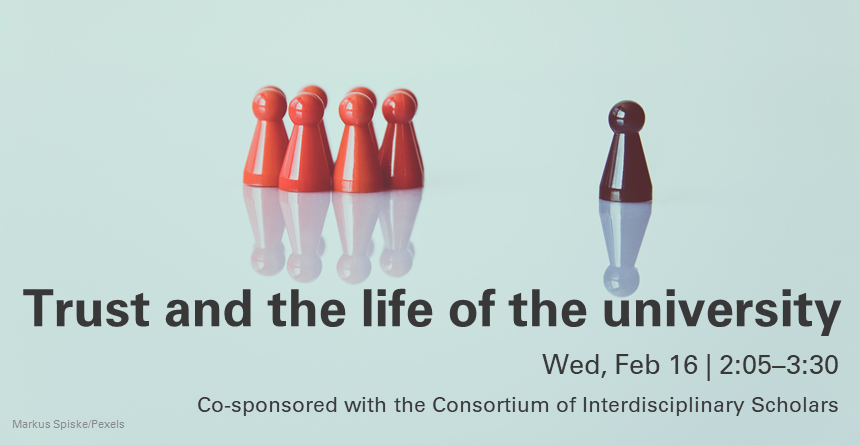
-
22WQ Trust and the life of the university - details
-
Panel Discussion
Trust and the life of the university
Wed, Feb 16 | 2:05–3:30 | Zoom link provided upon registration
Co-sponsored by the Consortium of Interdisciplinary Scholars
Facilitated by Jen Schulz (Interdisciplinary Liberal Studies)
Two years from the start of the pandemic, the prefix du jour in higher education worldwide is “re-:” Universities are re-committing, re-engaging, re-imagining, re-positioning, re-structuring. What each of these endeavors may presuppose is trust.
But what do we mean by “trust” in the context of the university? Depending on our perspectives, “trusting” may be a strategic move, an emotional process, a social investment, a legal responsibility. Often we conflate and confuse these facets when we name “trust” as a goal.
So is it possible to find common ground for a shared understanding of trust within university communities? In what ways do our attempts to establish trust foreclose on the potentially more necessary work of naming what was and will always be contingent and conditional? Or is trust the precondition upon which the re-building and re-imagining of higher education depends?
Come join a panel of colleagues from across the university who offer their rich perspectives on trust in a university setting and invite us into conversation.
» Registration is now closed.
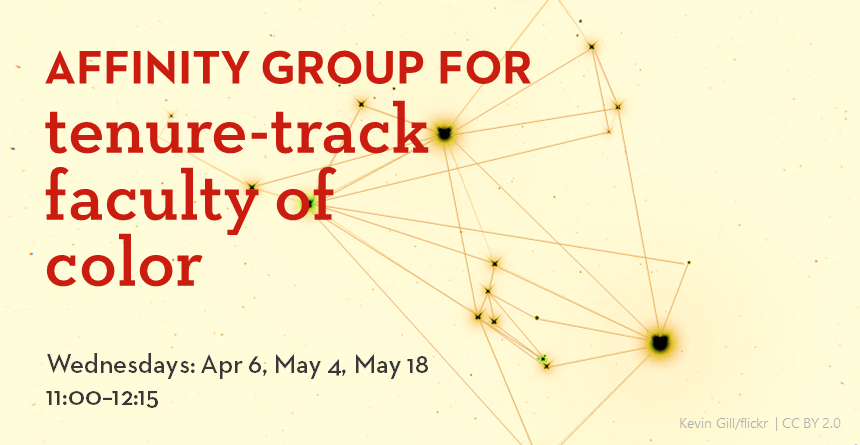
-
22SQ Affinity group for TT faculty of color - details
-
Affinity Group
Wednesdays: Apr 6, May 4, and May 18 | 11:00–12:15 | Zoom link provided upon registration
Co-sponsored by the Office of Diversity and Inclusion (ODI)
Facilitated by Colette Hoption
The Center for Faculty Development and the Office of Diversity and Inclusion are excited to announce the continuation of an affinity group for tenure-track faculty of color. The purpose of convening the group is to provide a space for the collective exploration of the impact of race, power, and privilege on the academic life of colleagues immersed in teaching, scholarship, and service at pre-tenure stages of their careers.
Why create a group for tenure-track faculty of color?
There are three primary reasons. First, the Task Force on Diversity and Inclusive Excellence report recommends boosting our capacity to retain talented minoritized faculty and facilitate professional development opportunities. Second, research on affinity groups indicates they enhance participants’ agency and optimism, while providing access to beneficial information and support. Third, from our own conversations with members of the Seattle University community, we know that faculty of color need a space where they can discuss their unique experiences in a supportive environment with peers who are similarly situated.
This professional development opportunity aims to empower tenure-track faculty of color to build community, share experiences, and pursue their academic life with more confidence and agency. We hope that this caucus process gives participants the space to determine “what solidarity could look like for...as people of color committed to the work of social, racial, and gender justice” (Kad Smith, Compass Point) at Seattle University.
» Registration is now closed.
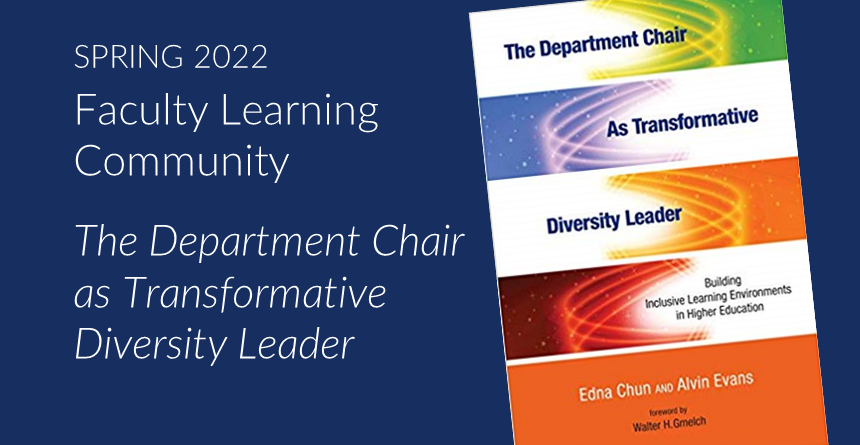
-
22SQ Department Chair as Transformative Diversity Leader - details
-
Faculty Learning Community
The Department Chair as Transformative Diversity Leader
Fridays: Apr 22, May 6, and May 27 | 11:00–12:15 | Zoom link provided upon registration
Co-sponsored by the Office of Diversity and Inclusion (ODI)
Facilitated by Katherine Raichle
Are you interested in seeking concrete tools and strategies for successfully implementing diversity in your department or program? Edna Chun and Alvin Evans’s The Department Chair as Transformative Diversity Leader: Building Inclusive Learning Environments in Higher Education provides practical, research-based approaches representative of best practices from across the United States to achieve this result.
In this three-session Learning Community, facilitated by Katherine Raichle (Center for Faculty Development), you'll work your way through the chapters of the book so that you are better prepared to lead other faculty in advancing diversity in multiple areas, including tenure and promotion, curricular change, student learning outcomes, departmental climate, and the representation of a diverse faculty and staff.
What's in it for you?
Over the three sessions, you'll learn how to:
- Implement a conceptual framework for diversity transformation
- Develop strategies for attaining consensus on a diversity agenda
- Develop strategies for overcoming environmental hurdles and navigating the academic infrastructure
- Recruit and retain a diverse faculty
- Enhance diversity learning outcomes and student identity development
- Develop a department or program diversity strategic plan
Who is it suited to?
This community is primarily for incoming or established department chairs and program directors, but other faculty members who are interested in promoting an inclusive learning environment would also benefit from this learning community.
The Department Chair as Transformative Diversity Leader is 181 pages long, and reading will be split across the three sessions to be manageable for participants.
What are the dates?
The three dates in Spring Quarter are:
- Fri, Apr 22 | 11:00–12:15
- Fri, May 6 | 11:00–12:15
- Fri, May 27 | 11:00–12:15
- Zoom link provided upon registration
» Registration is now closed.
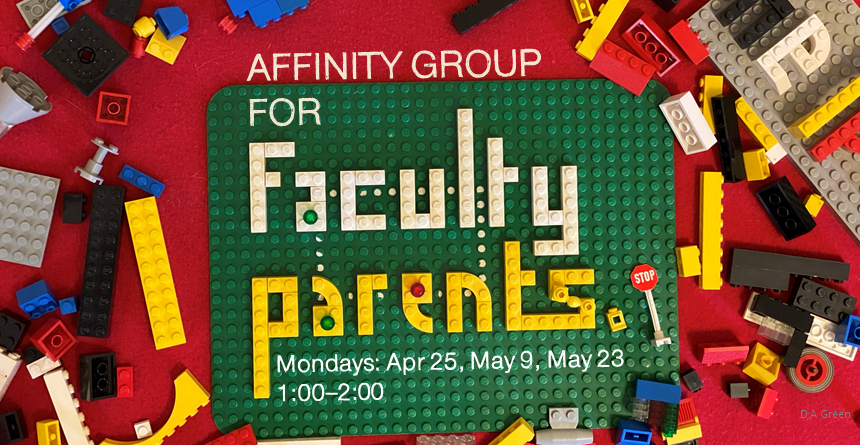
-
22SQ Affinity group for faculty parents - details
-
Affinity group
Mondays: Apr 25, May 9, and May 23 | 1:00–2:00 | Zoom link provided upon registration
Facilitated by Katherine Raichle
The Center for Faculty Development will be offering an affinity group for faculty parents of school-age children. The purpose of this group is to provide a space to discuss and explore the unique challenges faced by faculty who have children in their care. The challenge of parenting while maintaining a rigorous schedule of teaching, research, and/or service to the university is not new. However, the benefits of finding a community of support around parenting has never been more urgent. We have faced unprecedented demands of caregiving and schooling while balancing the work of our academic lives during the COVID-19 pandemic. The return to in-person work for ourselves and in-person school for our children has offered sources of consolation and desolation. Let’s convene and share where we are during this time and find ways to support one another.
Why an affinity group?
The psychological benefits of convening groups of people around common identities and experiences are well known. Research on affinity groups, in particular, has shown that they enhance agency and optimism, while also providing access to beneficial information and support.
Aims of the group
At its most basic level, we hope that this group offers a space where you can feel less isolated in your experience. We hope to foster a community of support amongst faculty parents, where they can share experiences, offer suggestions, and explore how to navigate these extremely challenging times.
*Note: if you are interested in this group but cannot make the time scheduled, please email faculty-development@seattleu.edu and let us know. We would like to support all faculty parents during this challenging time and will work with you to find ways to offer support.
» Registration is now closed.
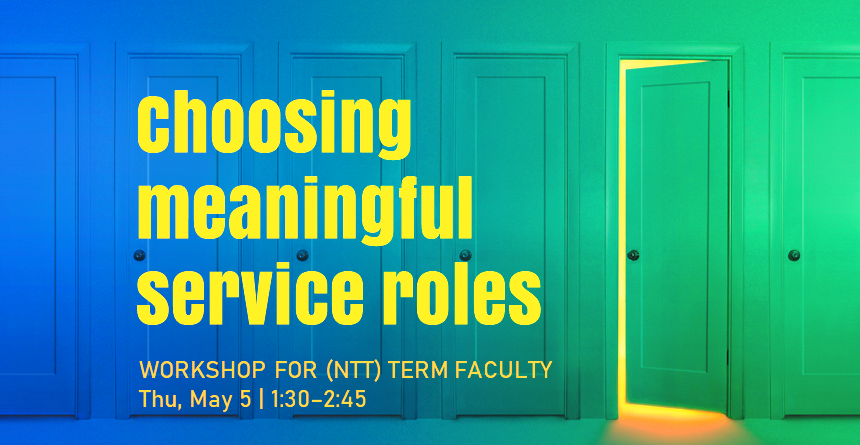
-
22SQ Choosing meaningful service roles - details
-
Workshop for (NTT) Term Faculty
Choosing meaningful service roles
Thu, May 5 | 1:30–2:45 | Zoom link provided upon registration
Facilitated by Hannah Tracy (English)
As (NTT) term faculty, fulfilling our contractual service obligations can sometimes feel like checking boxes for annual performance reviews and promotion files, but it doesn’t have to be that way. This workshop asks term faculty to consider how thoughtful service choices can help us carve out meaningful and sustainable career paths at SU.
Over the last several years, shared governance bodies, committees, and leadership positions have become increasingly inclusive of term faculty. There are now more opportunities than ever to find service roles that connect us to colleagues across campus, allow us to develop our skills and gain new ones, give us avenues to pursue our passions, and encourage us to utilize our strengths for the benefit of the SU community. At the same time, it can be difficult and intimidating to say "no" to requests for service, and we risk burning out or doing too much uncompensated labor. When carefully chosen, service can be an opportunity for professional development and can give us valuable experience in areas we’re interested in exploring.
This workshop will highlight different types of service opportunities and offer space for reflection, discussion, and discernment, while also emphasizing the importance of setting boundaries and saying no to service requests that don’t fit with our priorities and passions.
What's in it for you?
During this workshop, you'll learn how to:
- Discern how service can help you meet your professional development goals and/or match your interests
- Identify service opportunities that are in alignment with your professional development goals and interests
- Set boundaries to maintain balance in your service
Who is it suited to?
This community is for any NTT/Term faculty members.
» Registration is now closed.
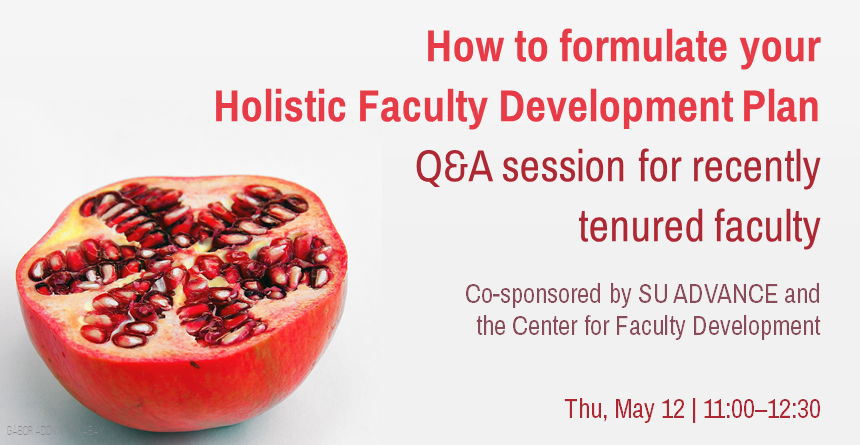
-
22SQ Recently tenured faculty Q&A about the HFDP - details
-
Q&A Session
Q&A session for recently tenured faculty about how to formulate their Holistic Faculty Development Plan
Thu, May 12 | 11:00–12:30 | Zoom link provided upon registration
Co-sponsored by the SU ADVANCE program and the Center for Faculty Development
Facilitated by Jodi O'Brien (Principal Investigator, ADVANCE grant; Special Assistant to the Provost for Faculty Development)
This session is exclusively for associate professors who have been recently tenured and aim to apply for promotion to full professor at any point from Fall 2024 onward under the university’s revised Promotion Guidelines for Full Professor.
After AY 2022-2023 and AY 2023-2024, faculty seeking promotion will need to produce evidence of a thoughtful, integrated promotion file, including a multi-year Holistic Faculty Development Plan (HFDP). Recently tenured faculty therefore need to begin mapping out an HFDP in order to apply for promotion in subsequent years.
You may be asking yourself “What is an HFDP?” and “How should I begin writing one?” This session is here to help and is one of many that we plan to hold in the coming year.
We realize that many of you already approach your professional trajectory in an integrated manner; now you simply need to articulate this integration systematically in writing. For those of you who aren’t already in that position, then this session will orient you.
Please register by May 5. You will then receive the meeting information and Zoom link.
» Registration is now closed.
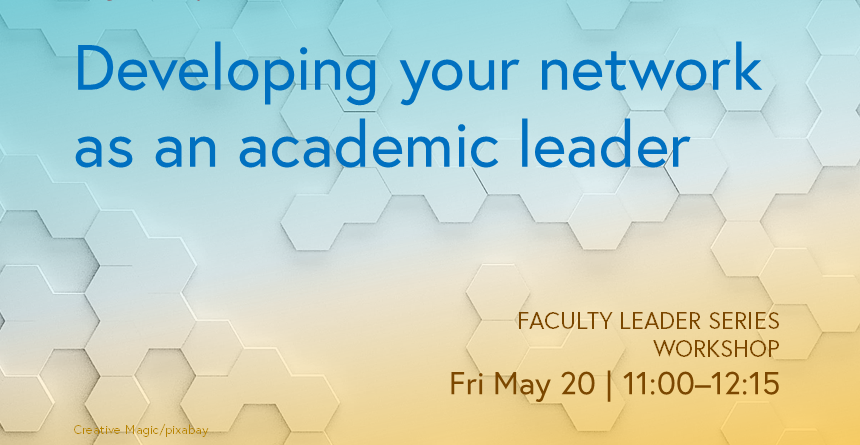
-
22SQ FLS: Developing your network as an academic leader - details
-
Faculty Leader Series Workshop
Developing your network as an academic leader
Fri, May 20 | 11:00–12:15 | Zoom link provided upon registration
Co-facilitated by David Green and Colette Hoption
When we assume an academic leadership position, it may be a given that our network of contacts will grow. Alongside the “significant network” (Roxå & Mårtensson, 2009) of trusted colleagues we have turned to for “backstage conversations” (Goffman, 1978) on sensitive topics – an awkward classroom experience, an erratic co-author – we now have a new panoply of key players who can help our programs, departments, and students thrive. Establishing, maintaining, and nurturing those wider relationships may require some proactive planning on our part.
In this session for faculty leaders and leaders-to-be, we invite you to consider your own significant network, and to reflect on how you have consciously or unconsciously shaped it to facilitate your various needs at particular stages in your career. We’ll then explore the kind of network you need now to fulfill your leadership role, which potential network members have changed in the two years of the pandemic, and what kinds of proactive network-building you can engage in to support your program or department, and to achieve your leadership goals.
» Registration is now closed.
2020–21
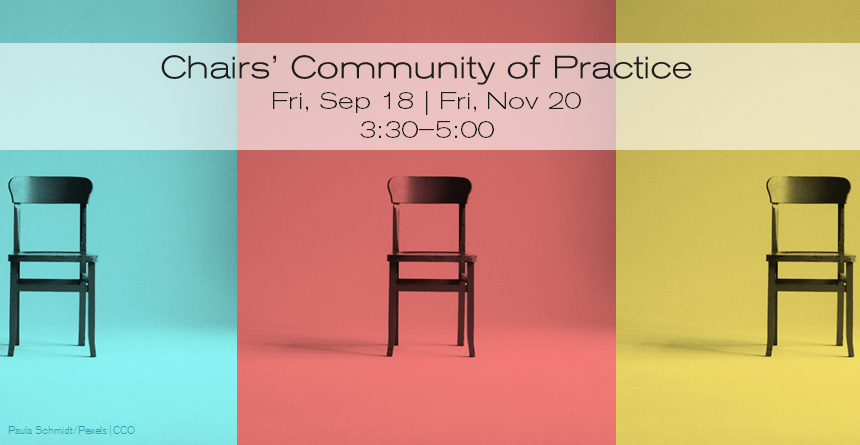
-
20FQ Chair Community of Practice - details
-
The Chairs' Community of Practice is open to all current department chairs and chairs-elect, plus program directors and directors-elect who have faculty reporting to them directly (for example for performance reviews).
We gather twice per quarter.
Further details and how to register are available on the Community of Practice page here.
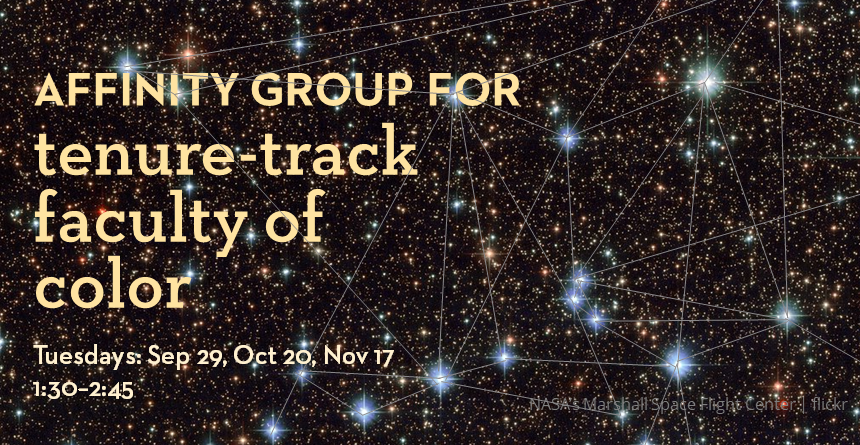
-
20FQ Affinity group for TT faculty of color - details
-
Affinity Group
Tuesdays: Sept 29, Oct 20, Nov 17 | 1:30–2:45 | Zoom link provided upon registration
Co-sponsored by the Office of Diversity and Inclusion (ODI)
Facilitated by Holly Slay Ferraro
The Center for Faculty Development and the Office of Diversity and Inclusion are excited to announce the continuation of an affinity group for tenure-track faculty of color. The purpose of convening the group is to provide a space for the collective exploration of the impact of race, power, and privilege on the academic life of colleagues immersed in teaching, scholarship, and service at pre-tenure stages of their careers.
Why create a group for tenure-track faculty of color? There are three primary reasons. First, the Task Force on Diversity and Inclusive Excellence report recommends boosting our capacity to retain talented minoritized faculty and facilitate professional development opportunities. Second, research on affinity groups indicates they enhance participants’ agency and optimism, while providing access to beneficial information and support. Third, from our own conversations with members of the Seattle University community, we know that faculty of color need a space where they can discuss their unique experiences in a supportive environment with peers who are similarly situated.
This professional development opportunity aims to empower tenure-track faculty of color to build community, share experiences, and pursue their academic life with more confidence and agency. We hope that this caucus process gives participants the space to determine “what solidarity could look like for... people of color committed to the work of social, racial, and gender justice” (Kad Smith, Compass Point) at Seattle University.
» Registration is now closed
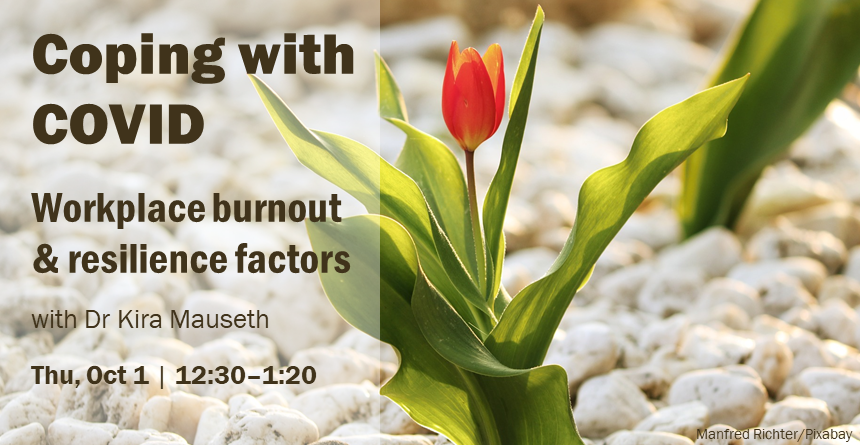
-
20FQ Coping with COVID - details
-
Campus talk
Coping with COVID: Workplace burnout and resilience factors
Thu, Oct 1 | 12:30–1:20 | Email faculty-development@seattleu.edu for the Zoom link
Co-sponsored by the College of Arts & Sciences and the Center for Faculty Development
Lecturer: Dr. Kira Mauseth, PhD | SU Department of Psychology
We are all impacted by COVID-19 in our daily lives in some ways that we may not recognize. This presentation will address the specifics about where we are on a larger scale with our Behavioral Health responses in the context of this natural disaster across the state, and how our brains and bodies function accordingly in this phase of disaster response and recovery. We will discuss common responses, symptoms, and challenges over the next few months that we will be facing, and what can be done to prevent burnout and increase resilience factors. Specific ideas will be provided about how to communicate and interact more effectively with others at home and in the workplace in the context of COVID-19 and increase our own sense of strength and resilience.
Kira Mauseth is a clinical psychologist who sees patients at Snohomish Psychology Associates, teaches as a Senior Instructor at Seattle University, and serves as co-lead for the Behavioral Health Strike Team for the WA State Department of Health. Her work and research interests focus on resilience and recovery from trauma as well as well as disaster behavioral health. She has worked abroad with survivors, refugees, and relief workers and in the US with first responders and health care workers. Dr. Mauseth also conducts trainings on disaster preparedness and resilience-building.
This session is being presented by the College of Arts & Sciences in co-sponsorship with the Center for Faculty Development. All faculty are invited to attend. No registration is required.
» Email faculty-development@seattleu.edu for the Zoom link
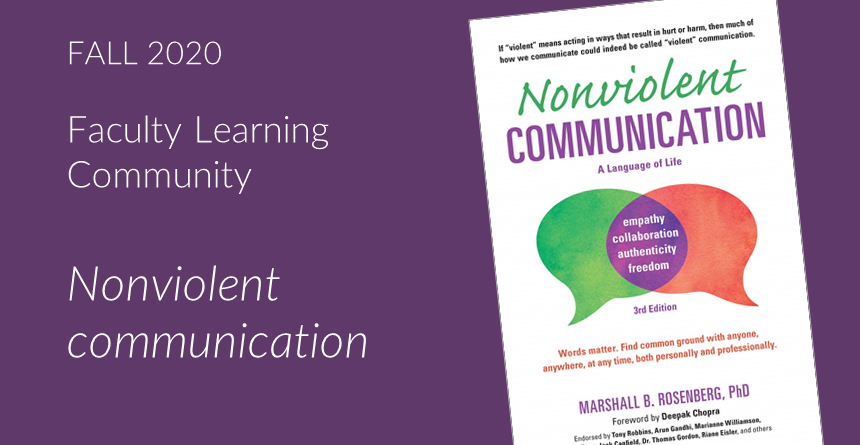
-
20FQ FLC Nonviolent communication - details
-
Faculty Learning Community
Nonviolent communication: A language of life
Co-sponsored by the Office of the Faculty Ombudsperson
How can we better connect with one another and understand our varied perspectives in an age of physical distance and remote working? In our computer-mediated reality, many of our in-person strategies for fostering community and understanding no longer function effectively, so new approaches are required. Here, Marshall Rosenberg’s model of nonviolent communication (NVC, also called “compassionate communication”) offers us ways of proceeding.
NVC is a four-stage process for engaging with one another to build trust through listening empathically and expressing ourselves honestly. Rooted in social justice, NVC prioritizes respect for differing worldviews. While the model appears straightforward, it requires practice and care – as well as asking us to unlearn our cultural norms in communication. The rewards can be significant, and when effectively used, this carefully developed communication method can lead to smoother and more productive teamwork.
In this three-session Learning Community, facilitated by McKenna Lang (Faculty Ombudsperson) and David Green (Center for Faculty Development), you’ll read through the book with colleagues and explore how we can practice and apply NVC in our current circumstances and beyond.
What's in it for you?
Over the three sessions, you'll learn how to:
- Distinguish the four NVC steps of observations, feelings, needs, and requests
- Identify how everyday language can inadvertently mask candid expression
- Express yourself more clearly using the model
- Apply the model as you listen to others
Who is is suited to?
This community is for any faculty member who wishes to develop their skills in communicating for understanding and finding ways to bring people together through compassionate yet candid dialogue.
Nonviolent communication is 219 pages long, and the reading will be split across the three sessions to be manageable for participants.
What are the dates?
The three dates in Fall Quarter are
- Mon, Oct 5 | 11:30–12:15 | Zoom link provided upon registration
- Mon, Oct 19 | 11:30–12:15 | Zoom link provided upon registration
- Mon, Nov 2 | 11:30–12:15 | Zoom link provided upon registration
Please register by 9:00am on Friday, September 25.
»Registration is now closed
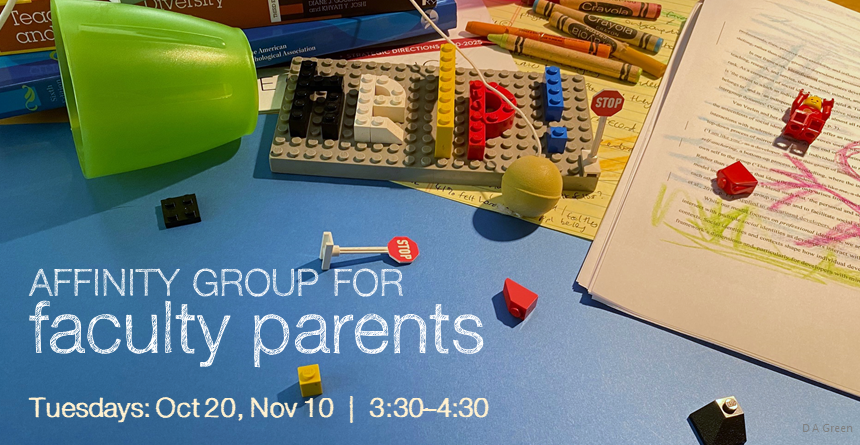
-
20FQ Affinity group for faculty parents - details
-
Affinity group
Tuesdays: Oct 20 and Nov 10 | 3:30–4:30 | Zoom link provided upon registration
*Note: The dates and time for this group have been changed since the original announcement per faculty feedback
Facilitated by Katherine Raichle
The Center for Faculty Development is launching an affinity group for faculty parents of school-age children. The purpose of this group is to provide a space to discuss and explore the unique challenges faced by faculty who have children in their care. The challenge of parenting while maintaining a rigorous schedule of teaching, research, and/or service to the university is not new. However, the benefits of finding a community of support around parenting has never been more urgent. We face unprecedented demands of caregiving and schooling while balancing the work of our academic lives during the COVID-19 pandemic.
Why an affinity group?
The psychological benefits of convening groups of people around common identities and experiences are well known. Research on affinity groups, in particular, has shown that they enhance agency and optimism, while also providing access to beneficial information and support.
Aims of the group
At its most basic level, we hope that this group offers a space where you can feel less isolated in your experience. We hope to foster a community of support amongst faculty parents, where they can share experiences, offer suggestions, and explore how to navigate these extremely challenging times.
»Registration is now closed
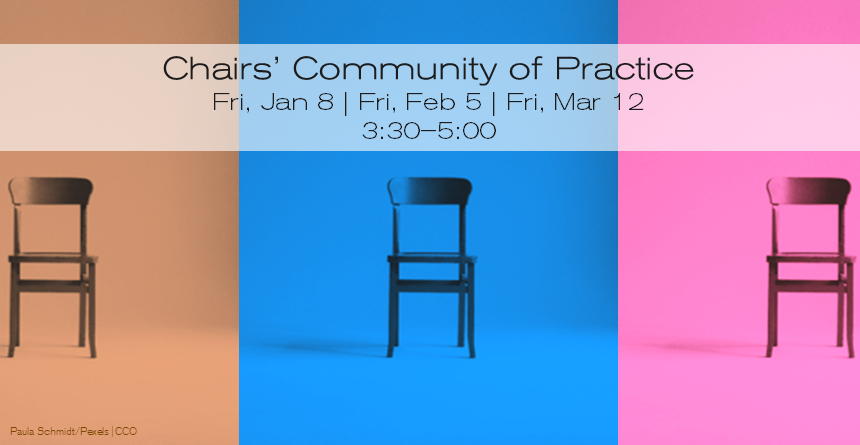
-
21WQ Chairs Community of Practice - details
-
The Chairs' Community of Practice is open to all current department chairs and chairs-elect, plus program directors and directors-elect who have faculty reporting to them directly (for example for performance reviews).
We gather twice per quarter.
Further details and how to register are available on the Community of Practice page here.
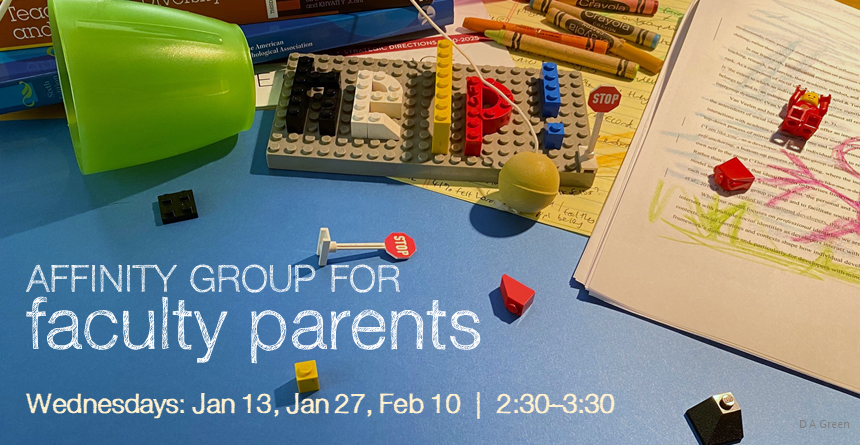
-
21WQ Affinity group for faculty parents - details
-
Affinity group
Wednesdays: Jan 13, Jan 27, and Feb 10 *extra date added: Mar 3* | 2:30–3:30 | Zoom link provided upon registration
Facilitated by Katherine Raichle
The Center for Faculty Development is launching an affinity group for faculty parents of school-age children. The purpose of this group is to provide a space to discuss and explore the unique challenges faced by faculty who have children in their care. The challenge of parenting while maintaining a rigorous schedule of teaching, research, and/or service to the university is not new. However, the benefits of finding a community of support around parenting has never been more urgent. We face unprecedented demands of caregiving and schooling while balancing the work of our academic lives during the COVID-19 pandemic.
Why an affinity group?
The psychological benefits of convening groups of people around common identities and experiences are well known. Research on affinity groups, in particular, has shown that they enhance agency and optimism, while also providing access to beneficial information and support.
Aims of the group
At its most basic level, we hope that this group offers a space where you can feel less isolated in your experience. We hope to foster a community of support amongst faculty parents, where they can share experiences, offer suggestions, and explore how to navigate these extremely challenging times.
» Register
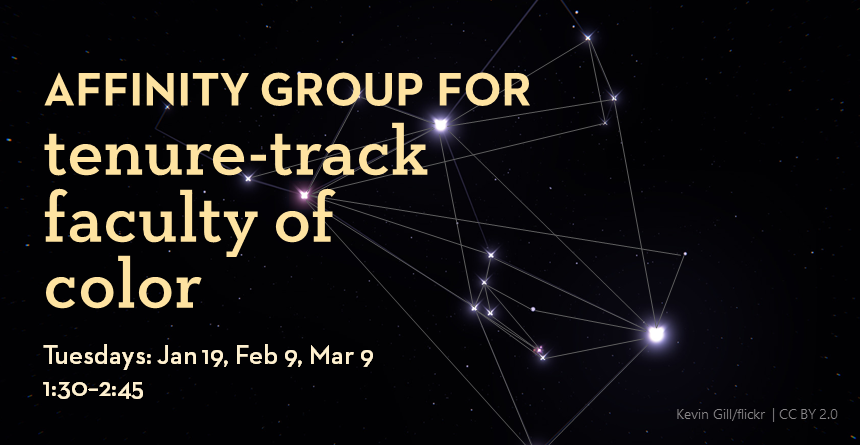
-
21WQ Affinity group for TT faculty of color - details
-
Affinity Group
Tuesdays: Jan 19, Feb 9, Mar 9 | 1:30–2:45 | Zoom link provided upon registration
Co-sponsored by the Office of Diversity and Inclusion (ODI)
Facilitated by Holly Slay Ferraro
The Center for Faculty Development and the Office of Diversity and Inclusion are excited to announce the continuation of an affinity group for tenure-track faculty of color. The purpose of convening the group is to provide a space for the collective exploration of the impact of race, power, and privilege on the academic life of colleagues immersed in teaching, scholarship, and service at pre-tenure stages of their careers.
Why create a group for tenure-track faculty of color? There are three primary reasons. First, the Task Force on Diversity and Inclusive Excellence report recommends boosting our capacity to retain talented minoritized faculty and facilitate professional development opportunities. Second, research on affinity groups indicates they enhance participants’ agency and optimism, while providing access to beneficial information and support. Third, from our own conversations with members of the Seattle University community, we know that faculty of color need a space where they can discuss their unique experiences in a supportive environment with peers who are similarly situated.
This professional development opportunity aims to empower tenure-track faculty of color to build community, share experiences, and pursue their academic life with more confidence and agency. We hope that this caucus process gives participants the space to determine “what solidarity could look like for... people of color committed to the work of social, racial, and gender justice” (Kad Smith, Compass Point) at Seattle University.
» Register
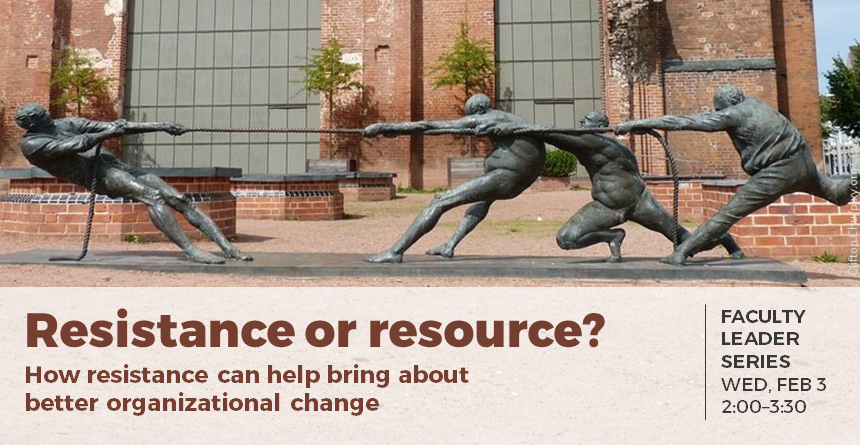
-
21WQ FLS: Resistance or resource? - details
-
Faculty Leader Series* | Afternoon Workshop
Resistance or resource? How resistance can help bring about better organizational change
Wed, Feb 3 | 2:00–3:30 | Zoom link provided upon registration
Facilitated by Holly Slay Ferraro
Higher education is undergoing what some might describe as cataclysmic change. As leaders, we see that there is a need for change and stakeholders often balk at changes we propose. Resistance causes friction and slows down changes that seem important and, perhaps, inevitable. So, what can we do about resistance? How can leaders access the power of resistance to create better solutions to organizational problems? In this workshop, we examine management research suggesting that resistance can be a resource for, rather than a drain on, change efforts. We will explore how to develop our leadership skills and invite resistance to rediscover purpose and facilitate change.
*Workshops in the Faculty Leader Series are open to faculty who are department chairs, program directors, and faculty associate/assistant deans. The registration form for this session is separate from other Center events.
Optional follow-up session
Attendees who would like to check back in on this topic can do so in an hour-long discussion and debrief.
Wed, Feb 17 | 2:00–3:00 | Zoom link provided following initial workshop
» Registration is now closed.
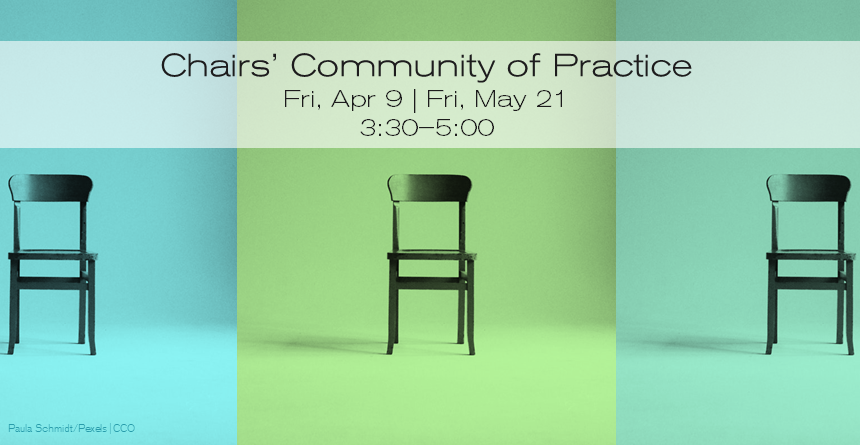
-
21SQ Chairs Community of Practice - details
-
The Chairs' Community of Practice is open to all current department chairs and chairs-elect, plus program directors and directors-elect who have faculty reporting to them directly (for example for performance reviews).
We gather twice per quarter.
Further details and how to register are available on the Community of Practice page here.
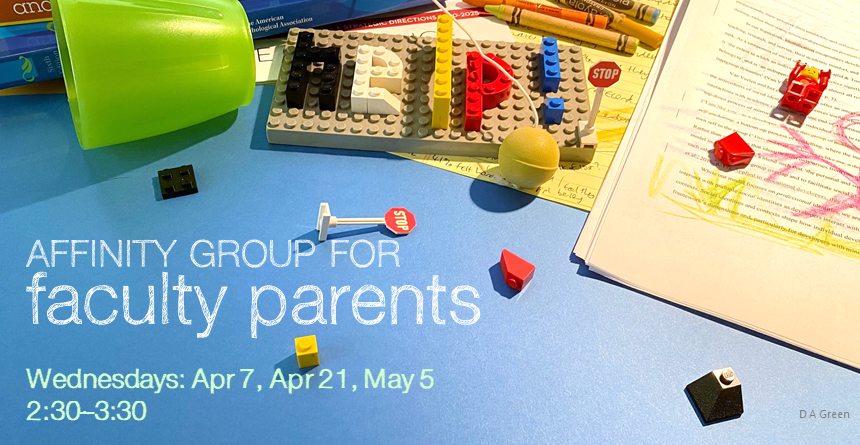
-
21SQ Affinity group for faculty parents - details
-
Affinity group
Wednesdays: Apr 7, Apr 21, and May 5 | 2:30–3:30 | Zoom link provided upon registration
Facilitated by Katherine Raichle
The Center for Faculty Development is launching an affinity group for faculty parents of school-age children. The purpose of this group is to provide a space to discuss and explore the unique challenges faced by faculty who have children in their care. The challenge of parenting while maintaining a rigorous schedule of teaching, research, and/or service to the university is not new. However, the benefits of finding a community of support around parenting has never been more urgent. We face unprecedented demands of caregiving and schooling while balancing the work of our academic lives during the COVID-19 pandemic.
Why an affinity group?
The psychological benefits of convening groups of people around common identities and experiences are well known. Research on affinity groups, in particular, has shown that they enhance agency and optimism, while also providing access to beneficial information and support.
Aims of the group
At its most basic level, we hope that this group offers a space where you can feel less isolated in your experience. We hope to foster a community of support amongst faculty parents, where they can share experiences, offer suggestions, and explore how to navigate these extremely challenging times.
» Registration is now closed.
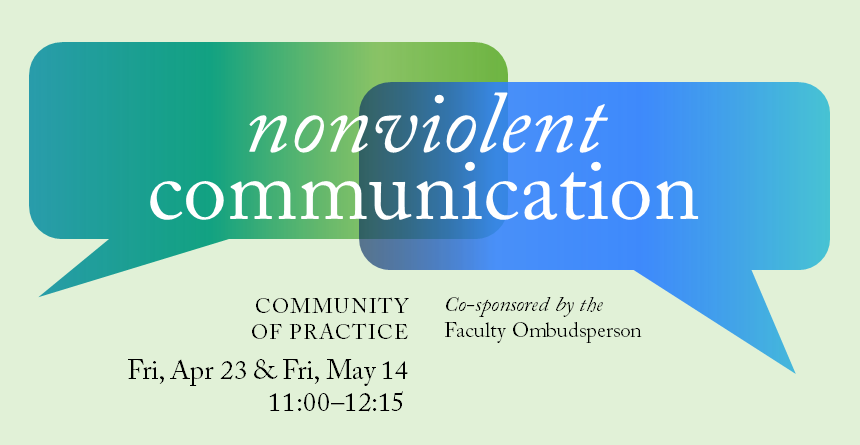
-
21SQ Nonviolent communication Community of Practice - details
-
Community of Practice
Nonviolent communication
Fridays: April 23 and May 14 | 11:00–12:15 | Zoom link provided upon registration
Co-sponsored by the Faculty Ombudsperson
Marshall Rosenberg's model of nonviolent communication (NVC, also called "compassionate communication") offers us ways of proceeding and engaging with one another that is both empathic and authentic. NVC encourages us to listen intently to understand others' perspectives and to express ourselves genuinely so that we can reach common understanding from a position of trust.
This Community of Practice provides an opportunity for any faculty who have read Rosenberg's book, Nonviolent communication: A language of life, to join us and explore how we put the model into practice in our everyday work and our home lives.
While the model appears straightforward, it requires practice and care - as well as asking us to unlearn our cultural norms in communication. The rewards can be significant, and when effectively used, this carefully developed communication method can lead to smoother and more productive teamwork.
This Community of Practice is co-facilitated by McKenna Lang (Faculty Ombudsperson) and David Green (Center for Faculty Development).
» Registration is now closed.
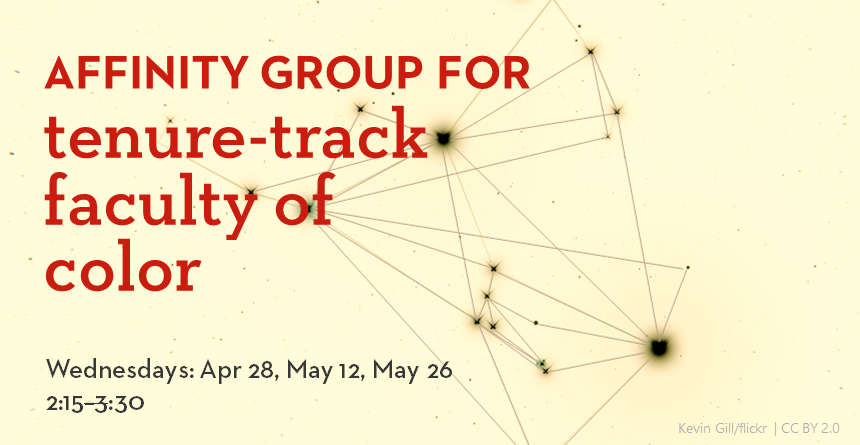
-
21SQ Affinity group for tenure-track faculty of color - details
-
Affinity Group
Wednesdays: Apr 28, May 12, May 26 | 2:15–3:30 | Zoom link provided upon registration
Co-sponsored by the Office of Diversity and Inclusion (ODI)
Facilitated by Holly Slay Ferraro
The Center for Faculty Development and the Office of Diversity and Inclusion are excited to announce the continuation of an affinity group for tenure-track faculty of color. The purpose of convening the group is to provide a space for the collective exploration of the impact of race, power, and privilege on the academic life of colleagues immersed in teaching, scholarship, and service at pre-tenure stages of their careers.
Why create a group for tenure-track faculty of color? There are three primary reasons. First, the Task Force on Diversity and Inclusive Excellence report recommends boosting our capacity to retain talented minoritized faculty and facilitate professional development opportunities. Second, research on affinity groups indicates they enhance participants’ agency and optimism, while providing access to beneficial information and support. Third, from our own conversations with members of the Seattle University community, we know that faculty of color need a space where they can discuss their unique experiences in a supportive environment with peers who are similarly situated.
This professional development opportunity aims to empower tenure-track faculty of color to build community, share experiences, and pursue their academic life with more confidence and agency. We hope that this caucus process gives participants the space to determine “what solidarity could look like for... people of color committed to the work of social, racial, and gender justice” (Kad Smith, Compass Point) at Seattle University.
» Registration is now closed.
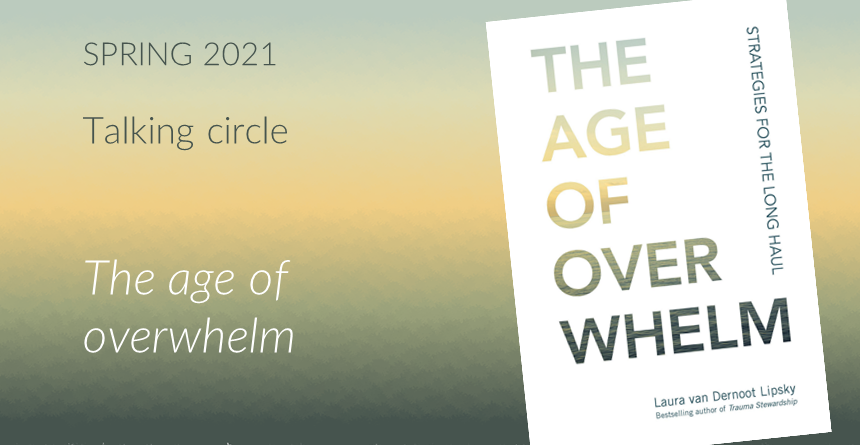
-
21SQ The age of overwhelm - details
-
Talking Circle
Navigating overwhelm in uncertain times
Fri, May 7 | 12:30–2:30 | Zoom link provided upon registration
Co-sponsored by the Faculty Ombudsperson
Circle Keepers: McKenna Lang (Faculty Ombudsperson) and Pamela Taylor (College of Education)
A significant challenge of being overwhelmed individually, regardless of the cause, is how hard it can be to have or maintain awareness that you are actually overwhelmed...The continuum of overwhelm can range from feeling surges of overwhelm occasionally (after which you reset and move on) to spending years trying to keep your head above water.
–Laura van Dernoot Lipsky
In her book The age of overwhelm: Strategies for the long haul, Laura van Dernoot Lipsky explores the nature and causes of the idea of "overwhelm" as an individual and collective premise under which so many of us operate. She builds on her previous trauma work to identify the complex external and internal forces of tasks and expectations that pervade our society. Her ideas resonate in these uncertain times. Critically, van Dernoot Lipsky also envisions a pathway beyond depletion to help manage the overwhelm. These strategies can help de-escalate conflict. Please join us in a traditional talking circle as we explore ideas on overwhelm and strategies to move forward. The intention of the talking circle is to act as a primer for thinking about how to manage being overwhelmed during these uncertain times. We will draw upon recommendations and strategies from the work of van Dernoot Lipsky. The book is not a prerequisite for participation but learners may find it to be a valuable resource. All are welcome.
» Registration is now closed.
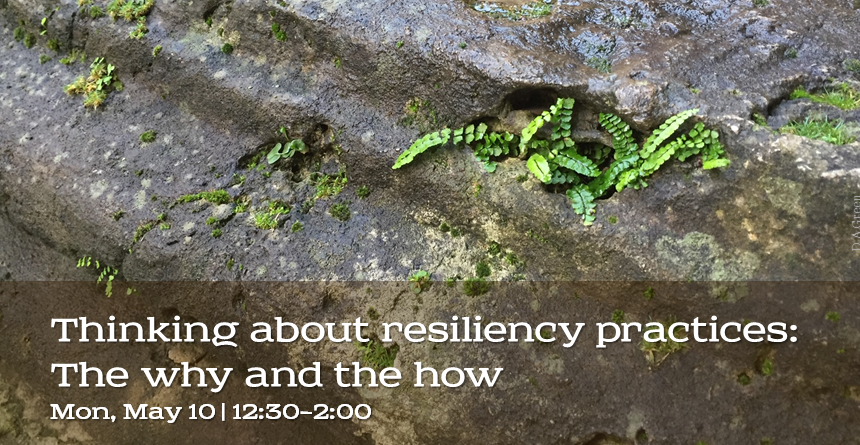
-
21SQ Thinking about resiliency practices - details
-
Lunchtime Workshop
Thinking about resiliency practices: The why and the how
Mon, May 10 | 12:30–2:00 | Zoom link provided upon registration
Co-sponsored by the Faculty Ombudsperson
Facilitated by Heather DePuydt (College of Nursing) and McKenna Lang (Faculty Ombudsperson)
Every morning we are born again. What we do today is what matters most.
–The Buddha
Resiliency derives from Latin, meaning “to spring back,” and Masten (2014) describes it as “The capacity of a dynamic system to adapt successfully to disturbances that threaten system function, viability, or development.” Resilience is related to change. Much of the important work on resiliency is anchored in trauma-informed care research. This research shows us that there is hope and that people may find strategies to move forward successfully despite the profound implications of stress and trauma. Resiliency practices in classroom settings can be especially valuable, supported by the growing literature on the value of conflict resilience. Please join us for this guided workshop as we look at some of the roots of resiliency practices and identify some resiliency resources. All are welcome.
» Registration is now closed.
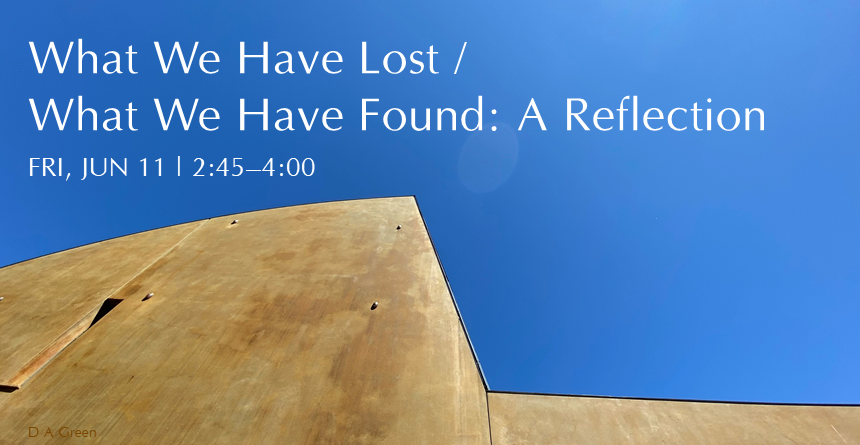
-
21SQ What we have lost/found - details
-
A memorial and a reflection
Fri, Jun 11 | 2:45–4:00 | Zoom link provided upon registration
Co-sponsored by the Consortium for Interdisciplinary Scholars and the Center for Jesuit Education
The Consortium for Interdisciplinary Scholars, Center for Jesuit Education, and Center for Faculty Development invite you to participate in co-creating an end-of-year Memorial to witness the past year with each other. This is an invitation to re-encounter each other in our whole personhood as we begin to imagine re-entering the physical space of the campus together again in the Fall. The link to the Memorial will be sent to you on registration.
The function of this Memorial is to create tangible manifestations of the past year’s emotional impact whether experienced through grief, rage, tenderness, humor, joy, confusion, fear, etc. Thus, its function is also for us all to enter into a conversation about the meaning of our memories, to evoke, and to make space for the creation of collective meaning. You might think of this Memorial, entitled "What We Have Lost/What We Have Found" as a field – both material and discursive – in which we encounter and negotiate not only our shared experiences but also our sites of difference and division. This is not a space to resolve or solve but a space for collective witnessing.In short, we invite you to actively participate in this space by posting a representation of what you have lost and found – or your desolations and consolations – from this past year. This could be an image, or text (even just one word), or a sound file, etc. And this can be a representation of any part of your life (not just of your life in the university). All posts will be anonymous unless you elect to add your name to yours. All you need to do is click on the red + sign on the bottom right corner of the Padlet to add your post.
We also invite you to visit this space (often), even if just to view, read, listen, watch.
On Friday, June 11 from 2:45–4:00, we will hold a session, co-facilitated by our three organizations, where people can come to reflect on the Memorial together. If you are able to join us on the 11th, please register at this link. We will then send you both the Zoom link and the link to the Memorial itself so that you can add your own contributions.» Registration is now closed.
2019–20
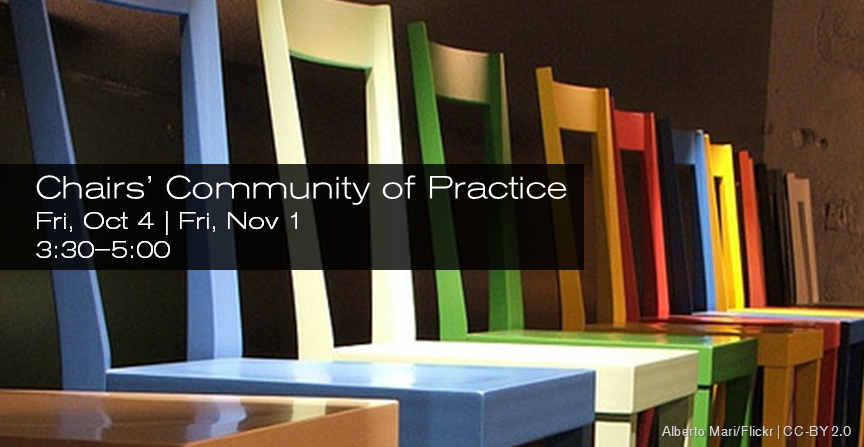
-
19FQ Chair Community of Practice - details
-
The Chairs' Community of Practice is open to all current department chairs and chairs-elect, plus program directors and directors-elect who have faculty reporting to them directly (for example for performance reviews).
We gather twice per quarter.
Further details and how to register are available on the Community of Practice page here.
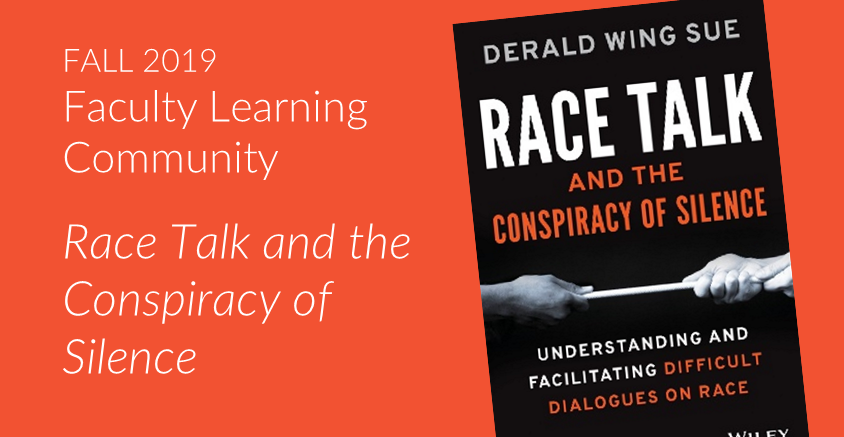
-
19FQ Race Talk and the Conspiracy of Silence - details
-
Faculty Learning Community
Co-Sponsored by the Office of Diversity and Inclusion
Remember that day when you attempted to address race in your course, faculty or staff meeting and you wish you hadn’t? Derald Wing Sue’s Race Talk and the Conspiracy of Silence: Understanding and Facilitating Difficult Dialogues on Race provides a guide for those who find initiating and participating in discussions about race difficult.
In this four-session Learning Community facilitated by Holly Slay Ferraro (Center for Faculty Development), you’ll read through the book with colleagues and explore the nature of race talk, constraints placed on race talk, and strategies for engaging in race talk more successfully.
What's in it for you?
Over the four sessions, you'll learn how to:
- Articulate what ideologies impede race talk (such as colorblindness)
- Identify conditions for having honest race talk
- Become an agent for change (breaking through unproductive race talk)
- Facilitate race talk using tested strategies
Who is it suited to?
This community is for any faculty member who wishes to develop their skills for leading and participating in potentially difficult conversations about race.
Race Talk and the Conspiracy of Silence is 274 pages long, and the reading will be split across the four sessions to be manageable for participants.
What are the dates?
The four dates in Fall Quarter are:
- Tues, Oct 22 | 1:30–2:45 | HUNT 150
- Tues, Nov 5 | 1:30–2:45 | Wismer Room (LOYA 400)
- Tues, Nov 19 | 1:30–2:45 | Wismer Room (LOYA 400)
- Tues, Dec 3 | 1:30–2:45 | Wismer Room (LOYA 400)
» Registration is now closed
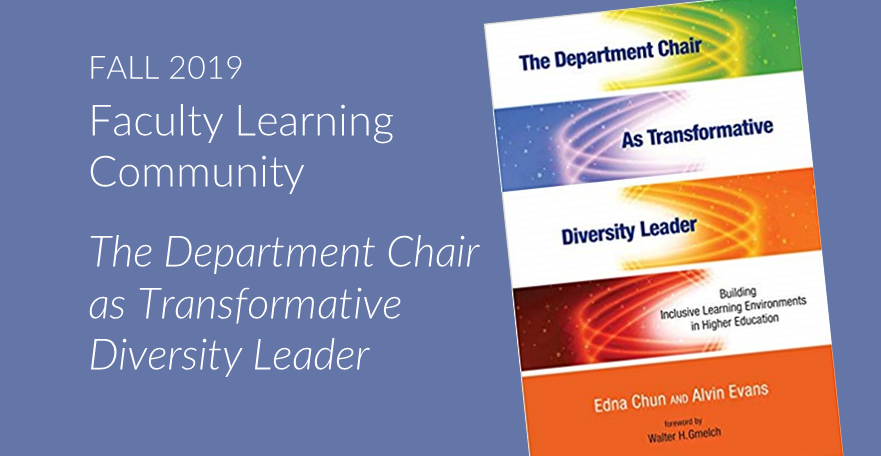
-
19FQ Department Chair as Transformative Diversity Leader - details
-
Faculty Learning Community
Co-Sponsored by the Office of Diversity and Inclusion
Are you interested in seeking concrete tools and strategies for successfully implementing diversity in your department or program? Edna Chun and Alvin Evans’s The Department Chair as Transformative Diversity Leader: Building Inclusive Learning Environments in Higher Education provides practical, research-based approaches representative of best practices from across the United States to achieve this result.
In this four-session Learning Community, facilitated by David Green (Center for Faculty Development), you'll work your way through the chapters of the book so that you are better prepared to lead other faculty in advancing diversity in multiple areas, including tenure and promotion, curricular change, student learning outcomes, departmental climate, and the representation of a diverse faculty and staff.
What's in it for you?
Over the four sessions, you'll learn how to:
- Implement a conceptual framework for diversity transformation
- Develop strategies for attaining consensus on a diversity agenda
- Develop strategies for overcoming environmental hurdles and navigating the academic infrastructure
- Recruit and retain a diverse faculty
- Enhance diversity learning outcomes and student identity development
- Develop a department or program diversity strategic plan
Who is it suited to?
This community is primarily for department chairs and program directors, but other faculty member who are interested in promoting an inclusive learning environment would also benefit from this learning community.
The Department Chair as Transformative Diversity Leader is 181 pages long, and reading will be split across the four sessions to be manageable for participants.
What are the dates?
The four dates in Fall Quarter are:
Fri, Oct 25 | 2:00–3:15 | Wismer Room (LOYA 400)
Fri, Nov 8 | 2:00–3:15 | Wismer Room (LOYA 400)
Fri, Nov 22 | 2:00–3:15 | Wismer Room (LOYA 400)
Fri, Dec 6 | 12:45–1:50 | Jolly Lounge (STCN 122)» Registration is now closed
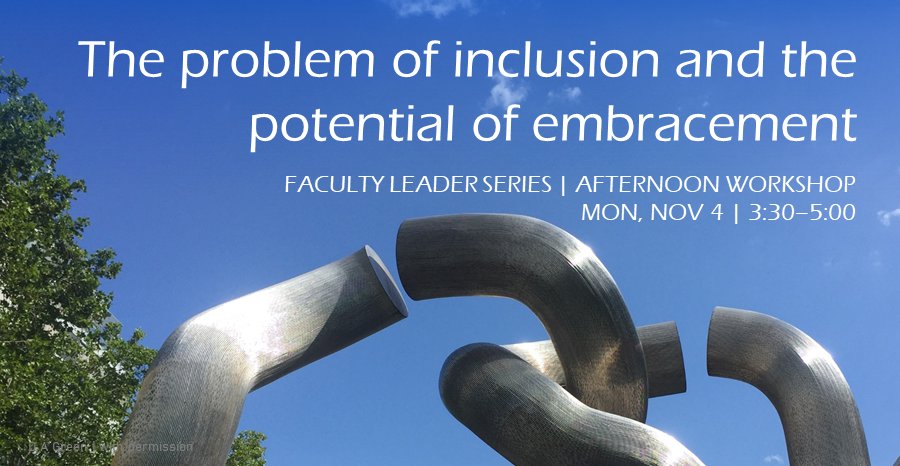
-
19FQ The problem of inclusion and potential of embracement - details
-
Faculty Leader Series* | Afternoon Workshop
Co-sponsored by the Office of Diversity and Inclusion
Mon, Nov 4 | 3:30–5:00 | HUNT 110 | Appetizers, coffee, and tea provided
Facilitated by Holly Slay FerraroDiscussions of inclusion abound on our campus, but what does this mean for department chairs and faculty leaders?
In this session, we’ll define inclusion as it is discussed in the literature and learn why “inclusive” procedures, policies, and practices at the organizational level frequently fail to foster the experience of inclusion at the individual level. Specifically, we’ll discuss four assumptions that undergird inclusion efforts and offer a new approach – embracement – that conceives of relationships as crucial to the experience of inclusion.
We’ll end the session by discussing practical steps chairs can take to foster inclusion and embracement – especially for faculty who are frequently marginalized or stigmatized within the Academy.
*Workshops in the Faculty Leader Series are open to faculty who are department chairs, program directors with faculty reporting to them directly, and faculty associate/assistant deans. The registration form for this session is separate from other Center events.
Optional Follow-up Session
Attendees who would like to check back in on this topic can do so in an hour-long discussion and debrief.
Mon, Nov 18 | 3:30–4:30 | Wismer Room (LOYA 400) | Drinks and appetizers provided
» Registration is now closed.
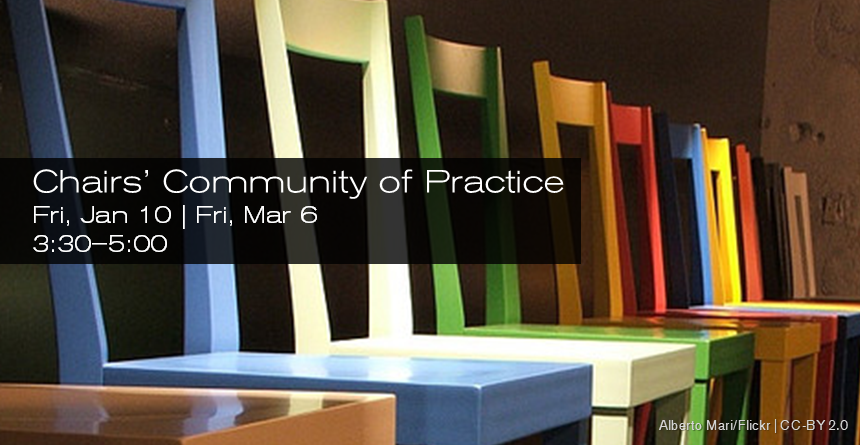
-
20WQ Chair Community of practice - details
-
The Chairs' Community of Practice is open to all current department chairs and chairs-elect, plus program directors and directors-elect who have faculty reporting to them directly (for example for performance reviews).
We gather twice per quarter.
Further details and how to register are available on the Community of Practice page here.
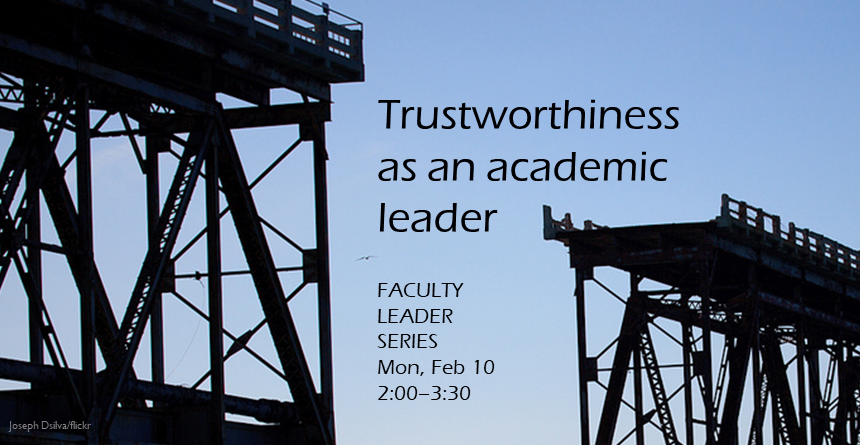
-
20WQ Trustworthiness as an academic leader - details
-
Faculty Leader Series* | Afternoon Workshop
Facilitated by David Green
Mon, Feb 10 | 2:00–3:30 | STCN 210 | Appetizers, coffee, and tea provided
As faculty, we have been trained to be skeptics, which can influence our response to academic leaders: We may automatically ask “why?” questions and challenge the premise on which decisions or actions are based. So when we step into leadership roles ourselves, we shouldn’t be surprised to find that trust from our faculty colleagues isn’t immediately forthcoming.
At the same time, faculty discourse around university administration as “the dark side” means we can expect senior administrators to feel a degree of wariness toward us, too. Academic leaders can therefore find themselves in that uneasy “contact zone” between faculty and administration – a tricky, yet potentially productive and creative position to occupy.
How then do we demonstrate our trustworthiness as leaders such that our colleagues come to trust us? This question has arisen repeatedly in conversations with chairs and directors over the years, and in this session, we respond with a credibility framework – based on research in a range of fields – that can be adapted to thinking about how best to lead academic colleagues in your own unique context, as well as how to work productively toward trust with senior administrators.
*Workshops in the Faculty Leader Series are open to faculty who are department chairs, program directors with faculty reporting to them directly, and faculty associate/assistant deans. The registration form for this session is separate from other Center events.
»Registration is now closed
Optional Follow-up Session
Attendees who would like to check back in on this topic can do so in a later discussion and debrief.
Mon, Mar 9 | 2:00–3:00 | CASY 525 | Coffee/tea provided
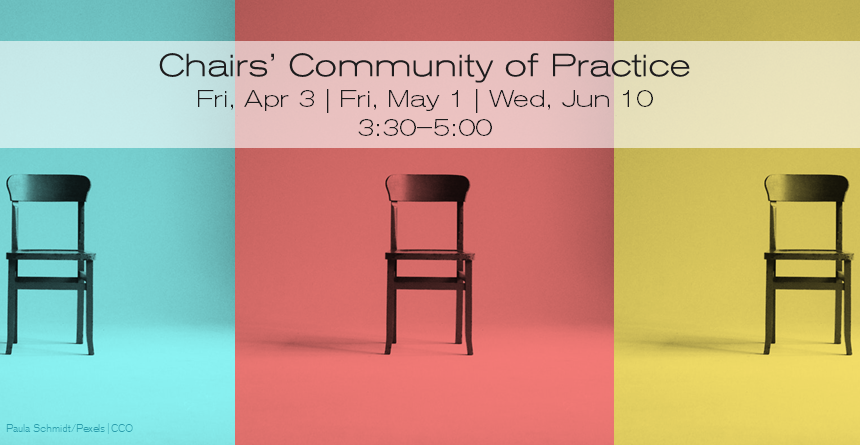
-
20SQ Chair Community of Practice - details
-
The Chairs' Community of Practice is open to all current department chairs and chairs-elect, plus program directors and directors-elect who have faculty reporting to them directly (for example for performance reviews).
We gather twice per quarter.
Further details and how to register are available on the Community of Practice page here.
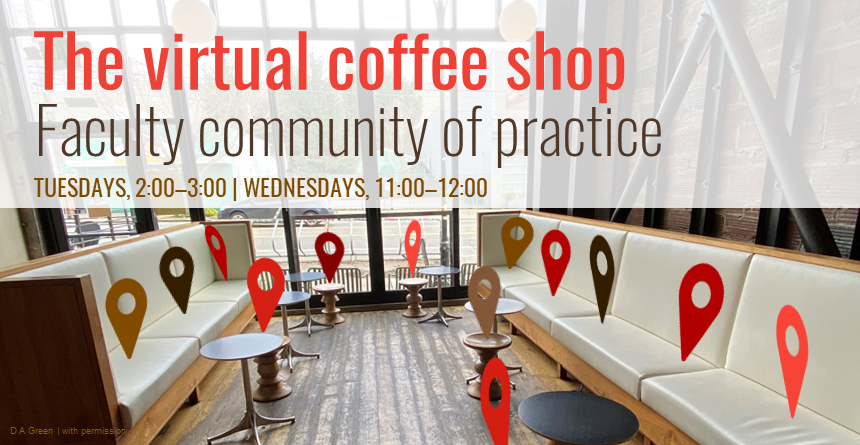
-
20SQ Virtual coffee shop - details
-
Community of practice
Facilitated by Holly Slay Ferraro and David Green
Tuesdays | 2:00–3:00 | Zoom link will be provided upon registration
Wednesdays | 11:00–12:00 | Zoom link will be provided upon registration
Come together with fellow faculty as a “community of practice” for small-group conversation about whatever’s on your mind.
Maybe you want to talk about self-care and health or life–work balance while isolated at home; perhaps you’re interested in sharing new work routines you’ve developed or how you’re supporting your students to do the same; or maybe you simply want to pick up some binge-watching or reading-for-pleasure recommendations to help you wind down at the end of the day.
A community of practice (Wenger, 1998) is an informal gathering of individuals in similar roles who are spread out across an organization, rather than in frequent contact with one another. We’ve been using this model with department chairs since 2011; now that we are less frequently in contact due to the COVID-19 crisis, the model now applies to faculty in general, too.
In the community of practice model, you – as participants – decide what topics are important to you right now, and we organize you into small groups based on those interests.
The Center for Faculty Development's role is simply to facilitate the process and to collate any notes for distribution – if you decide to keep any.
We’ll run a few of these sessions and then get your feedback on whether they’re working for you. If they are, then we’ll keep them going for the rest of the quarter. You’ll need to register to receive the Zoom link, but you don’t have to register for every session.
»Registration is now closed
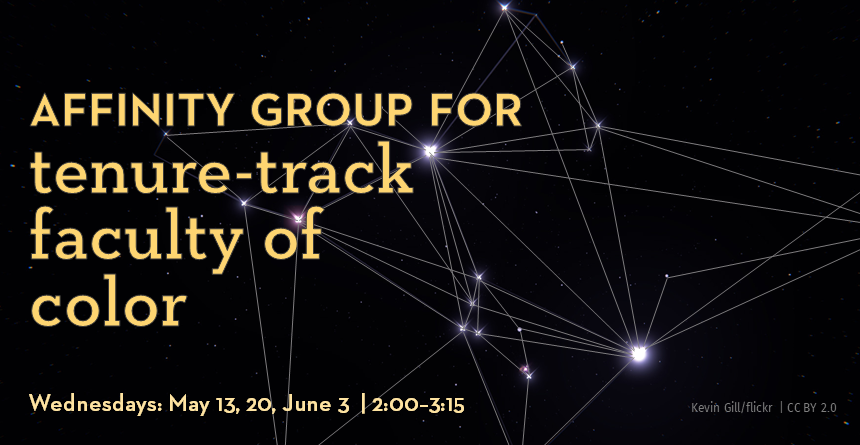
-
20SQ Tenure-track faculty of color affinity group - details
-
Affinity group
Co-sponsored by the Office of Diversity and Inclusion, the Center for Faculty Development, and the Wismer Professor for Gender and Diversity Studies
Facilitated by Holly Slay Ferraro
Wednesdays: May 13, May 20, June 3 | 2:00–3:15 | Zoom link will be sent upon registration
The Center for Faculty Development, the Office of Diversity and Inclusion, and the Wismer Professor for Gender and Diversity Studies are excited to announce the launch of an affinity group for tenure-track faculty of color. The purpose of convening the group is to provide a space for the collective exploration of the impact of race, power and privilege on the academic life of colleagues immersed in teaching, scholarship, and service at pre-tenure stages of their careers.
Why create a group for tenure-track faculty of color? There are three primary reasons. First, the Task Force on Diversity and Inclusive Excellence report recommends boosting our capacity to retain talented minoritized faculty and facilitate professional development opportunities. Second, research on affinity groups indicates they enhance participants’ agency and optimism, while providing access to beneficial information and support. Third, from our own conversations with members of the Seattle University community, we know that faculty of color need a space where they can discuss their unique experiences in a supportive environment with peers who are similarly situated.
This professional development opportunity aims to empower tenure-track faculty of color to build community, share experiences, and pursue their academic life with more confidence and agency. We hope that this caucus process gives participants the space to determine “what solidarity could look like for...as people of color committed to the work of social, racial, and gender justice” (Kad Smith, Compass Point) at Seattle University.
»Registration is now closed
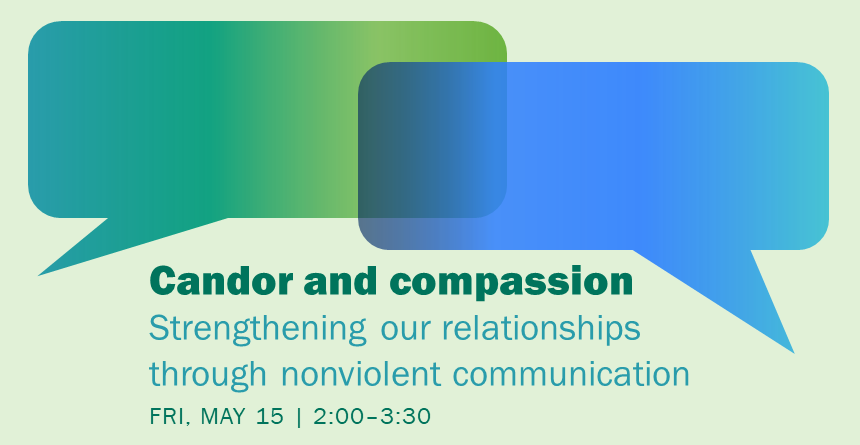
-
20SQ Candor and compassion - details
-
Virtual Workshop
Co-sponsored by the Faculty Ombudsperson, the Center for Faculty Development, and the Center for Community Engagement (CCE)
Facilitated by David Green and C. McKenna Lang
Fri, May 15 | 2:00–3:30 | Zoom link will be sent upon registration
The arrival of COVID-19 presents us with unprecedented stresses that tax our cognitive capacities and flexibility – just at the point when we need them the most. Faculty and department chairs are reporting that this global crisis means more emailing, more rapid communications than ever done before, and more virtual meetings.
Our channels of communication have necessarily shifted and now bring with them new stressors. Research tells us that email has a negativity bias: if we think our message is positive, it’s received as neutral; if we think it’s neutral, it’s read as negative (Goleman 2013). Meanwhile virtual meetings sap our energies and concentration more swiftly than happens in person (Jiang, 2020).
Under these circumstances, it’s not surprising that we may be experiencing greater communication challenges. At the same time, this transformational moment may be providing an opportunity to connect in new ways and to acknowledge our shared humanness.
So how do we resolve our inevitable miscommunications? How do we connect with colleagues compassionately to deepen understanding and move forward constructively? How do we bridge differences to increase learning and respect?
In this session, co-sponsored by the Faculty Ombudsperson, Center for Faculty Development, and Center for Community Engagement, we’ll experiment with using Marshall Rosenberg’s model of nonviolent communication (also called “compassionate communication”) – a four-stage process for engaging with one another to rebuild trust through listening empathically and expressing ourselves honestly. Rooted in social justice, NVC prioritizes respect for differing worldviews. While the model appears straightforward, it requires practice and care – as well as asking us to unlearn our cultural norms in communication. The rewards can be significant, and when effectively used, this carefully developed communication method can lead to smoother and more productive teamwork.
»Registration is now closed
Optional follow-up session
Attendees who would like to check back in on this topic can do so in a later discussion and debrief.
Fri, May 29 | 2:00–3:00 | Zoom
2018–19
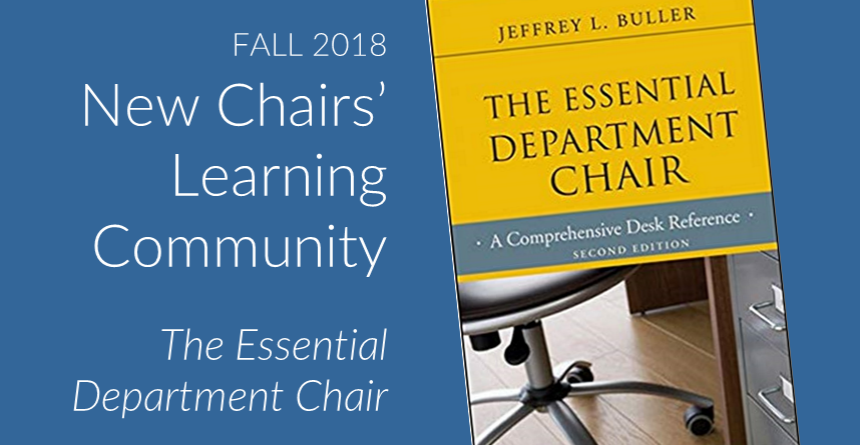
-
18FQ FLC 1 - The Essential Department Chair - details
-
Faculty Learning Community
The Essential Department Chair
In this four-session Learning Community facilitated by Jacquelyn Miller (Center for Faculty Development) over fall quarter, invited participants – all department chairs and program directors who have started in their roles in the last two academic years – will work their way through the chapters in the book so that they feel better prepared to fulfill their academic leadership roles and thrive.
As this Faculty Learning Community has a limited pool of participants, registration occurs outside our usual processes.
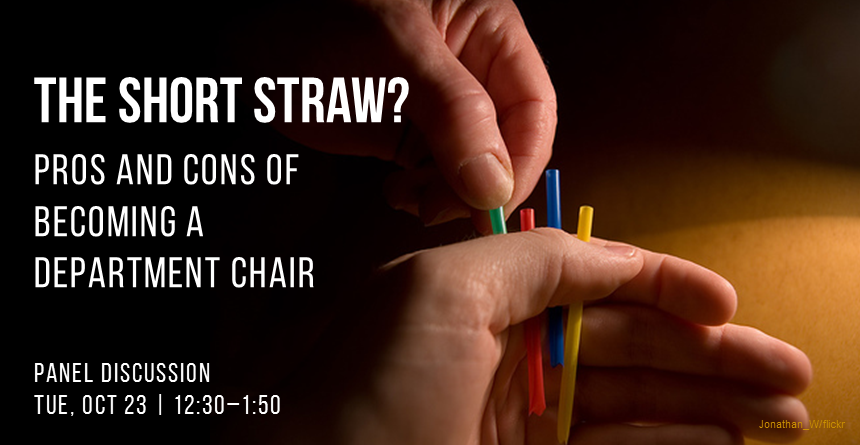
-
18FQ The Short Straw - details
-
Lunchtime Panel Discussion
The short straw? Pros and cons of becoming a department chair
Tue, Oct 23 | 12:30–2:00 | CHDN 143 [Note change of room from original announcement] | Lunch provided
Facilitated by Jacquelyn MillerMight your future involve a stint as a department chair or a program director? If so, do you look forward to taking on this role or dread it like the plague? In this frank Q&A discussion, you’ll meet a panel of former and current chairs and directors to discover what these roles entail and how they can contribute to the smooth functioning of your area and the university. Learn about some of the possible pitfalls and hidden pleasures of chairing to help you figure out whether, for you, this really would be the short straw or a rewarding opportunity.
The session also includes a Q&A in a confidential environment.
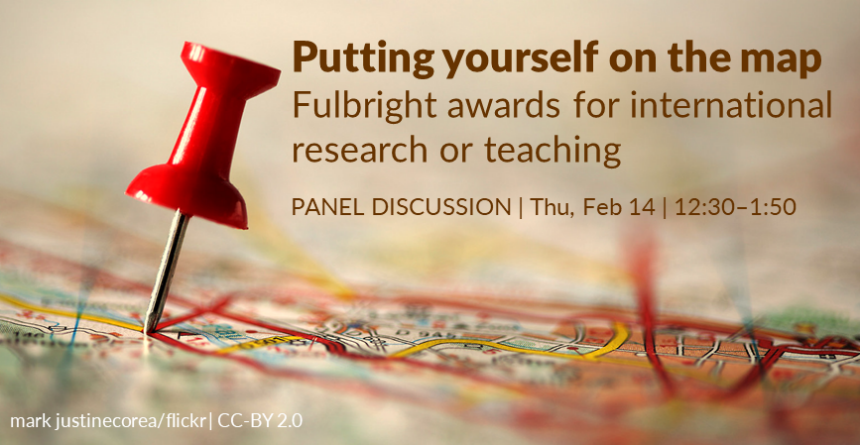
-
19WQ Fulbright - Putting yourself on the map - details
-
Lunchtime Panel Discussion
Putting yourself on the map: Fulbright awards for international research or teaching
Thu, Feb 14 | 12:30-1:50 | CHDN 145 | Lunch provided
Facilitated by Jacquelyn MillerIf you are interested in international research and/or teaching opportunities, a Fulbright award is a good way to fund your academic work. At this event, a panel of recent Fulbright award recipients will share their motives for applying for a Fulbright, insights into the application process, and tips on how to gain the most from your experience as a Fulbright ambassador as well as addressing questions from the audience.
If you are interested in learning more about the Fulbright Scholar Program, contact Jacquelyn Miller (University Liaison to the Fulbright Scholar Program).
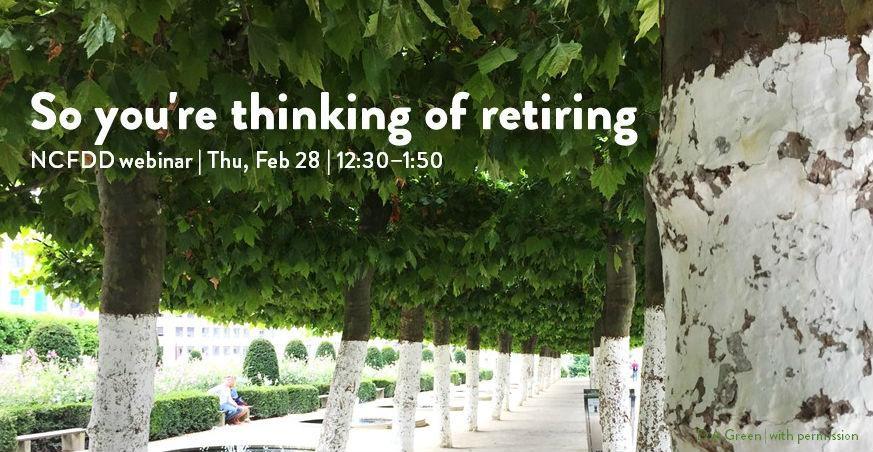
-
19WQ Thinking of retiring - details
-
Lunchtime NCFDD Webinar
So you're thinking of retiring
Thu, Feb 28 | 12:30–1:50 | CASY 525 | Lunch provided
NCFDD presenter: Margaret L Andersen | SU Host: Jacquelyn MillerIf you are considering retiring from academe in the next five years, this webinar will be of interest to you. Retirement is a major life adjustment and yet very little of the advice given in various self-help books seems to apply to academic scholars. This webinar will discuss various approaches to retirement, helping you set your personal and, if you want, professional goals for this new phase of life. Understanding the context in which you will retire is critical, including such things as different institutional policies, personal choices, and financial matters.
Retirement is a time when you can re-invent your approach to life and work. Although there is not a single way to make this important life transition, there are steps you can take to ensure that you will continue to have a supportive and enriching community during this very different life stage.
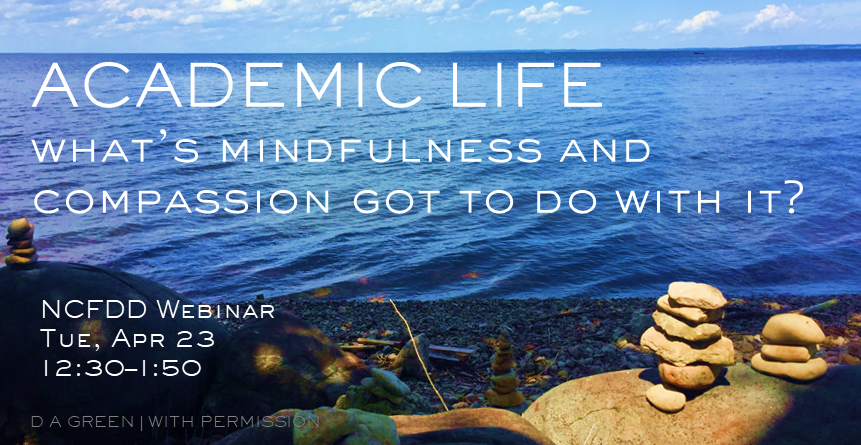
-
19SQ Academic life - mindfulness and compassion - details
-
Lunchtime NCFDD Webinar
Academic life: What’s mindfulness and compassion got to do with it?
Tue, Apr 23 | 12:30–1:50 | CASY 525 | Lunch provided
NCFDD Presenter: Angela Black | SU Host: Jacquelyn MillerSo, you've had your “Sunday meeting” to plan out your week; your appointments have been carefully plotted; and weekly writing/research/teaching goals are set. Yet somehow your life on paper and your academic life seem to rarely meet. This webinar will introduce how techniques in mindfulness and compassion could be the building blocks to further support locating more room in your calendar, more space in your being, and increased self-kindness to sustain your academic life. In this webinar, you will learn how to:
- Define how mindfulness is critical as a foundational practice in academic life
- Interpret how to use a four-part definition of compassion to evaluate action steps in academic life
- Evaluate how loving kindness (versus self-criticism) is key in cultivating a healthy identity in academic life
- Integrate mindfulness, compassion, and self-compassion as a cycle of self-kindness to sustain academic life
- Develop a self-compassionate narrative when all else “fails” in academic life
Please note: This event is a presented by the National Center for Faculty Development and Diversity (NCFDD). This webinar is accessible on the NCFDD website, under Member Resources. The Center for Faculty Development funds an institutional membership to NCFDD for all SU faculty, graduate students and law students. Click here to find out more about Seattle University's institutional membership to NCFDD, including how to become a member of NCFDD.
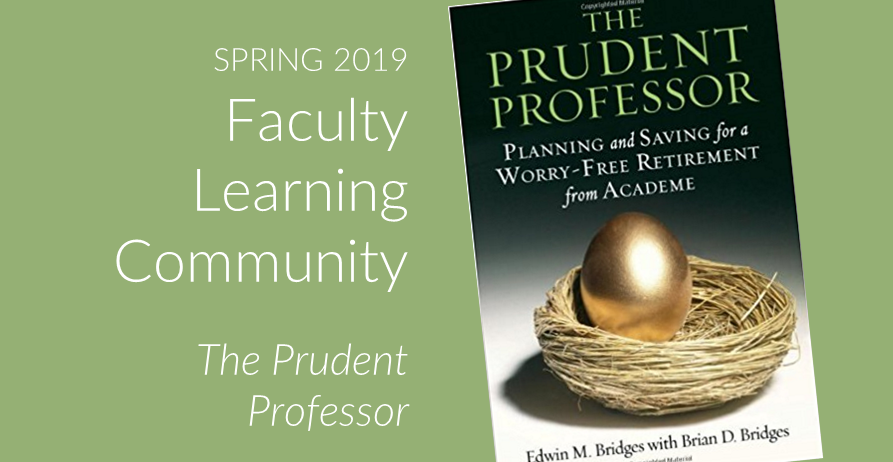
-
19SQ FLC - The Prudent Professor - details
-
Faculty Learning Community
The prudent professor: Planning and saving for a worry-free retirement from academe
Edwin Bridges’ The Prudent Professor is a practical guide for faculty of all ages who want to prepare for the financial aspects of retirement, and not just let it happen. The book draws on the author’s own careful research and long personal experience in building—and protecting—his retirement funds. He describes with candor his own successes and mistakes and his short, concise chapters provide both the rationale and methodology to identify one’s own personal goals at each stage of one’s career.
In this four-session Learning Community, facilitated by Jacquelyn Miller (Center for Faculty Development) during spring quarter, we'll work our way through the chapters of the book to determine what might work best for you in your own situation.
How might you benefit from this FLC?
Over the four sessions, you'll learn about:
- Retirement saving strategies
- Pre-retirement considerations
- Assessing different income streams during retirement
- How to make sure your retirement income lasts as long as you do
Who is it suited to?
This community is primarily for any faculty member who is interested in retirement planning.
The Prudent Professor is 334 pages long, and reading will be split across the four sessions to be manageable for participants.
What are the dates?
The four dates in Spring Quarter are
- Thu, Apr 25 | 12:15–1:30* | Wismer Room (LOYA 400) | Lunch provided
- Thu, May 9 | 12:15–1:30* | Wismer Room (LOYA 400) | Lunch provided
- Thu, May 23 | 12:15–1:30* | Wismer Room (LOYA 400) | Lunch provided
- Thu, Jun 6 | 12:15–1:30* | Wismer Room (LOYA 400) | Lunch provided
*If you teach until 12:20 on these days, you will still be able to join the group!
How to register
Registration is now closed.
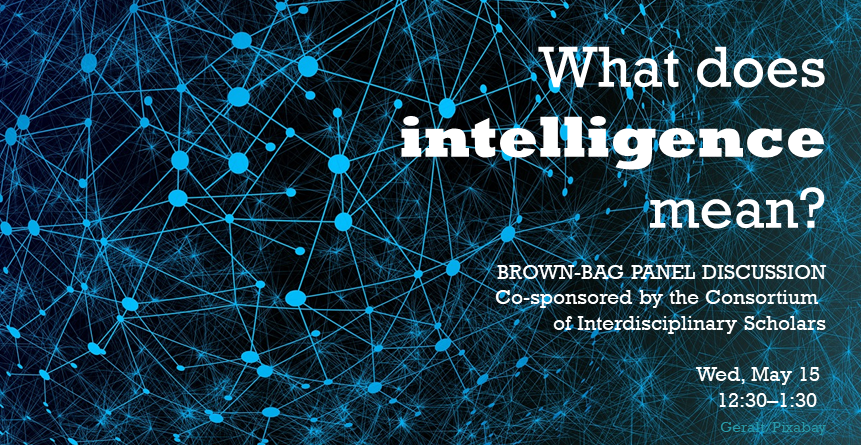
-
19SQ What does intelligence mean - details
-
Brown Bag Panel Discussion
What does intelligence mean?
Co-sponsored by the Consortium of Interdisciplinary Scholars
Wed, May 15 | 12:30–1:30 | Casey Commons (CASY 530) | Bring your own lunch, beverages provided
Come to participate, come to listen
Moderated by Katherine RaichlePresenters
- Mary Graham, PhD | Associate Professor of Counseling, College of Education
- Dylan Helliwell, PhD | Chair and Associate Professor of Mathematics, College of Science and Engineering
- Erica Lilleleht, PsyD | Associate Professor of Psychology, College of Arts and Sciences
A central mission of any university is to certify development and expression of intelligence in its students. Faculty also are thought to model and express intelligence in scholarship. But what counts as intelligence in a university context and at SU?
Bring lunch if you like. Coffee, tea, and water provided. No RSVP required. For more information, contact Sven Arvidson (Interdisciplinary Liberal Studies)
What is the Consortium of Interdisciplinary Scholars?
The Consortium is 150+ faculty from all schools and colleges on campus who are interested in providing expert advice for students pursuing projects across disciplines and in facilitating interdisciplinary faculty scholarship.
Membership?
You do not have to be a member to attend a Consortium event. Membership in the Consortium is free and open to SU teachers. Simply contact Dr. Sven Arvidson (arvidson@seattleu.edu). To learn more and see a current membership list, visit the webpage for the Consortium of Interdisciplinary Scholars.
Consortium Steering Committee: Sven Arvidson (AS), Lisa Brodoff (Law), Marc Cohen (Albers), Mary Graham (Education), Wanda Gregory (SNCS), Stacey Jones (Albers), Douglas Latch (Sci&Eng), Emily Lieb (AS), Lauren Lawson (Nursing), Rick Malleus (AS), Stephen Rice (AS), Mark Roddy (Education), Michael Trice (STM), Riva Zeff (AS)
»Registration is now closed
2017–18
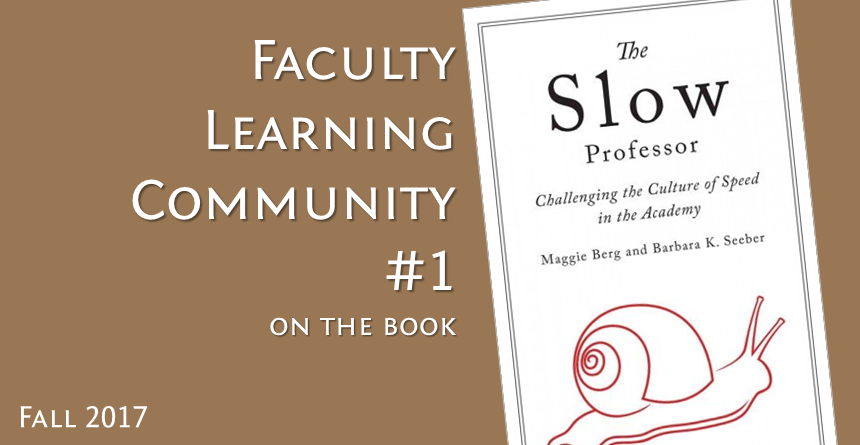
-
17FQ FLC 1 - The Slow Professor - details
-
Faculty Learning Community
The slow professor: Challenging the culture of speed in the academy
Are you interested in challenging the corporatization of the contemporary university’s increasing demands of speed and efficiency from faculty regardless of the consequences for education and scholarship? Maggie Berg and Barbara K. Seeber’s The Slow Professor: Challenging the Culture of Speed in the Academy presents both an analysis of the culture of speed in the academy and ways of alleviating stress while improving teaching, research, and collegiality.
In this two-session Learning Community facilitated by Jacquelyn Miller (Center for Faculty Development) during fall quarter, you'll work your way through the chapters of the book so that you are better prepared to live the principles of the Slow movement in academic life as a counter to the erosion of humanistic education.
2a. What's in it for you?
Over the two sessions, you'll learn how to adopt the principles of the Slow movement into your professional practice in an effective way to:
- Alleviate work stress
- Preserve humanistic education
- Resist the corporate university
2b. Who is it suited to?
This community is primarily for any faculty member who is interested in learning about changes in academic culture due to a more corporate approach and how to offset those changes in order to improve life–work balance.
The Slow Professor is just 94 pages long, and reading will be split across the two sessions to be manageable for participants.
2c. What are the dates?
The two dates in Fall Quarter are:
- Thu, Oct 19 | 10:30-11:45 | Wismer Room (LOYA 400)
- Thu, Nov 2 | 10:30-11:45 | Wismer Room (LOYA 400)
2d. How to register
Registration is now closed.
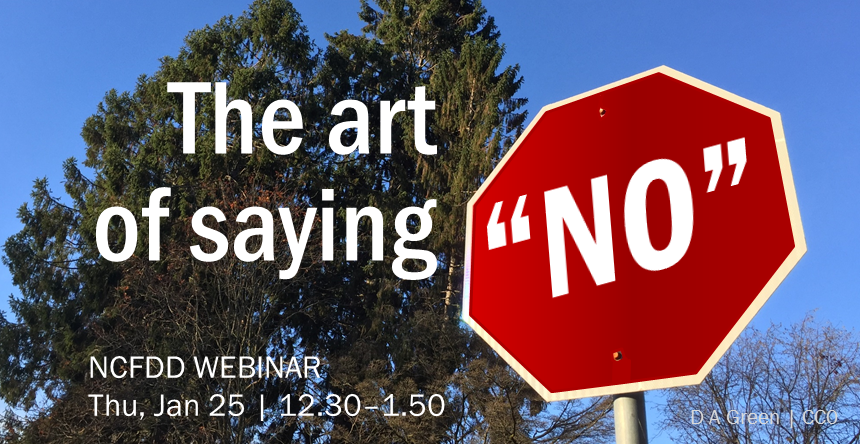
-
18WQ The art of saying "no" - details
-
Hosted NCFDD Webinar
The Art of Saying "No"
Thu, Jan 25 | 12:30–1:50 | HUNT 110 | Lunch provided
NCFDD presenter: Kerry Ann Rockquemore | SU Host: Jacquelyn MillerAre you confused about when to say "yes" and "no" to other people's requests? Do you often say "yes" to requests without realizing the impact that response will have on your time and productivity? Do you find yourself feeling angry and resentful during the academic year because you've said "yes" too often?
You're not alone! Many faculty (pre-tenure, post-tenure, and non-tenure-track) find it incredibly difficult to sort out when, why, and how to say "NO." In this tele-workshop, you will learn:
- The biggest mistakes faculty make in responding to requests
- How to identify and disrupt problematic patterns
- Helpful strategies that you can implement immediately so you can add "no" to your vocabulary
Please note: This event is a presented by the National Center for Faculty Development and Diversity (NCFDD). This webinar is accessible on the NCFDD website, under Member Resources. The Center for Faculty Development funds an institutional membership to NCFDD for all SU faculty, graduate students and law students. Click here to find out more about Seattle University's institutional membership to NCFDD, including how to become a member of NCFDD.
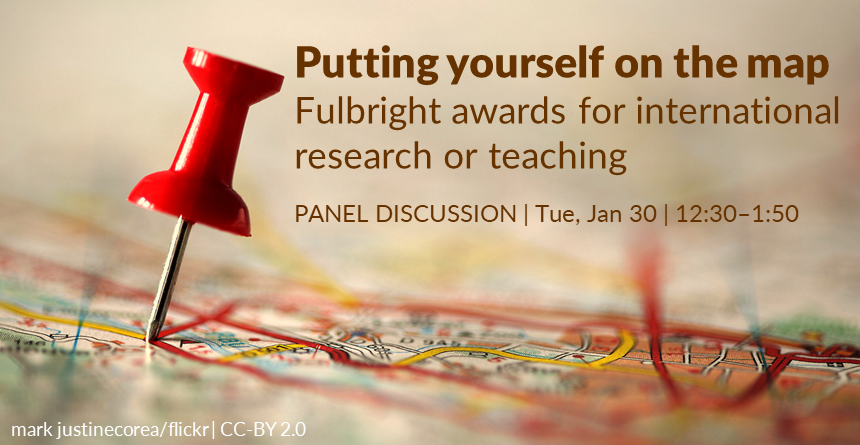
-
18WQ Putting yourself on the map: Fulbright panel - details
-
Panel Discussion
Putting Yourself on the Map: Fulbright Awards for International Research or Teaching
Tue, Jan 30 | 12:30-1:50 | HUNT 100 | Lunch provided
Facilitated by Jacquelyn MillerIf you are interested in international research and/or teaching opportunities, a Fulbright award is a good way to fund your academic work. At this event, a panel of recent Fulbright award recipients will share their motives for applying for a Fulbright, insights into the application process, and tips on how to gain the most from your experience as a Fulbright ambassador as well as addressing questions from the audience.
If you are interested in learning more about the Fulbright Scholar Program, contact Jacquelyn Miller (University Liaison to the Fulbright Scholar Program).
-
18WQ FLC 2 - The New Academic - details
-
Faculty Learning Community
The New Academic
Are you interested in learning about the culture of academia and how to be a more effective faculty member, but are not sure where to begin? Shelda Debowski’s The New Academic: A Strategic Handbook provides a guide for those new(-ish) to academe on how to develop an engaging and productive career as a faculty member.
In this four-session Learning Community facilitated by Jacquelyn Miller (Center for Faculty Development) over winter quarter, you'll work your way through the chapters in the book so that you feel better prepared to fulfill the various roles—colleague, teacher, scholar, disciplinary expert, public professional—expected of a new academic.
What's in it for you?
Over the four sessions, you'll learn how to:
- Get started - or reboot - as an academic
- Make a difference as an effective teacher
- Build an effective research track record
- Learn how to engage effectively with the public
- Advance your career in an academic setting
Who is it suited to?
This community is for any faculty member who is in the early stage of their academic career.
The New Academic is 219 pages long, and the reading will be split across the four sessions to be manageable for participants.
What are the dates?
The four dates in Winter Quarter are:
- Wed, Jan 31 | 2:15-3:30 | Wismer Room (LOYA 400)
- Wed, Feb 14 | 2:15-3:30 | Wismer Room (LOYA 400)
- Wed, Feb 28 | 2:15-3:30 | Wismer Room (LOYA 400)
- Wed, Mar 14 | 2:15-3:30 | Wismer Room (LOYA 400)
How to register
Registration is now closed.
-
18WQ FLC 3 - The Coach's Guide for Women Professors - details
-
Faculty Learning Community
The Coach’s Guide for Women Professors
Rena Seltzer’s The Coach’s Guide for Women Professors is a practical guide both for women—whether contingent faculty, tenure-stream faculty, or administrators—and for men who are supervising women in academe. Women often encounter unique barriers in academe and often carry heavier loads of service and care responsibilities than their male colleagues. This book offers succinct advice on how women faculty can prioritize the demands of their lives, negotiate better, create support networks, and move their careers forward.
In this three-session Learning Community, facilitated by Jacquelyn Miller (Center for Faculty Development) during winter quarter, we'll work our way through the chapters of the book so that we can determine whether and how Seltzer’s advice can lead women faculty to a more sane and joyful life.
What's in it for you?
Over the three sessions, you'll learn how to:
- Establish a productive writing practice
- Identify and overcome obstacles to your professional success
- Feel increased confidence in your leadership skills
- Develop a network of support
- Rediscover joy and balance in your work and personal lives
Who is it suited to?
This community is primarily for any faculty member who is interested in learning about the challenges that women face in academic and how to overcome them.
The Coach’s Guide for Women Professors is 199 pages long, and reading will be split across the three sessions to be manageable for participants.
What are the dates?
The dates in Winter Quarter are
- Thu, Feb 8 | 10:30-11:45 | Wismer Center, LOYA 400
- Thu, Feb 22 | 10:30-11:45 | Wismer Center, LOYA 400
- Thu, Mar 8 | 10:30-11:45 | Wismer Center, LOYA 400
How to register
Registration is now closed.
-
18SQ FLC 6 - The Prudent Professor - details
-
Faculty Learning Community
The Prudent Professor
Edwin Bridges’ The Prudent Professor is a practical guide for faculty at any age who want to prepare for the financial aspects of retirement, and not just let it happen. The book draws on the author’s own careful research and long personal experience in building—and protecting—his retirement funds. He describes with candor his own successes and mistakes and his short, concise chapters provide both the rationale and methodology to identify one’s own personal goals at each stage of one’s career.
In this four-session Learning Community, facilitated by Jacquelyn Miller (Center for Faculty Development) during spring quarter, we'll work our way through the chapters of the book to determine what might work best for you in your own situation.
What's in it for you?
Over the four sessions, you'll learn how to:
- Retirement saving strategies
- Pre-retirement considerations
- Assessing different income streams during retirement
- How to make sure your retirement income lasts as long as you do
Who is it suited to?
This community is primarily for any faculty member who is interested in retirement planning.
The Prudent Professor is 334 pages long, and reading will be split across the four sessions to be manageable for participants.
What are the dates?
The four dates in Spring Quarter are:
- Tue, Apr 17 | 12:20-1:30 | Wismer Room (LOYA 400)
- Tue, May 1 | 12:20-1:30 | Wismer Room (LOYA 400)
- Tue, May 15 | 12:20-1:30 | Wismer Room (LOYA 400)
- Tue, May 29 | 12:20-1:30 | Wismer Room (LOYA 400)
How to register
Registration is now closed.
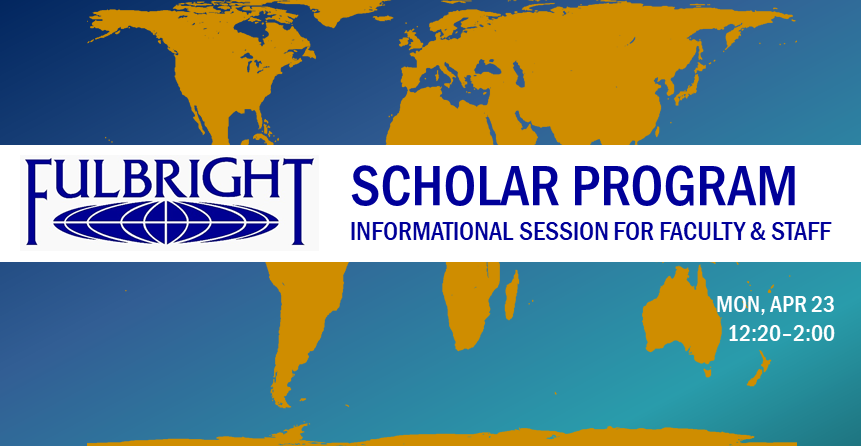
-
18SQ Fulbright Scholar Program: Informational session - details
-
Lunchtime Workshop
Fulbright Scholar Program: Informational session for faculty and staff
Mon, Apr 23 | 12:20–2:00 | Student Center 210 | Lunch provided
Presenter: Athena Fullay | SU Host: Jacquelyn MillerThis session will be facilitated by Athena Fullay, Outreach and Recruitment Specialist at the Institute of International Education, the organization that oversees the Fulbright Program.
At the session you will:
- Learn about teaching and research opportunities in more than 125 countries
- Get advice on selecting countries for application and making contacts abroad
- Explore how your campus can host visiting foreign Fulbright scholars
- Get tips on how to prepare the Fulbright application
If you are interested in learning more about the Fulbright Scholar Program, contact Jacquelyn Miller (University Liaison to the Fulbright Scholar Program).
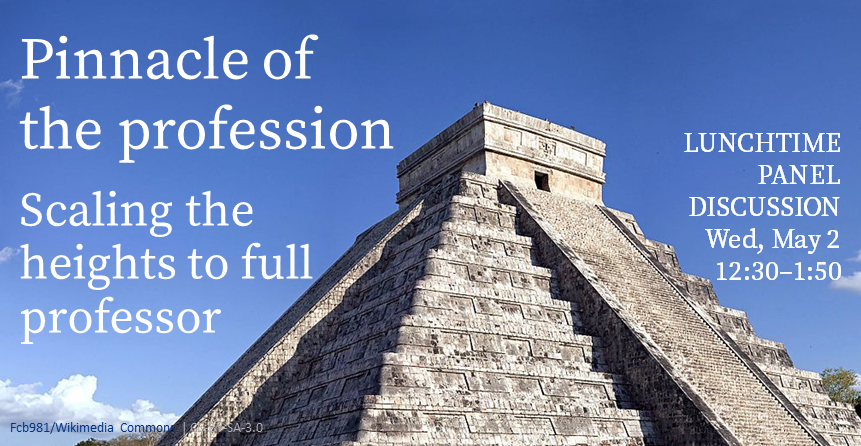
-
18SQ Pinnacle of the profession - details
-
Panel Discussion
Pinnacle of the profession: Scaling the heights to full professor
Wed, May 2 | 12:30–1:50 | Pigott 304 | Lunch provided
Facilitated by Jacquelyn MillerFor many tenure-track faculty, achieving the rank of full professor signifies that they’ve reached the pinnacle of their profession. The process for reaching that pinnacle, however, often feels rather mysterious and perhaps even too daunting to consider.
Meet a panel of current full professors to discover how they successfully achieved this next stage in their careers. Learn about some of the best practices to follow or possible pitfalls to avoid as you consider your own academic path to the heady heights of full professor.
The session also includes a Q&A in a confidential environment.
2016-17
Spring 2017
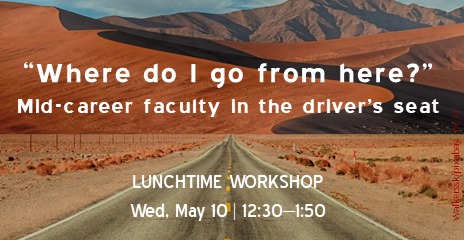
“Where do I go from here?” Mid-career faculty in the driver’s seat
LUNCHTIME WORKSHOP
Wednesday, May 10 | 12:30–1:50 | Casey Commons | Lunch provided
Facilitated by Jacquelyn Miller
Research tells us that faculty generally experience greater dissatisfaction during the middle years of their careers. Reasons given for this trend include lengthy professional lives; increased workload; an absence of motivating professional goals; diversified faculty appointment types; and the fact that individuals’ mid-career years are often also mid-life years, which in many cases is a time of reflection and reassessment.
Which areas of your life will give you greatest satisfaction at this stage? Will you want to work on your teaching practices, for instance, or engage your disciplinary peers through professional service to your field? Or maybe it’s community service or academic leadership roles that interest you. How can you take control of your direction so that you feel you’re on the right road?
In this workshop, you’ll have an opportunity to articulate some of your professional and personal goals for the next five years and to create an action plan that is sensible and sustainable. We’ll also consider how department chairs, program directors, and faculty serving on personnel committees can support mid-career faculty in achieving their goals.
Request a consultation on this topic.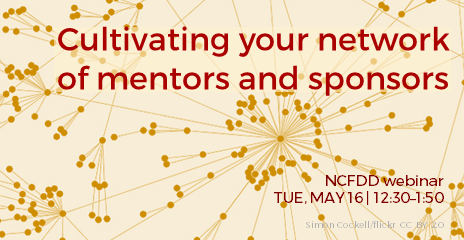
NCFDD Webinar | Cultivating your network of mentors, sponsors, and collaborators
LUNCHTIME WORKSHOP
Tuesday, May 16 | 12:30–1:50 | Casey Commons | Lunch provided
Facilitated by Jacquelyn Miller
- Do you have a reliable and strong network of mentors?
- Are you struggling to cultivate mentoring relationships?
- Do you know the difference between a mentor and a sponsor?
- Are you moving to a new stage of your career and wondering how to find new mentors and sponsors that are appropriate to the next level?
If so, join us for a webinar that will help you:
- Map your current mentoring network
- Identify your unmet needs
- Plan how to expand your existing network to meet your current needs
Winter 2017
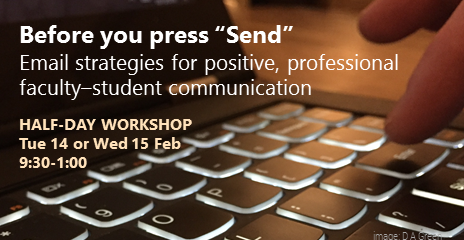
Before you press “Send”: Email strategies for professional and positive relationships with your students
Tue, Feb 14 | 9:30-1:00 | Casey Commons | Lunch provided
OR
Wed, Feb 15 | 9:30-1:00 | Casey Commons | Lunch provided
Facilitated by Bryan Ruppert | Albers
Email is an easy-to-use form of communication between faculty and students. We can email them and they can email us about any topic related to the course from anywhere and at any time of day—or night.
Yet how often do you feel that:
- you’re overwhelmed by the sheer volume of email from students?
- you spend a disproportionate amount of time replying to an email that took a student only a few moments to send?
- you agonize for far too long over how to phrase something in an email to a student?
- you wish you could pull an email back after having hit “send?”
In this half-day workshop, we’ll look at what communication research and one instructor’s application of that research suggest are successful practices in email use in the Seattle University context. We’ll review emerging basic etiquette in professional email and explore how to apply this etiquette to our own context of emails to and from students. Together we’ll identify common themes in faculty–student email communication and draft email templates for recurring message types.
You’ll leave the workshop with a sense of when email can work for or against student learning and professional formation. Importantly, you’ll also see how you can reduce the time you spend in your inbox.
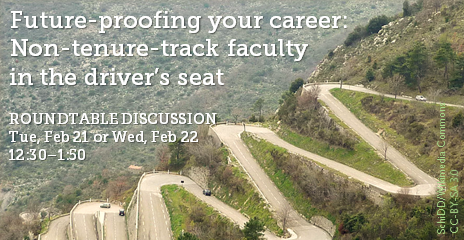
Future-proofing your career: NTT faculty in the driver's seat
ROUNDTABLE DISCUSSION
Tue, Feb 21 | 12:30-1:50 | Casey Commons | Lunch provided
OR
Wed, Feb 22 | 12:30-1:50 | Casey Commons | Lunch provided
Facilitated by Jacquelyn Miller
This roundtable discussion is specifically for non-tenure-track faculty, whether you are working full-time on a multi-year contract, teaching one or two courses a year, or any scenario in between.
How do you position yourself to flourish in a changing national higher education landscape? How do you maximize your talents and find your niche? Becoming “future-proof” means being aware of trends and being better able to position yourself when unexpected opportunities arise. It can bring you a sense of empowerment as you take a more mindful and strategic approach to your own career.
The purpose of this roundtable discussion is to share successes and strategies so that you will be better placed to create an action plan that will help you make your career in the academy more sustainable, meaningful, and rewarding.
Request a consultation on this topic.
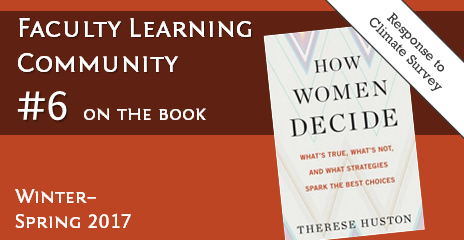
FACULTY LEARNING COMMUNITY
17WQ-17SQ
Are you interested in gaining confidence that you and those with whom you work and play can make decisions that lead to effective and meaningful results? Therese Huston’s How Women Decide: What’s True, What’s Not, and What Strategies Spark the Best Choices explodes stereotypes and myths about female decision-making in order to offer intelligent guidance to the challenges and process of crafting better choices and becoming more courageous leaders.
In this four-session Learning Community facilitated by Jennifer Marrone (Department of Management) over winter and spring, you'll work your way through the chapters of the book so that you feel better prepared not only to make individual decisions, but to lead others, whether work colleagues, friends, or family, and to develop tactics and skills that will lead to wiser and stronger decisions.
Over the four sessions, you'll learn how to:
- Dismantle myths and stereotypes about women (and men) as decision-makers
- Recognize when you are in situations that often lead to poor decision-making
- Make better decisions and present them with greater confidence based on physiological, psychological, and social science research
- Develop better decision-making strategies and processes for work teams and/or committees
This community is for any faculty member who is interested in learning how to improve her/his decision-making skills and processes.
Request a consultation on this topic.
Borrow this book from the Center library.
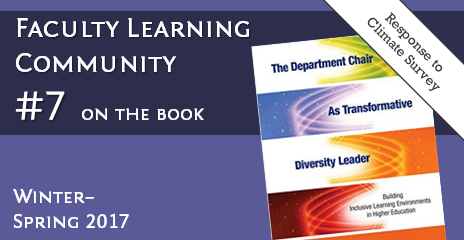
FACULTY LEARNING COMMUNITY
17WQ-17SQ
Co-sponsored by the Wismer Office
Are you interested in seeking concrete tools and strategies for successfully implementing diversity in your department or program? Edna Chun and Alvin Evans’s The Department Chair as Transformative Diversity Leader: Building Inclusive Learning Environments in Higher Education provides practical, research-based approaches representative of best practices from across the United States to achieve this result.
In this four-session Learning Community facilitated by Jodi O’Brien, (Director, Wismer Center for Faculty Diversity and Inclusion) and Jacquelyn Miller (Center for Faculty Development) over winter and spring, you'll work your way through the chapters of the book so that you are better prepared to lead other faculty in advancing diversity in the several areas, including tenure and promotion, curricular change, student learning outcomes, departmental climate, and the representation of a diverse faculty and staff.
Over the four sessions, you'll learn how to:
- Implement a conceptual framework for diversity transformation
- Develop strategies for attaining consensus on a diversity agenda
- Develop strategies for overcoming environmental hurdles and navigating the academic infrastructure
- Recruit and retain a diverse faculty
- Enhance diversity learning outcomes and student identity development
- Develop a department or program diversity strategic plan
This community is primarily for department chairs and program directors, but other faculty member who are interested in promoting an inclusive learning environment would also benefit from this learning community.
Borrow this book from the Center library.
Fall 2016
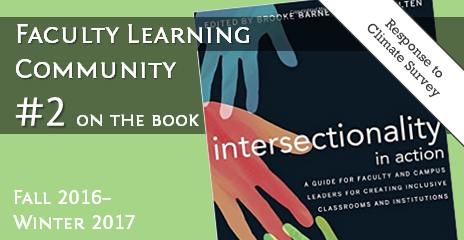
Intersectionality in action: A guide to faculty and campus leaders for creating inclusive classrooms and institutions
FACULTY LEARNING COMMUNITY
16FQ-17WQ
There has been much public debate recently on how to create a campus culture where all members feel included and supported. Brooke Barnett and Peter Felten have collected eleven essays into one learned guide for faculty and campus leaders in their efforts to create inclusive classrooms and institutions that do more than celebrate cultural difference and discourage intolerance of others.
This groundbreaking book aims to help readers, no matter what position they occupy on campus, develop the knowledge and capacities necessary to do this essential work and is premised on the understanding that identity, oppression, power, and marginalization cannot be addressed by looking solely at single identities.
In this three-session Faculty Learning Community facilitated by Natasha Martin (Associate Vice President for Institutional Inclusion and Chief Diversity Officer) over fall and winter, we will progress through topics of intersectionality and 1) the recruitment and retention of students, faculty, and staff; 2) the development of inclusive leaders, governing bodies, and advisory boards; 3) the campus environment; and 4) the larger world.
Over the four sessions, this book and our discussions will help you:
- Understand the multi-dimensional nature of intersectionality as a concept of identity formation;
- Develop campus leaders and structures that sustain an inclusive campus community;
- Create opportunities for civic engagement that are inclusive and transformative; and
- Link how working at the intersections of identity can lead to a more just and humane world.
This community is for any faculty member or academic leader who wishes to explore means of creating a more welcoming and inclusive campus environment using the lens of intersectionality.
Intersectionality in Action is just 140 pages long, and reading will be split across the three sessions to be manageable for participants.
Borrow this book from the Center library.
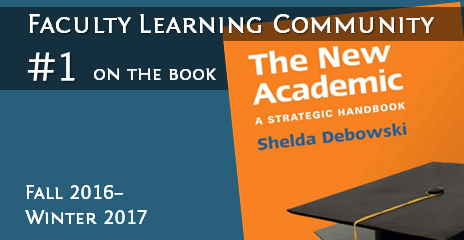
The New Academic: A Strategic Handbook
FACULTY LEARNING COMMUNITY
16FQ-17WQ
Are you interested in learning about the culture of academia and how to be a more effective faculty member, but are not sure where to begin? Shelda Debowski’s The New Academic: A Strategic Handbook provides a guide for those new(-ish) to academe on how to develop an engaging and productive career as a faculty member.
In this four-session Learning Community facilitated by Jacquelyn Miller (Center for Faculty Development) over fall and winter, you'll work your way through the chapters in the book so that you feel better prepared to fulfill the various roles—colleague, teacher, scholar, disciplinary expert, public professional—expected of a new academic.
Over the four sessions, you'll learn how to:
- Get started - or reboot - as an academic
- Make a difference as an effective teacher
- Build an effective research track record
- Learn how to engage effectively with the public
- Advance your career in an academic setting
This community is for any faculty member who is in the early stage of her/his academic career.
Request a consultation on this topic.
Borrow this book from the Center library.
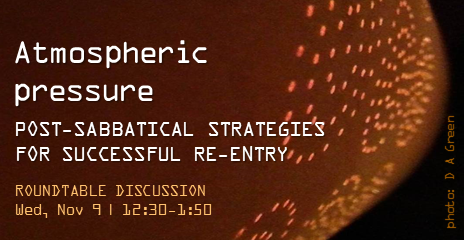
Atmospheric pressure: Post-sabbatical strategies for successful re-entry
Wed, Nov 9 | 12:30–1:50 | Casey Commons | Lunch provided
Facilitated by Jacquelyn Miller
Academic transitions, such as re-entering university life after a sabbatical, are often times of uncertainly and stress for faculty. Returning to one’s regular university routine following months of unscheduled freedom to focus on research, course redesign, and exploring new areas of interest can be jarring and sometimes daunting in terms of increased work expectations and social interactions with students and colleagues.
During this roundtable discussion, you will have an opportunity to reflect on this period of life and to share with others how you perceived your re-entry transition as well as offering some of the professional and personal strategies that enabled you to make this transition meaningful and productive. You’ll also be able to make suggestions about the kinds of pre- and post-sabbatical faculty development work that would ease your experience next time around.
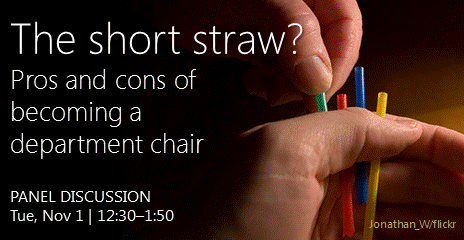
The short straw? Pros and cons of becoming a department chair
PANEL DISCUSSION
Tue, Nov 1 | 12:30–1:50 | Casey Commons | Lunch provided
Facilitated by Jacquelyn Miller
Might your future involve a stint as a department chair or a program director? If so, do you look forward to taking on this role or dread it like the plague? In this frank Q&A discussion, you’ll meet a panel of former and current chairs and directors to discover what these roles entail and how they can contribute to the smooth functioning of your area and the university. Learn about some of the possible pitfalls and hidden pleasures of chairing to help you figure out whether, for you, this really would be the short straw or a rewarding opportunity.
Request a consultation on this topic.
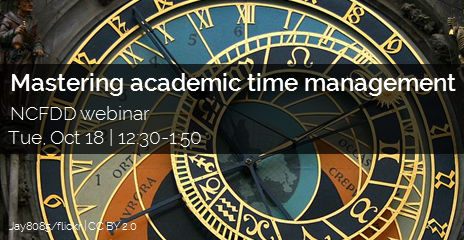
Mastering academic time management
NCFDD WEBINAR
Tue, Oct 18 | 12:30–1:50 | Casey Commons | Lunch provided
NCFDD Presenter: Mindi Thompson; SU Hosts: David Green & Jacquelyn Miller
New faculty members commonly describe:
- Working long hours but making little progress on their research and writing
- A sense of loneliness that stems from limited mentoring and community
- Feeling unsupported in their desire for work-family balance and without the skills to achieve it
- Wondering whether the academic path is the right career choice
This webinar is specifically designed to address these issues and provide participants with concrete skills to successfully transition from graduate student to professor. Specifically, participants will learn:
- The three biggest mistakes that new faculty make in managing their time
- Why and how to align work time with institutional and personal priorities
- How to create time for academic writing and research
- How to organize a network of support and accountability for writing productivity and balance
Request a consultation on this topic.
2015-16
Spring 2016
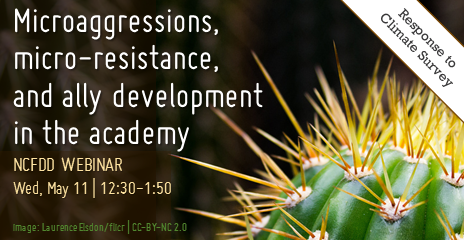
Microaggressions, micro-resistance, and ally development in the academy
NCFDD WEBINAR
Wed, May 11 | 12:30–1:50 | STCN 130 | Lunch provided
NCFDD Presenters: Cynthia Ganote, Floyd Cheung, Tasha Souza | SU Hosts: David Green & Jacquelyn Miller
In response to the climate survey
Microaggressions are those little jabs – comments, gestures, vocalizations – that can get under the skin and can have a hostile or toxic impact on the environment so that individuals feel threatened or uncomfortable.
We more often talk about them when discussing ways to lead difficult dialogues among our students, and even ways to serve as allies to students experiencing classroom-based microaggressions. However, what do we do when we witness colleagues who are the targets of microaggressions?
This webinar will examine ways in which microaggressions particularly impact women, faculty and staff of color, and LGBTQ faculty and staff in our institutions. In response, we can practice forms of micro-resistance and ally behaviors when we see our colleagues targeted, or when we ourselves are targeted. This focus on empowerment allows us to take action in our local environments, thereby lessening the impact upon colleagues and ourselves when microaggressions occur.
About the NCFDD presenters:
Dr. Cynthia Ganote is an Associate Professor in the Department of Sociology at Saint Mary’s College of California in the San Francisco Bay Area. Her research focuses on race, class, gender, and sexual inequalities; feminist methods (including grounded theory and feminist in-depth interviews); critical and feminist pedagogies; and on approaches to community-based research. Currently, she is writing a book entitled Diverse Faculty, Re-Shaping the Professoriate.
Dr. Floyd Cheung directs the Sherrerd Center for Teaching and Learning and teaches English language and literature and American studies at Smith College in Northampton, Massachusetts. He is also a member of the Five College Asian/Pacific/American Studies Certificate Program, for which he served as the founding chair. He has edited books and published articles on Asian American literature from 1887 to the present.
Dr. Tasha Souza is the Associate Director for the Center for Teaching and Learning and Professor of Communication at Boise State University. Most recently, she was the Faculty Associate for Inclusive Excellence for Humboldt State University and a Fulbright scholar at the University of the West Indies in Barbados. She is a consultant on communication and pedagogy and has published in such areas as difficult dialogues in the classroom, discussion-based teaching, instructional communication, and intercultural conflict.
Request a consultation about this topic.
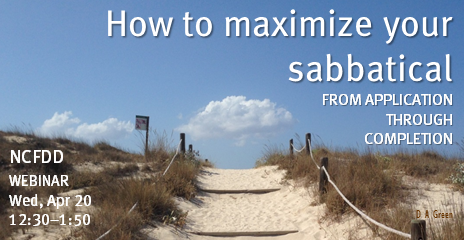
How to maximize your sabbatical: From application through completion
NCFDD WEBINAR
Wed, Apr 20 | 12:30–1:50 | Student Center 130 | Lunch provided
NCFDD Presenter: Peggy Jones, MFA | SU Hosts: Jacquelyn Miller & David Green
While the word “sabbatical” is derived from “ceasing or a rest,” the reality of being on sabbatical could not be further from those derivations. Instead, in most institutions, sabbatical recipients are expected to use their time away from normal academic duties and responsibilities to focus on their research agenda or creative work, with the resultant expectation of a tangible scholarly or creative outcome. While having time away from campus can be wonderfully productive, it can also cause some anxiety or even paralyze productivity.
In this webinar, we will be exploring the above issues, and create positive ways to deal with:
• Discovering what the sabbatical process is in your particular institution
• Developing an application that realistically reflects your scholarly or creative goals
• Planning on how to use your sabbatical effectively and with the most benefit to both the applicant and the institution
Peggy Jones, MFA, is an Associate Professor of Black Studies and Associate Director of the Women’s and Gender Studies Program at the University of Nebraska at Omaha. Her most recent publication was six essays for the permanent painting collection catalog of the Sheldon Art Museum.
She also has a book chapter in African American Women's Language: Discourse, Education and Identity. She has been a Faculty Success Program coach since January 2014 and has loved every minute of the experience! She loves sharing the skills she’s learned in the FSP Bootcamp in any and every way she can.
Request a consultation on this topic.
Winter 2016
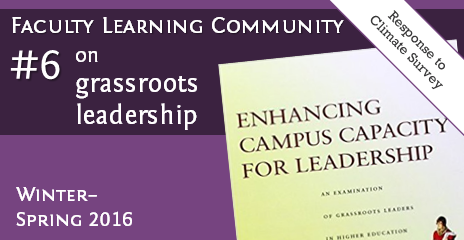
Enhancing campus capacity for leadership: An examination of grassroots leaders in higher education
FACULTY LEARNING COMMUNITY
16WQ-16SQ
Are you interested in learning how faculty can have a profound influence on the culture of academia by becoming grassroots leaders, but are not sure where to begin? Kezar and Lester’s Enhancing Campus Capacity for Leadership provides a guide for examining the untapped potential of faculty to make a positive difference on their campus environment.
In this four-session Learning Community over winter and spring, you'll work your way through the chapters in the book so that you have a better grasp of the possibilities for and challenges of grassroots leaders.
Over the four sessions, in addition to becoming familiar with grassroots leadership as a field of study, you'll learn how to:
- Create meaningful change
- Enhance the campus climate
- Improve relationships among campus colleagues
- Enhance the student experience
This community is for any faculty member who is interested in effective grassroots leadership in a campus context.
Request a consultation on this topic.
Borrow this book from the Center's Library.
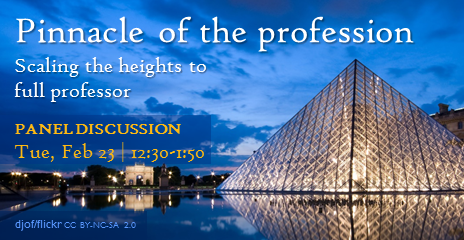
Pinnacle of the profession: Scaling the heights to full professor
PANEL DISCUSSION
Tue, Feb 23 | 12:30–1:50 | Casey Commons | Lunch provided
Facilitated by Jacquelyn Miller
For many tenure-track faculty, achieving the rank of full professor signifies that they’ve reached the pinnacle of their profession. The process for reaching that pinnacle, however, often feels rather mysterious and perhaps even too daunting to consider.
Meet a panel of current full professors to discover how they successfully achieved this next stage in their careers. Learn about some of the best practices to follow or possible pitfalls to avoid as you consider your own academic path to the heady heights of full professor.
The session also includes a Q&A in a confidential environment.
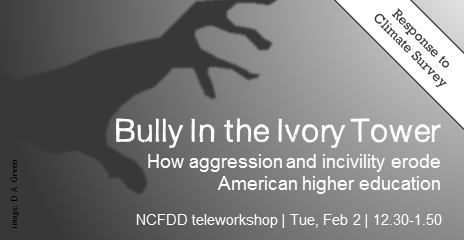
Bully in the ivory tower: How aggression and incivility erode American higher education
NCFDD TELE-WORKSHOP
February 2, 2016
NCFDD presenter: Dr. Leah Hollis | SU Hosts: David Green & Jacquelyn Miller
In response to the Campus Climate Survey
While workplace bullying has an enormous toll on individuals, workplace bullying can cost colleges and universities billions of dollars.
This webinar will review the cost of employee disengagement to higher education. Further, Dr. Leah Hollis, author of Bully in the Ivory Tower, will offer specific case studies in which the bully created a threat for the organization with bullying behavior (breaking external policies and legislation). Organizational solutions, which emerged from the research, will also be offered to participants.
Leah P. Hollis EdD, is president and founder of Patricia Berkly LLC, a healthy workplace advocate at www.diversitytrainingconsultants.com. Her recent book, Bully in the Ivory Tower: How Aggression and Incivility Erode American Higher Education is based on independent research on 175 colleges and universities. Findings reveal that workplace bullying occurs at an even higher rate in higher education. Her research has helped over 70 schools address incivility on campus.
Dr. Hollis has an extensive career in higher education administration where she has held senior leadership and faculty posts. Dr. Hollis has taught at Northeastern University, the New Jersey Institute of Technology, and Rutgers University. Dr. Hollis received her Bachelor of Arts degree in English and Africana Studies from Rutgers University and her Master of Arts in degree English Literature from the University of Pittsburgh. She earned her Doctorate of Education from Boston University, as a Martin Luther King, Jr. Fellow. Her research interests focus on the healthy workplace and also issues that deal with college athletics, and at risk students. She currently is an assistant professor in the Community College Leadership Doctoral Program at Morgan State University.
Request a consultation on this topic.
Fall 2015
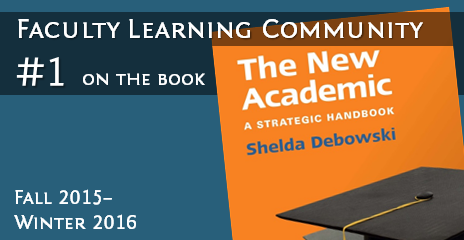
The New Academic
FACULTY LEARNING COMMUNTIY
15FQ-16WQ
Are you interested in learning about the culture of academia and how to be a more effective faculty member, but are not sure where to begin? Shelda Debowski’s The New Academic: A Strategic Handbook provides a guide for those new(-ish) to academe on how to develop an engaging and productive career as a faculty member.
In this four-session Learning Community over fall and winter, you'll work your way through the chapters in the book so that you feel better prepared to fulfill the various roles—colleague, teacher, scholar, disciplinary expert, public professional—expected of a new academic.
Over the four sessions, you'll learn how to:
- Get started - or reboot - as an academic
- Make a difference as an effective teacher
- Build an effective research track record
- Learn how to engage effectively with the public
- Advance your career in an academic setting
This community is for any faculty member who is in the early stage of her/his academic career.
Request a consultation on this topic.
Borrow this book from the Center's Library.
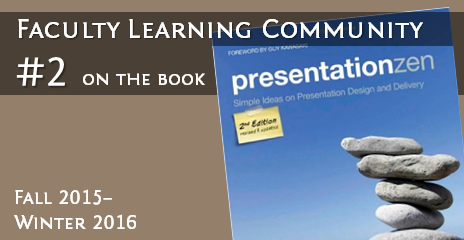
Presentation Zen
FACULTY LEARNING COMMUNTIY
15FQ-16WQ
Presentations are a mainstay of academia: at conferences, on campuses, and in classes. And as we all know, many of them are bad. Really bad.
How can we distinguish our presentations from others’ in a way that truly engages our audiences with the ideas we hope to convey? Garr Reynolds’s Presentation Zen provides potential answers and examples, combining simplicity, storytelling, and good design in a way that helps presentations be “appreciated, remembered, and best of all, acted upon.”
In this four-session Faculty Learning Community over fall and winter, we will progress through the chapters and will each develop or revise an important upcoming presentation of our own. We’ll discuss the sticking points and epiphanies we discover along the way as we experiment with the art of creating presentations that work.
Over the four sessions, this book and our discussions will help you
- Take a different – and flexible – approach to creating presentations tailored to their contexts
- Focus on the story of your message before even thinking about how to present it
- Devise and design simple visuals that will complement and enrich your ideas, rather than detracting from them
- Work out how best to connect with and engage your audience during your presentation
This community is for any faculty member who has an important upcoming presentation or who simply wishes to take their presentations to a higher level.
Borrow this book from the Center's Library.
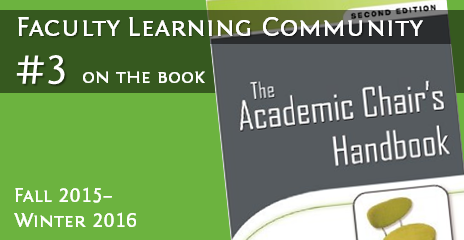
The Academic Chair's Handbook
FACULTY LEARNING COMMUNTIY
15FQ-16WQ
Are you interested in learning how to be a more effective leader of the faculty, staff, and students in your academic department or program? The authors of The Academic Chair's Handbook (Wheeler et al.) provide a guide for department chairs and program directors to develop a reflective and productive career as a faculty administrator.
In this four-session Learning Community over fall and winter, you'll work your way through the chapters in the book so that you feel better prepared to fulfill your current role as the leader of your academic unit.
Over the four sessions, you'll learn how to:
- Develop a conceptual understanding of the unique roles and responsibilities encompassed by academic leadership
- Develop the skills necessary to achieve results through working with faculty, staff, students, and other administrators
- Develop the practice of reflection that enables one to learn from past experiences in order to perfect the art of leadership
This community is for any current department chair or program director interested in the process of self-improvement as a faculty leader.
Request a consultation on this topic.
Borrow this book from the Center's Library.
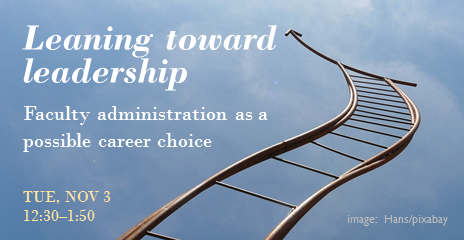
Leaning toward leadership: Faculty administration as a possible career choice
PANEL DISCUSSION
November 3, 2015
Facilitated by Jacquelyn Miller
Does your future involve a stint as a department chair or a program director? Or have you served in one of these roles and are interested in pursuing another faculty administrative position, possibly as a director, an associate dean, or as a dean?
Meet a panel of current faculty administrators to discover what these roles entail and how they contribute to the smooth functioning of the university. Learn about some of the hidden pleasures and possible pitfalls that will prepare you to better serve in these roles.
The session also includes a Q&A in a confidential environment.
Request a consultation about this topic.
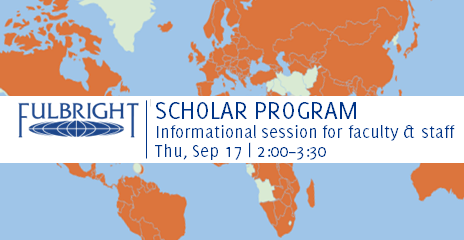
Fulbright Scholar Program: Informational session for faculty and staff
September 17, 2015
Presenter: Athena Fullay | SU Host: Jacquelyn Miller
This session will be facilitated by Athena Fullay, Senior Manager for Institutional Engagement at the Council for International Exchange of Scholars (CIES), the organization that oversees the Fulbright Program. At the session you will:
- Learn about teaching and research opportunities in more than 125 countries
- Get Advice on selecting countries for application and making contacts abroad
- Explore how your campus can host visiting foreign Fulbright scholars
- Get Tips on how to prepare the Fulbright application
If you are interested in learning more about the Fulbright Scholar Program, contact Jacquelyn Miller (University Liaison to the Fulbright Scholar Program).
Request a consultation about this topic.
2014-15
Spring 2015
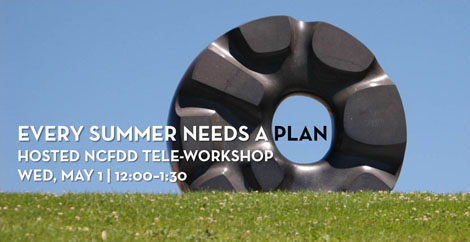
Every summer needs a plan
HOSTED NCFDD TELE-WORKSHOP
May 1, 2015
NCFDD presenter: Kerry Ann Rockquemore | SU Host: Jacquelyn Miller
Please note: This event is a presented by the National Center for Faculty Development and Diversity (NCFDD). This tele-workshop is accessible on the NCFDD website, under Member Resources. The Center for Faculty Development funds an institutional membership to NCFDD for all SU faculty, graduate students and law students. Click here to find out more about Seattle University's institutional membership to NCFDD, including how to become a member of NCFDD.
- Do you often start the summer with high hopes for your writing projects, but end disappointed by your actual productivity?
- Do you desperately want (or need) to write a lot this summer?
- Do you want to figure out how to be more productive AND enjoy your life this summer?
Then join us for a hands-on workshop. NCFDD offers this planning workshop at the beginning of each summer so that you can take time out of your schedule to identify your personal and professional goals, create a strategic plan to accomplish them, and identify the types of community, support, and accountability you need to make this your most productive and balanced summer ever!
Request a consultation about this topic.
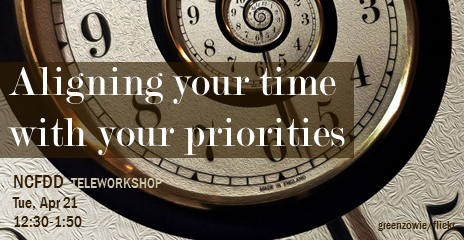
Aligning your time with your priorities
HOSTED NCFDD TELE-WORKSHOP
April 21, 2015
NCFDD presenter: Kerry Ann Rockquemore | SU Host: David Green
Please note: This event is a presented by the National Center for Faculty Development and Diversity (NCFDD). This tele-workshop is accessible on the NCFDD website, under Member Resources. The Center for Faculty Development funds an institutional membership to NCFDD for all SU faculty, graduate students and law students. Click here to find out more about Seattle University's institutional membership to NCFDD, including how to become a member of NCFDD.
In this hands-on tele-workshop, you’ll learn the secret to making your calendar work for you, day-to-day and week-to-week, with a step-by-step guide to holding a weekly planning meeting (also known as “The Sunday Meeting”).
In this session you'll learn:
- What works and what doesn’t work when it comes to weekly planning
- Why weekly planning is the bridge between your quarter or semester plan and getting control of your workday
- The 30-minute technique that will help you make sure that the most important things get done each day
- And much more...
This is a hands-on tele-workshop where we will not only learn the technique, but we will actually do it! And if you’ve had chance to work on an overarching plan for the quarter or semester, you’ll get even more out of the session.
Request a consultation about this topic.
Winter 2015
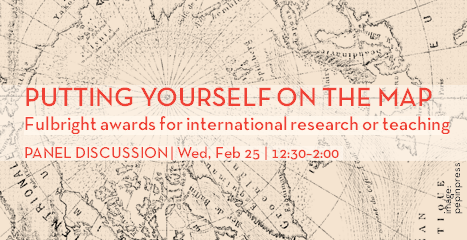
Putting yourself on the map: Fulbright awards for international research or teaching
PANEL DISCUSSION
February 25, 2015
Facilitated by Jacquelyn Miller
If you are interested in international research and/or teaching opportunities, a Fulbright award is a good way to fund your academic work. At this event, a panel of three recent Fulbright award recipients will share their motives for applying for a Fulbright, insights into the application process, and tips on how to gain the most from your experience as a Fulbright ambassador as well as addressing questions from the audience.
If you are interested in learning more about the Fulbright Scholar Program, contact Jacquelyn Miller (University Liaison to the Fulbright Scholar Program).
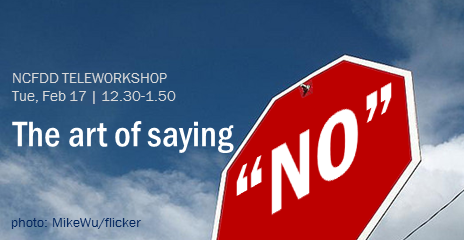
The art of saying no
HOSTED NCFDD TELE-WORKSHOP
February 17, 2015
NCFDD presenter: Kerry Ann Rockquemore | SU Hosts: David Green & Jacquelyn Miller
Please note: This event is a presented by the National Center for Faculty Development and Diversity (NCFDD). This tele-workshop is accessible on the NCFDD website, under Member Resources. The Center for Faculty Development funds an institutional membership to NCFDD for all SU faculty, graduate students and law students. Click here to find out more about Seattle University's institutional membership to NCFDD, including how to become a member of NCFDD.
Are you confused about when to say "yes" and "no" to other people's requests? Do you often say "yes" to requests without realizing the impact that response will have on your time and productivity? Do you find yourself feeling angry and resentful during the academic year because you've said "yes" too often?
You're not alone! Many faculty (pre- and post-tenure) find it incredibly difficult to sort out when, why and how to say "NO." In this tele-workshop, you will learn:
- The biggest mistakes faculty make in responding to requests
- How to identify and disrupt problematic patterns
- Our favorite strategies that you can implement immediately so you can add "no" to your vocabulary
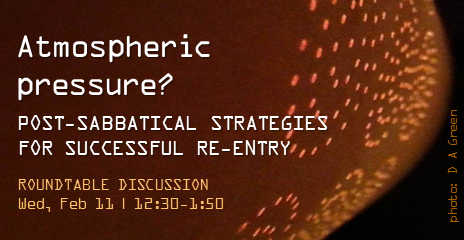
Atmospheric pressure? Post-sabbatical strategies for successful re-entry
ROUNDTABLE DISCUSSION
February 11, 2015
Facilitated by Jacquelyn Miller
Academic transitions, such as re-entering university life after a sabbatical, are often times of uncertainly and stress for faculty. Returning to one’s regular university routine following months of unscheduled freedom to focus on research, course redesign, and exploring new areas of interest can be jarring and sometimes daunting in terms of increased work expectations and social interactions with students and colleagues.
During this roundtable discussion, you will have an opportunity to reflect on this period of life and to share with others how you perceived your re-entry transition as well as offering some of the professional and personal strategies that enabled you to make this transition meaningful and productive. You’ll also be able to make suggestions about the kinds of pre- and post-sabbatical faculty development work that would ease your experience next time around.
Fall 2014
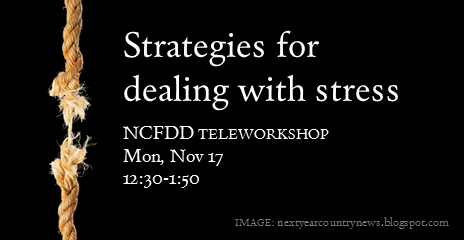
Strategies for dealing with stress
HOSTED NCFDD TELE-WORKSHOP
November 17, 2014
NCFDD presenter: Kerry Ann Rockquemore | SU Hosts: David Green & Jacquelyn Miller
Please note: This event is a presented by the National Center for Faculty Development and Diversity (NCFDD). This tele-workshop is accessible on the NCFDD website, under Member Resources. The Center for Faculty Development funds an institutional membership to NCFDD for all SU faculty, graduate students and law students. Click here to find out more about Seattle University's institutional membership to NCFDD, including how to become a member of NCFDD.
The ivory tower of higher education is no longer the idyll of endless time for thought and learning – if ever it was. As with any workplace, it can provoke anxiety and tension on many fronts.
By mid-November, many of us may feel stressed. Others feel devastated when their articles and/or grant proposals are rejected. And sometimes the pressure of work, in particular of publishing (on top of our teaching and service commitments), can make us sick. Just think how many of your friends in academia fall ill over the break and only recover in time to teach their next course.
If any of this sounds familiar and you have difficulty managing the negative energy and rejection in the academic environment, please join us to learn:
- the impact that stress and negativity can have if they are not managed
- the most common areas of stress in academic life
- concrete strategies for managing the physical, emotional, and attitudinal effects of stress
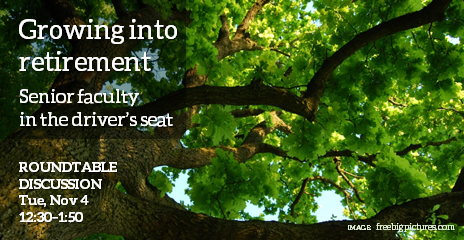
Growing into retirement: Senior faculty in the driver's seat
ROUNDTABLE DISCUSSION
November 4, 2014
Facilitated by Jacquelyn Miller
Retirement represents a critical career stage for any academic, but is one that is very often ignored in terms of long-term planning. This “third phase” of your career involves major transitions in identity, community, and economic security. If the idea of retirement has entered your consciousness as an exciting adventure, as a dreaded inevitability, or somewhere in between, then this roundtable event will benefit you.
During this group discussion, you will have an opportunity to reflect on this stage of life and to articulate some of the professional and personal goals that will enable you to make the transition process meaningful and productive. For instance, which areas of your life will give you greatest satisfaction at this stage? What are your greatest worries? Will you want to create a new career path or engage your disciplinary peers through professional service to your field? Or maybe it’s community service or extensive travel that interest you. This roundtable discussion will help you work out how to take control of your new direction so that you feel you’re on the right road.
Request a consultation about this topic.
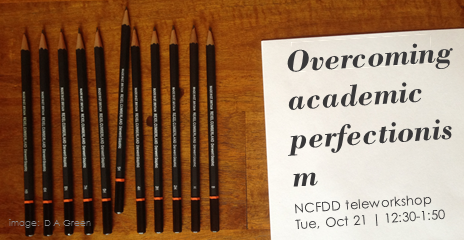
Overcoming academic perfectionism
HOSTED NCFDD TELE-WORKSHOP
October 21, 2014
NCFDD presenter: Kerry Ann Rockquemore | SU Hosts: David Green & Jacquelyn Miller
Please note: This event is a presented by the National Center for Faculty Development and Diversity (NCFDD). This tele-workshop is accessible on the NCFDD website, under Member Resources. The Center for Faculty Development funds an institutional membership to NCFDD for all SU faculty, graduate students and law students. Click here to find out more about Seattle University's institutional membership to NCFDD, including how to become a member of NCFDD.
When we’ve reached the heights of academic achievement in our fields, it’s easy to fall into perfectionist traps. We might struggle to share our writing at early stages because it’s not perfect; we feel devastated at criticism of our work; we beat ourselves up every time the tiniest thing goes wrong; and sometimes we even find it difficult to celebrate other people’s success because it reminds us of our own shortcomings.
If any of these things sound familiar, then congratulations! You’re a perfectly normal perfectionist.
The only problem is that the nature of the academy is likely to exacerbate our perfectionist tendencies, as opposed to minimizing them.
In this tele-workshop, perfectionists will unite to get clear about:
- The causes and consequences of excessive perfectionism
- The features of academic life that intensify perfectionism
- Strategies to identify when your perfectionism is at work, assess whether it is useful or debilitating, and adjust your standards and behavior accordingly
- The secret to finding real satisfaction in every step of the writing process
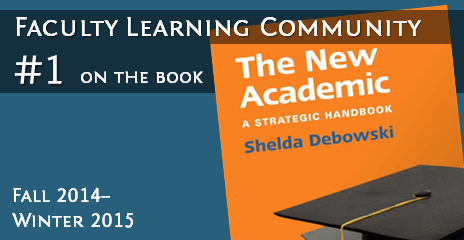
The New Academic
FACULTY LEARNING COMMUNITY
14FQ-15WQ
Are you interested in learning about the culture of academia and how to be a more effective faculty member, but are not sure where to begin? Shelda Debowski’s The New Academic: A Strategic Handbook provides a guide for those new(-ish) to academe on how to develop an engaging and productive career as a faculty member.
In this four-session, facilitated Faculty Learning Community over fall and winter, you'll work your way through the chapters in the book so that you feel better prepared to fulfill the various roles—colleague, teacher, scholar, disciplinary expert, public professional—expected of a new academic.
This community is for any faculty member who is in the early stage of her/his academic career.
Borrow this book from the Center's Library.
2013-14
Spring 2014
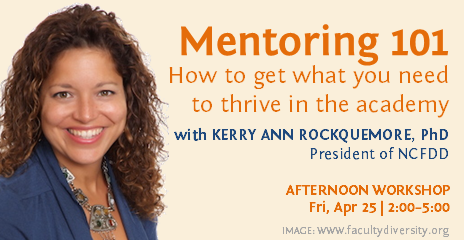
Mentoring 101: How to get what you need to thrive in the academy
AFTERNOON WORKSHOP
April 25, 2014
Presented by Kerry Ann Rockquemore
This event is a presented by the National Center for Faculty Development and Diversity (NCFDD). The Center for Faculty Development funds an institutional membership to NCFDD for all SU faculty, graduate students and law students. Click here to find out more about Seattle University's institutional membership to NCFDD, including how to become a member of NCFDD.
Do you have a reliable and strong network of mentors? Are you struggling to cultivate mentoring relationships? Do you know the difference between a mentor and a sponsor? Are you moving to a new stage of your career and wondering how to find new mentors and sponsors that are appropriate to the next level?
Traditional ideas about mentoring often leave faculty feeling that something is missing in their professional development. In this workshop, guest speaker Kerry Ann Rockquemore challenges the conventional wisdom about faculty mentoring and presents a new framework to help you re-imagine how mentoring works. All participants will map their current mentoring network, identify the pressing areas of need that are not being met, and create a plan to expand their existing mentoring network.
Kerry Ann Rockquemore, PhD, is President and CEO of the National Center for Faculty Development & Diversity (NCFDD), of which Seattle U is an institutional member. After Dr. Rockquemore became a tenured professor at the University of Illinois at Chicago, her focus shifted from sociology to improving conditions for pre-tenure faculty by creating supportive communities for professional development, writing productivity, and work/life balance. Her award-winning work with underrepresented faculty led to the publication of her most recent book: The Black Academic's Guide to Winning Tenure without Losing Your Soul.
Request a consultation on this topic.
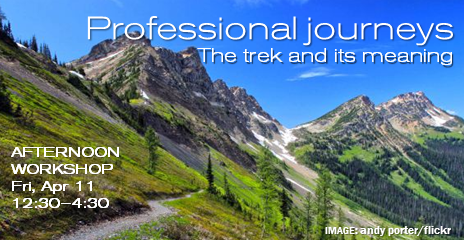
Professional journeys: The trek and its meaning
AFTERNOON WORKSHOP
April 11, 2014
Presented by Robert Conyne, the 2013-14 Boeing-William A. Allen Endowed Chair and Distinguished Professor, College of Education
A "Professional Journey" can be an exciting quest, a slog through bogs, a settling kind of experience, and far more besides. We each experience our own journey as faculty members and tend largely to keep its meaning private, whether it's wrapped in joy or in regret, or somewhere in between. Yet when we are provided with a positive occasion to focus on our professional journey and to be able to share it with peers, experience tells us that much is to be gained.
This four-hour afternoon workshop will intersperse short videos of SU faculty sharing and discussing key aspects of their professional journeys with opportunities for workshop participants to reflect and interact in small groups, guided by a set of carefully developed questions that help illuminate their own professional journey and its meaning.
By participating in this event, you can expect to gain:
- a deeper understanding of your own professional journey and its meaning
- a sense of universality, that "I am not the only one" who feels and thinks like this
- an opening of possibilities for renewal and advancement as a faculty member
- a sense of altruistic gain through providing guidance to others
- opportunities to realize valuable experience-based learning
View clip #1: Experiencing your professional journey
View clip #3: What advice would you offer?
Winter 2014
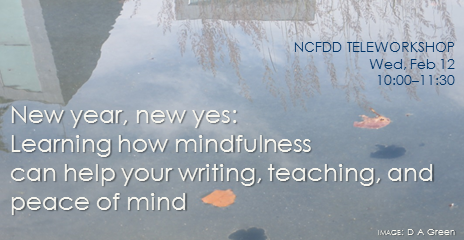
New year, new yes: Learning how mindfulness can help your writing, teaching, and peace of mind
HOSTED NCFDD TELE-WORKSHOP
February 12, 2014
NCFDD Presenter: Cassie Premo Steele | SU Hosts: David Green & Jacquelyn Miller
Please note: This event is a presented by the National Center for Faculty Development and Diversity (NCFDD). This tele-workshop is accessible on the NCFDD website, under Member Resources. The Center for Faculty Development funds an institutional membership to NCFDD for all SU faculty, graduate students and law students. Click here to find out more about Seattle University's institutional membership to NCFDD, including how to become a member of NCFDD.
Mindfulness is a practice of stress reduction that teaches open awareness without judgment and has been known to help with chronic pain and anxiety. In this workshop, you will be introduced to some simple ways to use mindfulness techniques in your writing, teaching, and life. Ironically, the same mindset that sets us up for success as academics can lead to problems over the course of our careers—such as writer's block, lack of connection with colleagues and students, and constant anxiety and self-criticism. In this workshop, we will combine mindfulness practices and journaling to begin to move through these problems.
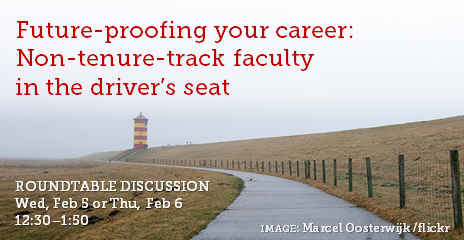
Future-proofing your career: Non-tenure-track faculty in the driver's seat
ROUNDTABLE DISCUSSION
February 5 or 6, 2014
Facilitated by Jacquelyn Miller
This second event in our “In the driver’s seat” series is specifically for non-tenure-track faculty, whether you are working full-time on a multi-year contract, teaching one or two courses a year, or any scenario in between.
How do you position yourself to flourish in a changing national higher education landscape? How do you maximize your talents and find your niche? Becoming “future-proof” means being aware of trends and being better able to position yourself when unexpected opportunities arise. It can bring you a sense of empowerment as you take a more mindful and strategic approach to your own career.
The purpose of this roundtable discussion is to share successes and strategies so that you will be better placed to create an action plan that will help you make your career in the academy more sustainable, meaningful, and rewarding.
Request a consultation on this topic.
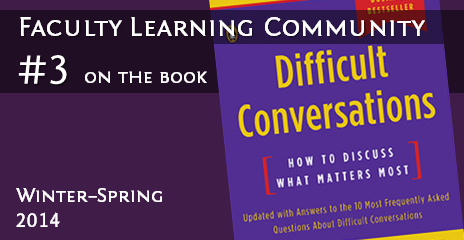
Difficult conversations
FACULTY LEARNING COMMUNITY
14WQ-14SQ
Are you interested in learning how to communicate effectively in difficult situations, but are not sure where to begin? Difficult Conversations, written by members of the Harvard Negotiation Project, provides a step-by-step approach for how to have your toughest conversations with less stress and more success. In this four-session Learning Community over winter and spring, you'll work your way through the principles in the book so that you feel better prepared to engage in important conversations on tricky topics, be they with a colleague, a relative, or a friend.
Over the four sessions, you'll learn how to:
- Decipher the underlying structure of every difficult conversation
- Interpret the significance of what is said — and what is not
- Raise tough issues without triggering defensiveness
- Manage strong emotions — yours and the other party's
- Stay balanced regardless of how the other party responds
This community is for any faculty member who would like to be better prepared for awkward conversations and wants to take a more measured and research-driven approach to broaching the topic. Ideally, you will have a future conversation in mind that you can consider as you work through the book with your learning community of up to 12 people. You may choose to share your topic with the group, but we won't require that of you.
Borrow this book from the Center's Library.
Fall 2013
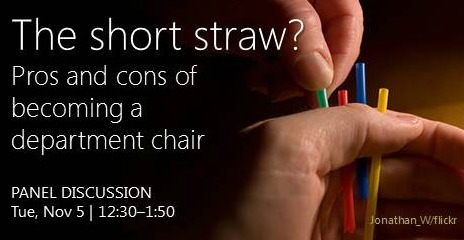
The short straw? The pros and cons of becoming a department chair
PANEL DISCUSSION
November 5, 2013
Facilitated by Jacquelyn Miller
Might your future involve a stint as a department chair or a program director? If so, do you look forward to taking on this role or dread it like the plague? In this frank Q&A discussion, you’ll meet a panel of former and current chairs and directors to discover what these roles entail and how they can contribute to the smooth functioning of your area and the university. Learn about some of the possible pitfalls and hidden pleasures of chairing to help you figure out whether, for you, this really would be the short straw or a rewarding opportunity.
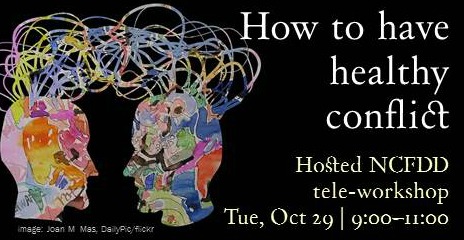
How to have healthy conflict
HOSTED NCFDD TELE-WORKSHOP
October 29, 2013
NCFDD Presenter: Kerry Ann Rockquemore | SU Hosts: David Green & Jacquelyn Miller
Please note: This event is a presented by the National Center for Faculty Development and Diversity (NCFDD). This tele-workshop is accessible on the NCFDD website, under Member Resources. The Center for Faculty Development funds an institutional membership to NCFDD for all SU faculty, graduate students and law students. Click here to find out more about Seattle University's institutional membership to NCFDD, including how to become a member of NCFDD.
Do you often feel drained by departmental drama? Do you feel unclear about how to handle conflicts that arise in your department? Are you unsure when, where, and how to manage conflict? Academics are notoriously conflict avoidant, and the inability to manage conflict can result in negative physical, emotional, and relational consequences for faculty. So why not learn early in your career to master the SKILL of healthy conflict so that you can effectively manage conflicts as they arise and avoid carrying around all of the negative energy, anger, and resentment in your mind and body.
2012-13
Spring 2013
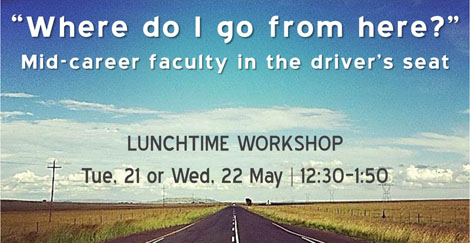
"Where do I go from here?" Mid-career faculty in the driver's seat
LUNCHTIME WORKSHOP
May 21 or 22, 2013
Facilitated by Jacquelyn Miller & David Green
Research tells us that faculty generally experience greater dissatisfaction during the middle years of their careers. Reasons given for this trend include lengthy professional lives; increased workload; an absence of motivating professional goals; diversified faculty appointment types; and the fact that individuals’ mid-career years are often also mid-life years, which in many cases is a time of reflection and reassessment.
Which areas of your life will give you greatest satisfaction at this stage? Will you want to work on your teaching practices, for instance, or engage your disciplinary peers through professional service to your field? Or maybe it’s community service or academic leadership roles that interest you. How can you take control of your direction so that you feel you’re on the right road?
In this workshop, you’ll have an opportunity to articulate some of your professional and personal goals for the next five years and to create an action plan that is sensible and sustainable. We’ll also consider how department chairs, program directors, and faculty serving on personnel committees can support mid-career faculty in achieving their goals.
Request a consultation on this topic.
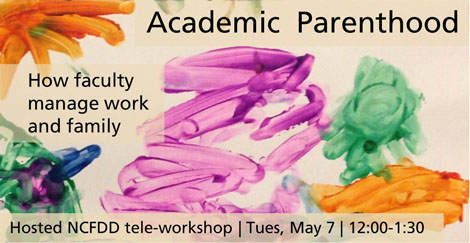
Academic parenthood: How faculty manage work and family*
HOSTED NCFDD TELE-WORKSHOP
May 7, 2013
NCFDD presenters: Kelly Ward & Lisa Wolf-Wendel
SU Host: David Green
Please note: This event is a presented by the National Center for Faculty Development and Diversity (NCFDD). This tele-workshop is accessible on the NCFDD website, under Member Resources. The Center for Faculty Development funds an institutional membership to NCFDD for all SU faculty, graduate students and law students. Click here to find out more about Seattle University's institutional membership to NCFDD, including how to become a member of NCFDD.
This workshop is based on the facilitators’ longitudinal study of how women faculty on the tenure track manage work and family in their early careers (pre-tenure) when their children are young (under the age of five), and then again in mid-career (post-tenure) when their children are older. The women studied work in a range of institutional settings—research universities, comprehensive universities, liberal arts colleges, and community colleges—and in a variety of disciplines, including the sciences, the humanities, and the social sciences.
In this tele-workshop, the facilitators will provide insights and policy recommendations that support faculty with children and offer mechanisms for problem-solving at personal, departmental, institutional, and national levels.
*NCFDD’s title is “Academic Motherhood” based on the book of the same title by the facilitators; however, NCFDD assures us that the workshop is relevant for academic fathers as well.

Every summer needs a plan
HOSTED NCFDD TELE-WORKSHOP
May 1, 2013
NCFDD presenter: Kerry Ann Rockquemore
SU Host: Jacquelyn Miller
Please note: This event is a presented by the National Center for Faculty Development and Diversity (NCFDD). This tele-workshop is accessible on the NCFDD website, under Member Resources. The Center for Faculty Development funds an institutional membership to NCFDD for all SU faculty, graduate students and law students. Click here to find out more about Seattle University's institutional membership to NCFDD, including how to become a member of NCFDD.
Do you often start the summer with high hopes for your writing projects, but end disappointed by your actual productivity? Do you desperately want (or need) to write a lot this summer? Do you want to figure out how to be more productive AND enjoy your life this summer?
Then join us for this hands-on planning workshop in which you’ll identify your personal and professional goals for the summer, create a strategic plan to accomplish them, and identify the types of community, support, and accountability you need to make this your most productive and balanced summer ever.
Please note: To make the most of this workshop, bring your calendar with you.
Winter 2013
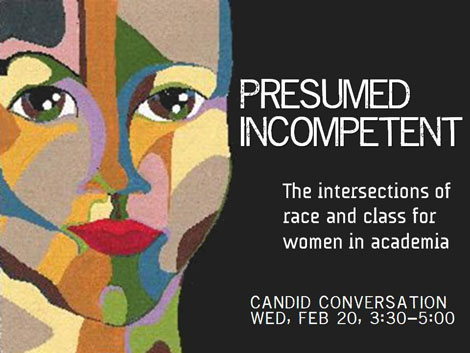
Presumed incompetent: The intersection of race and class for women in academia
CANDID CONVERSATION
February 20, 2013
Facilitated by Gabriella Gutiérrez y Muhs, Associate Professor, Modern Languages & Cultures and Women & Gender Studies; and Carmen Gonzalez, Professor, School of Law
Seattle University has a higher than average proportion of students from underrepresented groups, yet its faculty profile doesn't yet reflect that diversity. At many institutions, a gap exists between the "ideal" of faculty diversity and the actual experience of underrepresented faculty. Using the example of women of color as an entrée into the topic, this Candid Conversation creates space for an open dialogue about the daunting challenges faced by underrepresented faculty as they navigate the often hostile terrain of higher education.
Editors of Presumed Incompetent: The Intersections of Race and Class for Women in Academia Gabriella Gutiérrez y Muhs, PhD, and Carmen Gonzalez, JD, will facilitate the conversation. We'll discuss some of the concrete strategies offered in the book to help junior faculty thrive in academia and will hear some of the problems that they encountered with editing a book about difficult issues of the intersections of gender, race, and social class within the Academy.
Fall 2012
No professional development events this quarter.
More information coming soon; check back again later.
